#Soldier is a prime example of this. He will try to get a brand of cereal banned for being anti american propaganda
Explore tagged Tumblr posts
Text
Something I love about the characterisation in tf2 is how almost none of the characters do things because they think it's funny, (other than maybe scout). Just completely committed to the bit.
#Theyre obviously still silly#Goofy goobers if you will#But it'll be completely sincere most of the time#Soldier is a prime example of this. He will try to get a brand of cereal banned for being anti american propaganda#And it'll have been 100% serious buisness#Its percect comedic writing and probably why tf2s comedy is so well done#It doesnt spoonfeed it to you#And in the moments where the mercs are goofing off it isnt always meant to make you laugh as much as show their character#Like in expiration date and the meet the spy vids scout makes jokes at spy's expense but not necessarily to make you laugh#Mostly to show that he doesn't take stuff seriously#The writing for this game is brilliant. With characters so complex yet consistent who are written to be unpredictable#Which makes it hard to replicate. But that's also part of the beauty i suppose#I like the funny old man game :)#Glad the dev team is kinda reviving itself by the looks of it#Tf2#Team fortress#Team fortress 2
13 notes
·
View notes
Text
Why I still recommend Final Fantasy 13
As we all know FF13 was the black sheep of the Final Fantasy games. It had a different fighting system and was strangely more linear than its previously better-known games. However, this was more of the gamer's issue as when FFX and FFX-2 came out a lot of people said there were too many missable items and didn't like having to search everywhere for items or hidden scenes.
Years later Square Enix responded made FF13, and what were the gamer's responses. "We don't like it"
Now with FF games like 15 and 16 which are open-world people praise both for their own styles and stories. I'll be honest 15 was okay, the fact though that DLC kept coming out for the game and the story was lacking a bit for some of the characters, made me kinda miss the simpler ones. Now as for 16, I have not played it yet but I will differ from those who have that opinion.
As for FF14 which is an mmo its far different from the others but you get the opportunity to play with friends and actually go at your own pace.
But with all the games that have come out of the Final Fantasy franchise, I can say that everyone in the FF13 trilogy I remember and they have good characters. which I wanna talk a little bit about. (FYI this is where the spoilers now will appear. you've been warned. Also Very long Post just fyi)
Let's start off with of course the Queen

Lightning aka Claire Farron. A Cocoon soldier who stays distant and strong for her sister after losing their parents, after years of becoming strong to protect her only family. She faces losing her sister Serah to become an eternal crystal or the insidious cieth. After everything she faces, they save Cocoon. She only had a moment with everyone and realized that she and Serah could have a chance at actual peace. She gets taken away from the dream to save a goddess and forced into the duty of a protector. And even after that, she stays strong, guiding Serah along the way to help her fight Caius even though everyone thinks she is dead.
But then Etro dies and she fails in her mission, overtaken with grief by not only the goddess dying and failing...her sister. The only person in her life that kept her from losing all of her hope. Dies. Everything she did in the first game...gone. And then after sleeping for 500 years she's given the chance by God to save Serah and the World. A sort of redemption if you think about it.

Snow falls kinda under the same category but from a small different point of view. Snow was deeply in love with Serah and in the first game was trying to save her and Cocoon as well. Even though Etro caused Lightning to disappear he still tries to hold the fort and he got to have his peace with her afterward. But sadly he only gets to have that life for a year before FF13-2 starts, the love of his life goes on a mission he cant join. All the while he does his damn hardest to help Fnag and Vanille's pillar holding up Cocoon. And in doing so, willingly takes on the I'cie curse even after getting his brand removed in the first game. Once again everything in the first game almost not worth it (This is a reoccuring theme.), if not for Serah coming back. But then she dies and he can't fix, and he couldn't be there for her. His promise to be her hero is shattered. For 500 years he cares for the people and everyday misses Serah, blaming himself everyday for what happened and not keeping her safe. HE is basically the prime example of a suffering hero.

Hope is kinda the odd one out, he is only a child, in the wrong place wrong time situation with his mother and him being brought into the Bodium purge. He loses his mother and goes on a verge to get revenge on Snow who he held responsible. But in a short amount of time when he stays with Lightning he learns from her that his innocent world is over, he is a fugitive, a I'cie and alone. But after she tells him about her past and facing the worst that life can offer, you grow from it. He even goes from taking up the rear to guarding her in the front, his fear fades throughout the entire game and he learns to grow up to be a fine young man in FF13-2. He even makes a new world for humanity in case Cocoon were to fall. He was their Hope, their hope for a world rid of monsters.
But in LR, we see that he has disappeared possibly having been kidnapped, remolded / torture back into young hope and made to spy on Lightning to fulfill her Savior duties. And can't speak his true thoughts, he is a fake. Even Lightning realizes though that the next world needs him, he even sees his parents who were long since dead he realizes that he gets the chance to have a proper life, Hope is the Symbol for all to have Hope and to Believe.
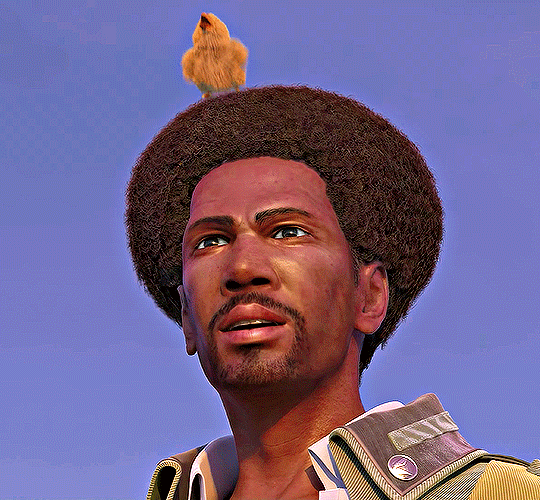
Sazh suffers from the possibility of outliving his son. He is a widow and the only family left for him is his son who is quite young, and unfortunately at a young age his son is branded by the I'cie. Dajh basically only has a short time to be a child, until he either turns to crystal or a monster. Sazh loses him after being taken and fights to save him, but all the while he slowly loses his faith. He lost his wife and now his son, every moment he questions what they are doing. Only the prospect of saving Dajh keeps him going as well as his Chocobo chick. After saving Dajh though they get to live a normal life until the end of FF-13-2
For almost 500 years Dajh is in a coma like state and Sazh once again loses his faith thinking the only way Dajh can be saved is by doing it himself. When Lightning comes around though and helps reawaken Dajh, well so does Sazh. He regains his faith and even comes to the final moment of the game with everyone ready to welcome the new world with his son. He's the family man, kinda similar to Barret from FF7. But he is also the representation of a man going down the harder path to help those he loves.


Fang and Vanille fall under the same issue, Born to Gran Pulse and lived and had to sleep in immortal crystal to awake and find their home in ruins. The life they lived all gone and the only thing left of who they were is each other. Fang even takes on the torture to awaken Ragnarök. Doomed to bring about the end of Cocoon. But then their fate is changed and they were able to save instead of destroy.
In FF13-2 they are able to help Serah in her mission but they knew what she might have to face and with LR, they were torn about by both a sense of duty and a want to protect the other. Lightning finds out that they each wanted to help the other, however Vanille want for redemption at the cost of her own life to save the lost dead souls, thats what splits Fang away because she refuses to lose Vanille.
They can represent both family and lovers. One will not go on without the other, no matter what.

And now for the princess, (not literally) but still i love Serah. Anyhow, Serah is the embodiment of Love, Faith and Hope. She goes through everything, turned into an enemy of Cocoon, turned into crystal, given the gift and/or curse of Etro, lost her fiancé to time travel for a bit, dies, has her soul taken out of Lightning where she was safe and then used as a bargaining chip by God to make Lightning keep to her role. But through everything, she still believed her sister and fiancé would save her, that she would be able to live her own life and teach children.
This girl fought and stepped up to every challenge but unlike lightning she shows her emotions, all the pain of failure and loss is understanding and that makes her into a connection for the player.



Okay so for times sake Im putting these three in one group since their stories are enveloped all together.
They are the last humans of a future timeline where the events of ff13 did not go well, Noel is basically the last human that ever existed and under Caius teaching and wing both of them protect Yeul who is a priestess of Etro forced to live again and again only to die after seeing the last of her visions into the future. Caius who knows some of the past Yeuls loved him, the last one loves Noel and he tries everything to save her. So whats his plan. Oh yeah, kill the goddess Etro to stop all natural death and the visions. Hence stopping Yeul from dying.
Noel guided by Lightning has to aid Serah to stop Caius and save the Future. After everything though, he fails by killing Caius not realizing that with his death he actually killed Etro (long story) watches Yeul die and Serah die. and after all of that is forced to watch the world and timeline for 500 years fall and crumble into a shell of the former grandeur that it was.
Yeul after dying, helps Lighting but in her now spirit like self she reveals a terrible truth that while Caius is alive no good will come. But while the Yeul we know wants Caius dead. (along with hundreds of other past selves.) Some of them also want Caius to live causing him to never truly die. To quote Caius "Even if one Yeul desires my salvation, another demands my rebirth."
Yeul is the symbol of mourning and regret but also wisdom in knowing that not all things will be bad, and that good things do eventually happen.
Caius is the symbol of inability to accept what happens and the cruelty of death. His immortality while at first would seem like a gift is a curse, he watching all those he love die and when the chance to die comes, it fails. He is stuck in an infinite life that is now out of his control.
Noel is the symbol of failure but also standing back up taking the next steps forward. After everything, with just the promise of seeing the person he loves again, even if only one more time. Gives him the strength to move on.
-
So if any of you can identify with even one of these characters I highly recommend you play the game. Trust me, me writing all of this down doesn't do the games justice. Its a lovely styled game that after some time you will get used to and its really not that hard of gameplay, watch a few videos and you will get the hang of it.
So anyways im not sure if i convinced any of you but enjoy your days and i send you off with a smiling lighting because its so rare and you all deserve one.

7 notes
·
View notes
Text
ltdan2288 asked: As a fellow veteran of the Afghan Campaign, might I ask if you have any thoughts about the imminent end of Allied air support & combat-advisory operations over there? The fall of large swaths of the country to the Taliban is already underway, which can only be seen as an unspeakable tragedy for the people there. From a strategic perspective, there’s no reason to believe that we won’t have to return in some capacity of AQ or ISIS reestablish themselves under Taliban sponsorship. At the same time, it’s not clear to me that our presence did anything beyond kick the can down the road and delay this inevitable outcome. As someone with such a deep knowledge of military history, I’m curious if you have a different perspective.
I have been avoiding answering this post for a while now because Afghanistan dredges up so many conflicting emotions inside me. I wrestle with so many memories of my time there with my regiment to fight in a war that we all didn’t really understand what we were fighting for.
Deep breath.
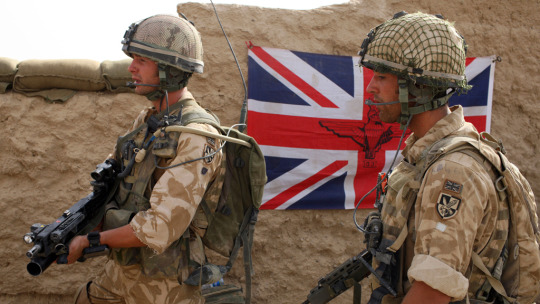
Almost two decades of conflict in Afghanistan has cost British taxpayers £22.2billion, or $31.3 billion according to UK government figures. As British troops prepare to leave Afghanistan, the 20-year deployment bill could be even higher. As of May 2021, the total cost of Operation Herrick (codename for the deployment of British soldiers to Helmand province) is £22.2billion. There were 457 fatalities on, or subsequently due to, Op Herrick. Of which 403 were due to hostile action. During the operation between January 1, 2006 and November 30, 2014, there were 10,382 British service personnel casualties. Of these 5,705 were injuries and the remainder being illness or disease. The UK’s remaining 750 troops in Afghanistan, involved in training local forces, started exiting the war-devastated country in May. Most of them will return home by the end of July.
They, like every one of us who went to fight in Afghanistan, will ask the same questions, ‘Why did we go there?’ ‘What was the real purpose of the mission?’ ‘Was it worth it?’
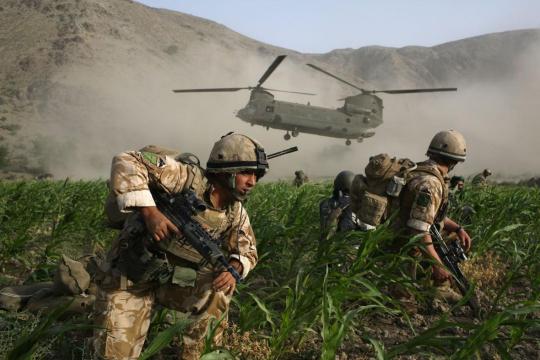
Both my older brothers fought there with special distinction and I later fought there too. I have very mixed emotions when I think about my time in Afghanistan. For all its faults and tortured history, I love that country and love its many ethnic people. I even started to learn Pashtu as I already had a spoken command of Urdu because I had been raised partly in both Pakistan and India and it’s where many Afghan refugees living in the UN camps for over a generation had learned Urdu too.
It’s not just that my family has history in Afghanistan going back to the days of the East India Company but I had a sincere respect for its culture and history as one of the central hot spots for great civilisational achievements, but also as a stubborn and unruly country who proudly defied the Great Powers to bend the knee and turned it into a ‘graveyard of empires’. Most of all I think of the friendships I made there and how my perspective on life changed as a consequence of knowing such resilience and fortitude in the face of catastrophe and death.
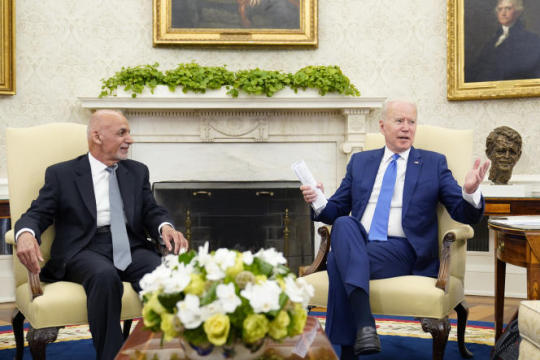
I’m sure like everyone else I wasn’t too surprised by President Biden’s announcement that he was announcing the imminent withdrawal of all American troops in Afghanistan. He wanted to pivot to something else when asked about it. “I want to talk about happy things, man!” He said. Who could begrudge him given that America has been at war in Afghanistan for a better part of 20 years and has nothing to really show for it. Except of course the loss of its brave service men and women as well as the death of thousands of Afghan civilians. It spent more than $2 trillion to kill Osama bin Laden, the architect behind 9/11 attacks and failed to convincingly snuff out both murderous terror groups, Al Qaeda and ISIS.
When the Secretary General of Nato announced back in April 2021 all alliance troops were to be withdrawn from Afghanistan, it was made to look like a nice, clean, enunciation of a joint decision. The end date was set for 11 September, 2021 - 20 years after the terrorist attacks on New York and Washington - and it was in line with the oft-repeated alliance maxim: we went in together; we will come out together. Except that, on closer examination, it was all rather messier.
This was partly because the withdrawal from Afghanistan had actually been Trump’s policy, so here was Joe Biden, the anti-Trump, co-opting a policy from his predecessor (a policy Trump had been so keen on that he tried to accelerate the withdrawal after he lost the election). Biden then tried to detach it from Trump by slowing down the withdrawal date a little and expressing it in terms more comprehensible to the Washington establishment and to US allies.
Where Trump had essentially done a deal with the Taliban and set a withdrawal date of 1 May, Biden left the Taliban out of it and invoked the totemic date of 9/11. This does not mean, of course, that the withdrawal will not be completed a good deal sooner - once you announce a withdrawal, you might as well get on with it.
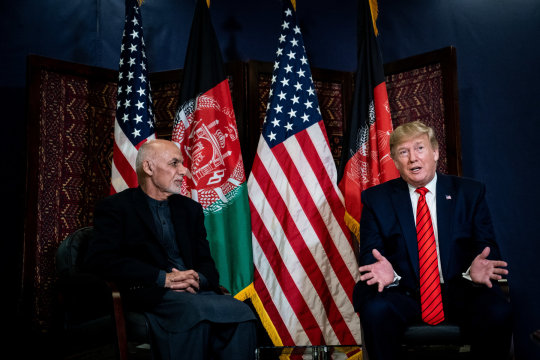
In fact, Biden had to make a decision one way or another, given the rapid approach of Trump’s 1 May withdrawal date. And, whether it came from Washington or Nato, it was pretty low key for an announcement that a 20-year military involvement that had cost 4,000 allied lives was ending. Indeed, many people beyond Washington and Afghanistan might not quite have registered the news, given the considerable noises from Nato’s simultaneous dire warnings about Russia massing troops on the Ukrainian border, the death of the Duke of Edinburgh in the UK, and the Covid pandemic everywhere.
And distractions were needed not just because Biden was implementing a Trump policy. It was also because he was ordering an unconditional withdrawal – which he justified, correctly, by saying that setting preconditions would mean that the troops could be there forever. It was a risk Biden knew all too well, given that Barack Obama had been persuaded by General David Petraeus – against his election pledges and his better judgement – that what Obama really wanted was not a withdrawal, but a ‘surge’ with conditions attached before a withdrawal could take place.
Distractions were also useful for London, where the timing was hardly ideal. Imagine you were in government in London, you had watched the dismal failure of the UK’s Herrick operations in Helmand Province between 2006 and 2014, you knew that your armed forces had suffered 456 deaths in 20 years, with many more severely injured, but you had hung on in there.
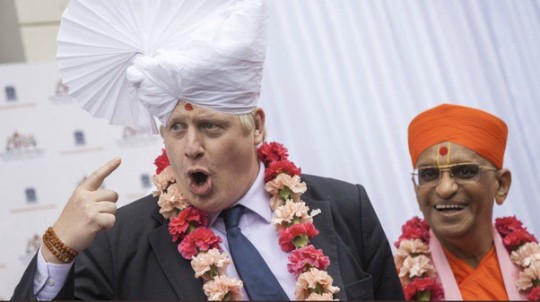
Your government had also just released a blueprint for foreign and security policy, setting future priorities even further from home, in the Indo-Pacific, and your Prime Minister was about to make a high-profile visit to India as part of his post-Brexit ‘Global Britain’ branding . In those circumstances, an announcement that the US had decided to leave Afghanistan, giving you no choice but to follow, was almost exactly what you did not need. Rather than showing the UK as a powerful, autonomous military actor and a valued ally, it showed the exact opposite.
It also reminded an unhappy British public about a costly conflict it had rather forgotten. And those who did more than bother to remember - like the families who lost loved ones on the battlefield - and who over the years have blamed successive governments for moving the goalposts and lacking an exit strategy (all true too).
All of which might explain why the UK’s Foreign and Defence Secretaries followed the US example by changing the subject to the iniquities of Russia and China, rather than issuing a joyous pronouncement to the effect of: hooray and thank goodness, our boys and girls are coming home.
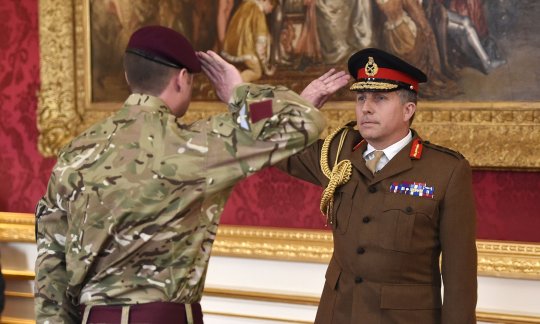
The UK’s Chief of Defence Staff, General Sir Nick Carter gave a subdued, unenthusiastic response to Biden’s announcement. I cannot remember such open acknowledgement of UK-US military policy friction in recent decades - or such an abject admission by the UK of its defence dependence on the US. What Carter said was that the unconditional withdrawal was ‘not a decision we had hoped for, but we obviously respect it and it is clearly an acknowledgement of an evolving US strategic posture’. In other words, the UK had opposed Biden’s decision – or would have done, if asked (which is not clear). Also, that it was Washington’s ‘strategic posture’ that had ‘evolved’, not the UK’s. He suggested there was a real danger that progress made could be lost and that there could be a return to civil war, with the Taliban maybe returning to power - again, all true.
Given that the UK officially has only 750 troops in Afghanistan at present, and most of them are there in a training capacity, to dissent from the US position so openly would be considered decidedly rude in the Ministry of Defence. Perhaps to that end, General Carter played the dutiful soldier and had to - through gritted teeth - put a positive gloss on Afghanistan’s future, insisting that the objective in going into Afghanistan, ‘to prevent international terrorism emerging from the country’, had been achieved which was ‘great tribute to the work of British forces and their allies’.
He also said that Afghan forces were ‘much better trained than one might imagine’ and that the Taliban ‘is not the organisation it once was’, so that ‘a scenario could play out that is actually not quite as bad as perhaps some of the naysayers are predicting.’ Blah blah blah. He’s wrong, and I think he knows it but only in the sanctity of his gentlemen’s club might he truly admit it.
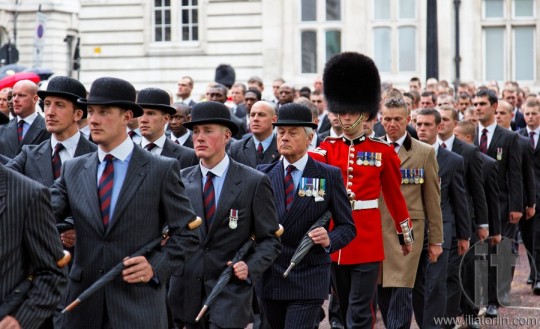
I know he’s wrong because the chatter amongst ex-veterans I know is that we’ve made a balls up of Afghanistan yet again - by ‘again’ I mean from the past 200 years of us Brits trying to bring order to chaos in Afghanistan and getting burned for our troubles.
Both my father and my older siblings tell me what their friends and ex-service peers (some very senior indeed) have been nattering over a drink at their gentlemen clubs where ex-veterans haunt the club bar. Many just shake their heads in sighed resignation before burying themselves in the Times crossword or drowning their sorrows with a beer or two at how lock in step we’ve become to the Americans at a time when the British army is re-branding itself as a more independent nimble hi-tech impact army (the creation of a new ranger regiment being but one example).
Still if President Biden wanted to tie a neat bow on U.S. involvement in Afghanistan - saying, as he had, that the logic for the war ended once al-Qaida was gutted and Osama bin Laden killed - then it reveals a stunning lack of introspection about the United States’ role in the conflict that will continue in Afghanistan long after the last American and British troops leave.
Less than three months after President Joe Biden declared that the last American troops would be out of Afghanistan by September 11th, the withdrawal is nearly complete. The departure from Bagram air base, an hour’s drive north of the capital, Kabul, in effect marked the end of America’s 20-year war. But that does not mean the end of the war in Afghanistan. If anything, it is only going to get worse.
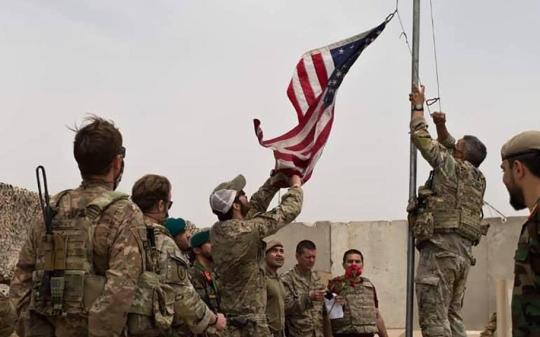
It is true that the president had no good choice on Afghanistan, and that he inherited a bad deal from his predecessor. There are never good choices when it comes to Afghanistan: only bloody trade offs.
But in announcing an unconditional withdrawal, he made the situation worse by throwing out the minimal conditions U.S. Special Envoy Zalmay Khalilzad had negotiated under the Trump administration. U.S. envoy Zalmay Khalilzad has delivered to the Afghan government and Taliban a draft Afghanistan Peace Agreement - the central idea of which is replacing the elected Afghan government with a so-called transitional one that would include the Taliban and then negotiate among its members the future permanent system of government. Crucial blank spaces in the draft include the exact share of power for each of the warring sides and which side would control security institutions.
The refrain now from the Biden administration is that the United States is not abandoning Afghanistan, that it will aim to do right by Afghan women and girls, and that it will try to nudge the Taliban and Kabul toward a peace deal using a diplomatic tool kit.
But the narrative ignores much of the reality on the ground. It also ignores history.
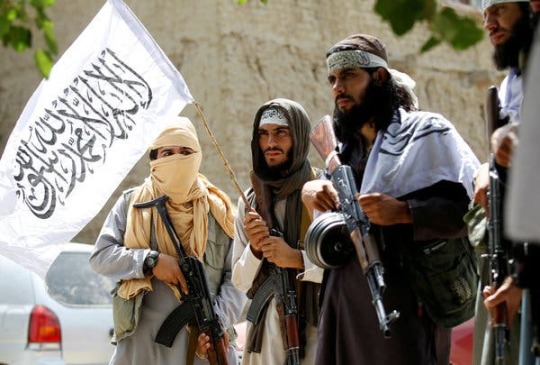
In theory, the Taliban and the American-backed government had been negotiating a peace accord, whereby the insurgents lay down their arms and participate instead in a redesigned political system. In the best-case scenario, strong American support for the government, both financial and military (in the form of continuing air strikes on the Taliban), coupled with immense pressure on the insurgents’ friends, such as Pakistan, might succeed in producing some form of power-sharing agreement.
But even if that were to happen - and the chances are low - it would be a depressing spectacle. The Taliban would insist on moving backwards in the direction of the brutal theocracy they imposed during their previous stint in power, when they confined women to their homes, stopped girls from going to school and meted out harsh punishments for sins such as wearing the wrong clothes or listening to the wrong music.
More likely than any deal, however, is that the Taliban try to use their victories on the battlefield to topple the government by force. They have already overrun much of the countryside, with government units mostly restricted to cities and towns. Demoralised government troops are abandoning their posts. In the first week of July 2021, over 1,000 of them fled from the north-eastern province of Badakhshan to neighbouring Tajikistan. The Taliban have not yet managed to capture and hold any cities, and may lack the manpower to do so in lots of places at once. They may prefer to throttle the government slowly rather than attack it head on. But the momentum is clearly on their side.
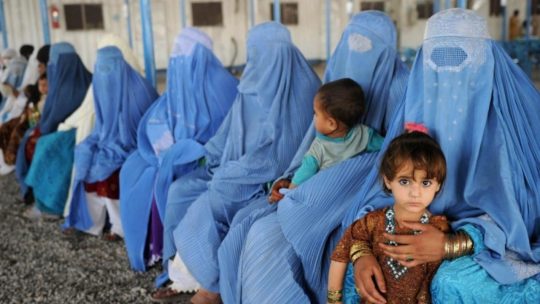
America and its NATO allies have spent billions of dollars training and equipping Afghan security forces in the hope that they would one day be able to stand alone. Instead, they started buckling even before America left. Many districts are being taken not by force, but are simply handed over. Soldiers and policemen have surrendered in droves, leaving piles of American-purchased arms and ammunition and fleets of vehicles. Even as the last American troops were leaving Bagram over the weekend of July 3rd, more than 1,000 Afghan soldiers were busy fleeing across the border into neighbouring Tajikistan as they sought to escape a Taliban assault.
As the outlook for the army and for civilians looks increasingly desperate, so do the measures proposed by the government. Ashraf Ghani, the president, is trying to mobilise militias to shore up the flimsy army. He has turned for help to figures such as Atta Mohammad Noor, who rose to power as an anti-Soviet and anti-Taliban commander and is now a potentate and businessman in Balkh province. “No matter what, we will defend our cities and the dignity of our people,” said Mr Noor in his gilded reception hall in Mazar-i-Sharif, the key to holding the north (sounds like Game of Thrones). The thinking is that such a mobilisation would be a temporary measure to give the army breathing space and allow it to regroup and the new forces would co-ordinate with government troops to push back hard on the Taliban.
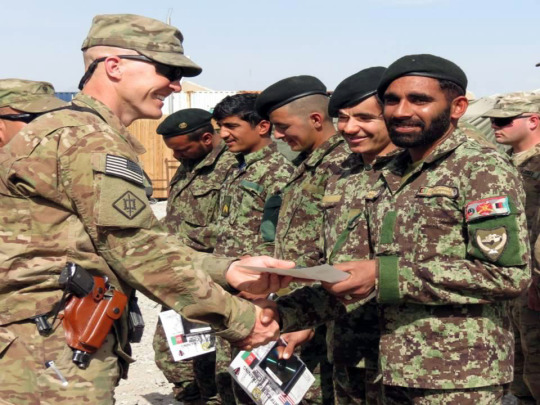
However this is Afghanistan. The prospect of unleashing warlords’ private armies fills many Afghans with dread, reminding them of the anarchy of the 1990s. Such militias, raised along ethnic lines, tended to turn on each other and the general population.
With America gone and Afghan forces melting away, the Taliban fancy their prospects. They show little sign of engaging in serious negotiations with Mr Ghani’s administration. Yet they control no major towns or cities. Sewing up the countryside puts pressure on the urban centres, but the Taliban may be in no hurry to force the issue. They generally lack heavy weapons. They may also lack the numbers to take a city against sustained resistance. On July 7th they failed to capture Qala-e-Naw, a small town. Besides, controlling a city would bring fresh headaches. They are not good at providing government services.
Perhaps the Taliban have learned their history lesson and might refrain from attacking Kabul this time around. Their best course may be to tighten the screws and wait for the government to buckle. American predictions of its fate are getting gloomier. Intelligence agencies think Mr Ghani’s government could collapse within six months, according to the Wall Street Journal. So clearly the momentum is on the side of the Taliban and they just need to chip away at Ghani’s forces one district after another until the inevitable and hateful surrender of the central Afghan government to their demands.
At the very least, the civil war is likely to intensify, as the Taliban press their advantage and the government fights for its life. Other countries - China, India, Iran, Russia and Pakistan - will seek to fill the vacuum left by America. Some will funnel money and weapons to friendly warlords. The result will be yet more bloodshed and destruction, in a country that has suffered constant warfare for more than 40 years. Those who worry about possible reprisals against the locals who worked as translators for the Americans are missing the big picture: America, Britain and other allies are abandoning an entire country of almost 40m people to a grisly fate.

Nothing exemplifies - at least in Afghan eyes - of all that has gone wrong with American involvement in Afghanistan than in the manner of their leaving.
The U.S. left Afghanistan's Bagram Airfield after nearly 20 years by shutting off the electricity and slipping away in the night without notifying the base's new Afghan commander, who discovered the Americans' departure more than two hours after they left in the middle of the night without raising any alarms.
They left behind 3.5 million items, including tens of thousands of bottles of water, energy drinks and military MRE's (Meals Ready to Eat ration packs to the uninitiated). Thousands of civilian vehicles were left, many without keys to start them, and hundreds of armoured vehicles. The Americans also left small weapons and ammunition, but the departing US troops took heavy weapons with them. Ammunition for weapons not left for the Afghan military was blown up.
Now that is some feat considering the logistics of this mass exodus without drawing any attention. You have obviously been to Bagram and so you will know just how big and sprawling it is. Bagram Airfield is the size of a small city, roadways weaving through barracks and past hangar-like buildings. There are two runways and more than 100 parking spots for fighter jets known as revetments. One of the two runways is 12,000 feet long and was built in 2006. There's a passenger lounge, a 50-bed hospital and giant hangar-size tents filled with furniture. And all those shops to remind Americans of home from familiar fast food restaurants and hairdressers and massage parlours to buying clothing and jewellery and buying a Harley Davidson motorbike (or so I’ve been told).
I’m guessing that the Afghans were certainly outside of the wire and probably had not been inside Bagram Airfield for months. So from the outset they would not have had any reason to think anything was going on until the generators probably ran out of fuel and it started to go a little too quiet. The inner gate was probably discretely left unlocked and when the US stopped answering the radio/phone and then they probably investigated.
Before the Afghan army could take control of the airfield about an hour's drive from the Afghan capital, Kabul, it was invaded by a small army of looters, who ransacked barrack after barrack and rummaged through giant storage tents before being evicted, according to Afghan troops. Afghan military leaders insist the Afghan National Security and Defense Force could hold on to the heavily fortified base despite a string of Taliban wins on the battlefield. The airfield includes a prison with about 5,000 prisoners, many of them allegedly Taliban members.
I’m pretty sure some bright spark in the US Pentagon public affairs dept convinced his military superiors that it was important to avoid the optics of Americans leaving in the same way they did in Vietnam in case it depresses the American public and the US military. Instead it demoralised its allies, the Afghan national army who are now the only line of defence against the Taliban. In one night, they lost all the goodwill of 20 years by leaving the way they did, in the night, without telling the Afghan soldiers who were outside patrolling the area. The manner in which the Americans left Bagram air base amounts to a resounding vote of no confidence in Afghanistan’s future. It just looks bad.
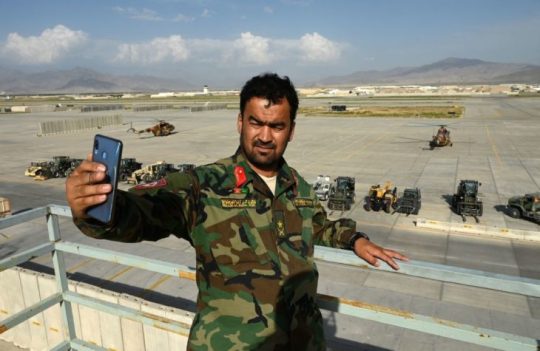
The U.S. choice came with costs attached to each decision. With staying, the cost was potential U.S. troop casualties and a fear that things would not change on the ground. With leaving comes the cost of a deeper conflict in Afghanistan and a backsliding of progress made there over the past two decades. In many ways, the costs of staying seem shorter-term and borne by the United States, while the costs of leaving will be predominantly borne by Afghans over a longer time horizon. Yet, even if those costs seem remote now, history tells us that they will be blamed on the United States.
Biden perhaps reflective of history of Americans getting into quagmires abroad didn’t want to be seen exerting time and energy for a losing cause. His decision also reflects his administration’s foreign policy for the American middle-class paradigm, which focuses on domestic considerations over international ones (and is this so different from Trump’s “America First”? No, it is not). The irony, though, is that the American middle class largely doesn’t care about Afghanistan - their ambivalence gave way to support for this decision once it was announced, but it wouldn’t be hard to visualise the public approving of a scenario that kept a couple thousand troops there for a while longer.
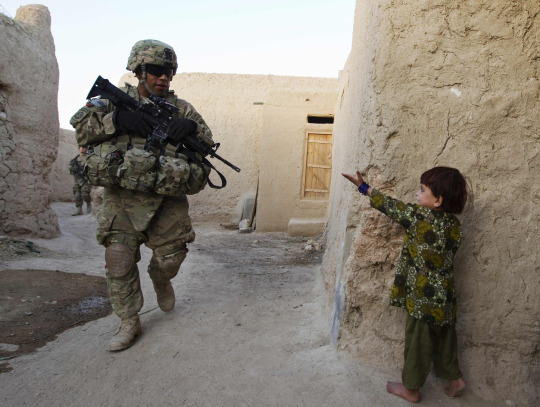
What’s perhaps most disturbing is the narrative the president has presented along with the rationale for withdrawal: that America went to Afghanistan to defeat al-Qaida after 9/11, that mission creep led America to stay on too long and, therefore, it is time to get out. This takes an incomplete view of U.S. agency in the war in Afghanistan. The narrative implies that the civil conflict in Afghanistan today did not originate with America - that this more than 40-year war began with the Soviet invasion of Afghanistan in 1979, preceded America’s interference in Afghanistan, and will follow our departure.
The fact of the matter is that, by beginning the campaign in Afghanistan in 2001 and overthrowing the Taliban, who were then engaged in their draconian rule, and installing a new government, we western allies began a new phase of the Afghan conflict — one that pitted the Kabul government and the United States/Britain/NATO against the Taliban insurgency. The Afghan people did not have a say in the matter. That we allied powers are leaving Afghan women, children, and youth better off in many ways after 20 years is due to us, and we should be proud of that. But that we are leaving them mired in a bloody conflict is also due to us, because we could not hold off the Taliban insurgency, and we must all reckon publicly with that.
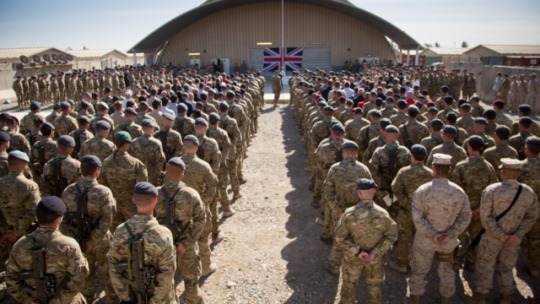
I have to ask myself why did we fail?
I’m only speaking about us Brits now as I’m sure you have your own thoughts as an ex-Marine officer of what you thought of the American military effort. Yes, I’m copping out of really bashing the yanks because first, I have too much respect for those fantastic American service men and women I did have the privilege to fight alongside with; and second, we Brits have nothing to crow about as we fucked up in lots of ways too, and to make things worse, we should have known better given our imperial history with Afghanistan.
The seeds of our failure in Afghanistan lies in not learning from history. We didn’t have a mission that was properly defined nor did we have a strategy that was clear, coherent, and easily communicated to both its fighting men and women as well as to the British public.
Were we there to get our hands bloody and to root out and destroy extreme Islamist terrorists or were we there to indulge in state building out of some idealistic notions of liberal humanitarianism? This question was at heart of our failure within our government and also within the British army as well as our relations with America and our NATO allies and finally the Afghans themselves.
Although never colonised in the same manner as other central and south Asian countries, the modern Afghan state is very much a creation borne out of great power rivalry. A land occupied by a number of different ethnic, linguistic and religious groups, it is a country whose borders were defined by, and whose sense of national identity was forged in response to western great power competition. Its geopolitical position - landlocked, mountainous, and surrounded by past great powers and present regional rivals - lends Afghanistan a dual role of geographic obscurity and great strategic significance, and has as such frequently been treated as little more than a buffer state between empires and a proxy of local powers. Its shared historical border with Russia and British India made it an object of imperial intrigue and, by consequence, has been subject to five European military interventions in the last 175 years.
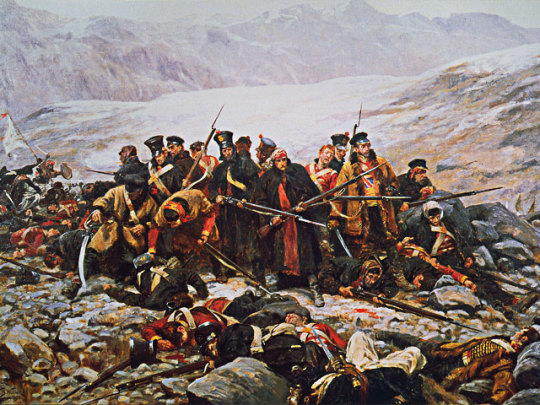
The first three interventions of these occurred during the era of ‘the Great Game’ in the nineteenth and early twentieth centuries, in which Britain and Russia (latterly the Soviet Union) competed for influence and control over Afghan politics in order to protect their respective imperial holdings in India and central Asia.
The fourth and fifth interventions, ranging from the late 1970s to the present day, similarly involved attempts by Soviets and then by an American-led international coalition to remove political leaders acting against their interests and to protect their favoured candidates.
The unifying feature of all these conflicts was the idea of Afghanistan as the site of potential threats to the interests and security of more powerful states.
Britain’s legacy in Afghanistan in particular set the tone for the country’s historical pattern of conflict and political contestation, fuelling both the intermittent emergence of Afghan national consciousness and a fractious political lineage that saw thirteen amirs in just eighty years. Interventions by the Empire during the Great Game set the conditions for the assassination of ostensibly national leaders by their compatriots (Shah Shuja Durrani in the First war) or their exile by the British (Shere Ali Khan and Ayub Khan in the Second).
Despite the British achieving their aim of protecting India in the second and third conflicts by maintaining Afghanistan as either a pro-British buffer state or as a neutral party, the Afghan narrative tends to emphasise successes such as the massacre of British forces retreating from Kabul to Jalalabad in 1842, the defeat of British and Indian forces at Maiwand in 1880, and the gaining of sovereignty in foreign affairs in 1919.
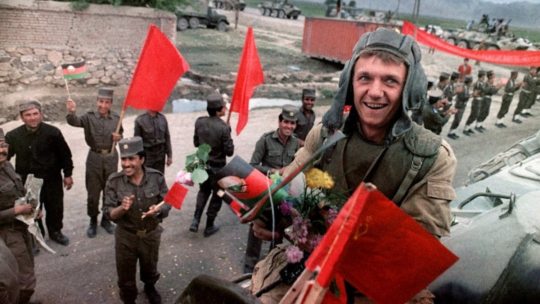
Soviet intervention in the late 1970s and 1980s further buttressed this identity of resistance, and the failure and ultimate overthrow of the Communist-backed Najibullah government, as well as the collapse of the Soviet Union shortly after their drawdown from Afghanistan, led to a sense amongst the victorious mujahidin of the country as the ‘graveyard of empires’.
Afghanistan’s modern history should thus be seen as inextricably linked to the ebbs and flows of great power politics. Each intervention exacerbated extant internal power struggles between rival elite individuals and groups vying for nominal control over the country. Foreign intervention in Afghanistan was met on each occasion with fierce resistance from tribal militias coalesced around religion; as has been remarked upon by one historian of the country, the threat of external domination has been one of the few means of uniting its disparate population around the concept of an Afghan ‘nation’, and in most cases this shared sense of identity cohered around religion, not nationalism.
Indeed, the presence of intervening powers and the development of the Afghan state may be seen as mutually supporting: whilst most Afghan leaders throughout the last two centuries have asserted their sovereignty over the country, the reality has in most circumstances been one of competing tribal chiefs and/or ‘warlords’ rather than a single dominant leader.
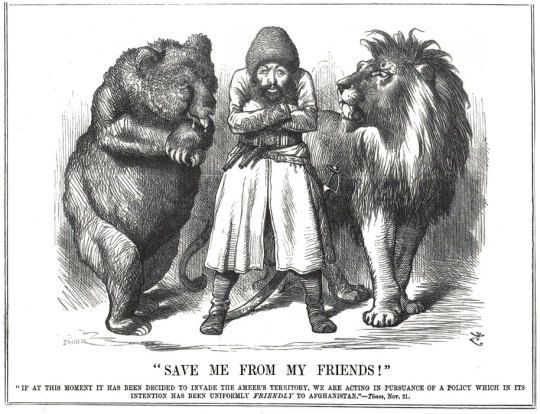
Where leaders have managed to cohere the disparate tribal and ethnic groupings of the country under one banner - most notably under the regime of Dost Mohamed Khan (1826-1839, 1845-1863) – this was due in large part to their diplomatic abilities of compromise and co-optation with Afghanistan’s regional power- brokers. In other cases, such as that of the reign of Abdurrahman (1880- 1901), power was maintained by an unflinching ‘internal imperialism’ and the use of punitive force against rebellious factions.
The challenges of maintaining and projecting centralised power in Afghanistan allow us to see the relationship of its leaders with world or regional powers in the last two centuries as one of mutual exploitation. Throughout the Great Game and the Cold War, whilst the British/Americans and Russians/Soviets would use threats and bribes (and occasionally force) to compel Afghan rulers to comply with their geopolitical needs, Afghan rulers themselves often deftly manipulated those powers to maintain and extend their own power.
The pattern followed by Afghan leaders from the nineteenth century to the present day is remarkably similar in the respect that most have relied upon a rentierist economic model, seeking external aid in order to sustain the cost of security and administration. The plan of modern rulers was to warm Afghanistan with the heat generated by the great power conflicts without getting drawn into them directly. Abdurrahman, for example, used British subsidies to fund his military campaigns against rebellious factions; the Musahiban rulers of the mid-twentieth century used American capital to develop its nascent economic infrastructure and Soviet finance to bolster its armed forces; and, following the overthrow of the last royal leader of Afghanistan, Mohamed Daoud, in 1978, the quasi-communist leadership of Babrak Karmal, Hafizullah Amin, Nur Muhammad Taraki, and Mohammad Najibullah during the late 1970s and 1980s relied in the main on Soviet money and military assistance in its ultimately failed attempt to implement socialist policies and put down the American, Saudi and Pakistani-backed mujahidin.
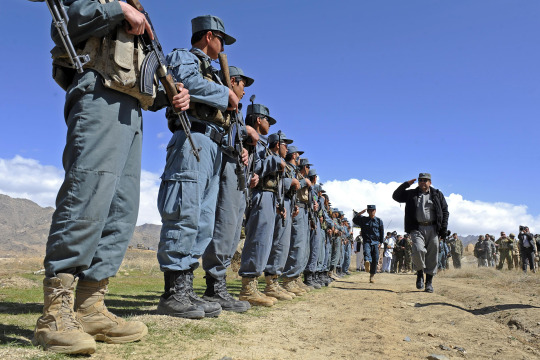
These trends continued into the post-Cold War period in respect to both the Taliban movement (essentially directed and funded by Pakistan), the Northern Alliance (funded largely by former Soviet central Asian states) and the regime of Hamid Karzai (maintained in economic and military terms by the American-led, NATO-operated International Security Assistance Force and the wider international community). In the former cases, occurring in the main in the period of civil war between 1992 and 2001, rentierism was limited to the maintenance of proxy parties and the continuation of conflict.
By contrast, the ISAF mission bore similarities with the Soviet-backed socialist regimes of the 1980s, insofar as it focused huge amounts of capital and military resources on stabilisation and state-building efforts. Both intervening parties made the error of ignoring Afghanistan’s political history and focused their efforts on bolstering the authority of a centralised state, both promoted policies that were deemed ‘universal’ in their application and were, unsurprisingly given such hubris, vulnerable to accusations by Afghan opposition to being alien and imperialistic ideologies, and both expended enormous amounts of blood and treasure in order to sustain the regimes they supported.
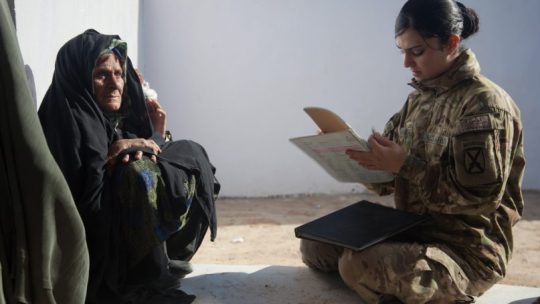
The UK’s struggle to locate a coherent strategy for Afghanistan should, therefore, be seen firstly in the light of the historical problematic of Afghan state-building. This is important in narrative terms because difficulties of defining strategy imply similar challenges in explaining strategy. As with its efforts to ‘think’ strategically, Britain’s ability to explain the strategy(ies) for the war in Afghanistan have been frequently criticised by various commentators. The most strategically debilitating aspect of the Afghan campaign has always been the incoherence of the mission’s purpose; indeed the question ‘‘why are we in Afghanistan?’’ has never really been settled in public consciousness. The international community massively underestimated the difficulties of state-building and greatly overstretched themselves in the commitments made to Afghanistan, and that they did so because ‘strategies’ for Afghanistan rested on assumptions of the universal applicability of liberal state-building.
The international community from the start (meaning from the Bonn Conference of late 2001) fundamentally misunderstood the nature of an Afghan society deeply ravaged by decades of conflict, and failed to foresee the malign effects state-building ventures would have on the country. Specifically, the Bonn Conference, which set out the parameters of the post-invasion Afghan state, implemented a centralised state system onto a state whose experience of such was limited, and where the success of such a system in extending its authority beyond the major cities was predicated on coercion and the use of force.
Historically this has rarely been a credible option for Afghan rulers or their international backers, and was even less so under the self-imposed restrictions of liberal war-fighting and state-building. Rather, re-creating a centralised state required Afghan and international actors to enter into the same methods of co-optation and compromise as those of the past; in necessitating these kind of measures – as opposed to implementing a looser, federal system of governance – the centralisation of the Afghan state paved the way for a reconstitution of a ruling order based on tribal elements and ‘strongmen’. This produced something of a paradox for state-builders, as the creation of a strong, central state capable of implementing liberal policies across Afghanistan came at the cost of entering into alliances with ‘warlords’ known for their illiberal and coercive political approaches and illicit economic activities.

Another unintended but unavoidable consequence of centralised state-building identified by scholars is the re-constitution of the rentier state in Afghanistan. Post-Bonn, Afghanistan returned to its historical norm of maintaining the state via the extraction of external security and development rents, without which it would almost certainly implode due to the ruinous state of its economy and taxation system. Studies have shown that his new rentierism differed from previous patronage systems at the state level insofar as it was fuelled by an unprecedented influx of capital and resources into the country. This had the effect of introducing regulated systems of ‘neo-patrimonalism’, where departments were to be distributed as rewards to the various factions that took part in the Bonn conference, and there had to be enough rewards to go around.
In other words, the structure of the post-invasion Afghan state was, to a great extent, defined not by the demands of good governance, the needs of the country or the demands of post-conflict stabilisation and reconstruction – the purposes for which the centralised model was chosen to promote – but rather by the first-order need to avoid the derailment of the centralised state by co-opting regional power brokers.
Because of the imperative of shoring up a nascent state by securing support from potential competitors, the gulf between the ends of liberal state-building and the illiberal means required to facilitate its functioning can therefore be seen to a certain extent as inevitable.
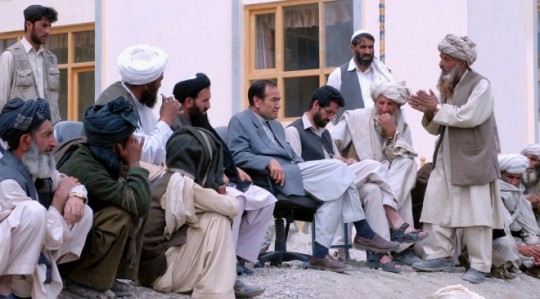
A major issue, however, was that the patrimonial linkages created by the state for its regional proxies was not comprehensive, as it did not extend to the Taliban’s Pashtun heartland and, as such, fuelled resentment and alienation as much as they placated and co- opted extra-state power brokers. Key players in the Northern Alliance - the primarily Tajik opposition to the Taliban - received prestigious posts within the state, whilst the predominantly Pashtun Taliban were themselves excluded from such arrangements. Because those rewarded by the state tended to be given ministerial or governorial roles in cities, the conflict dynamic tended to reflect an urban – rural divide similar to that of the Soviet occupation. Along this reading, the neo-Taliban insurgency was in many ways a product of the political miscalculations and deficiencies of post-invasion state- building activities.
Given this starting point, such a view concludes that the strategic problems encountered by the international community in Afghanistan were, to a large degree, problems created by (or at the very least exacerbated by) the state-builders themselves. They misread Afghan politics in a way that reflected their own philosophical assumptions about the state and society.
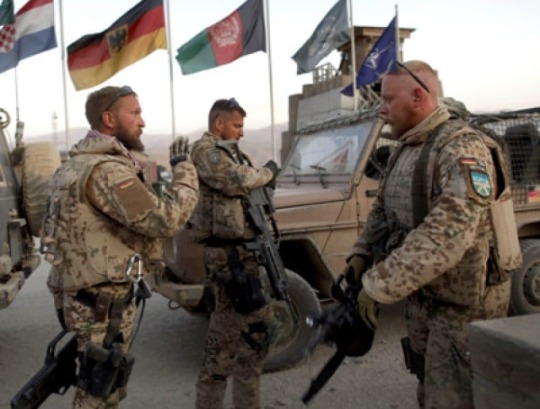
Strategy in Afghanistan suffered because the coalition effort, comprised of multiple national actors and the United Nations, rarely took on the form of a unified effort. Part of the reason for this was a divergence of opinion between actors as to the ultimate purpose – counter-terrorism or state-building – of the intervention.
In the first years of the Afghan campaign, the United States’ Bush Administration remained staunchly opposed to what it called ‘nation building’ and opted instead to pursue a policy of capture- or-kill missions against suspected terrorists. For the United Nations and most of the United States’ European NATO allies, however, state-building was considered a necessary element of any counter-terrorist strategy. This difference of opinion was manifest from the start by the creation of two parallel missions – the US-led, counter-terrorism-focused Operation Enduring Freedom (OEF) and the stabilisation missions of the European Union, United Nations (United Nations Assistance Mission in Afghanistan (UNAMA)) and NATO (International Security Assistance Force (ISAF)) – engaged in seemingly incompatible aims of military prosecution and peace building.
Opinion on the impact of this dual approach varies. Some scholars have noted, along lines similar to those critiquing the state-building efforts of the international community that the approach taken by the UN, EU and ISAF was too ambitious, naïve and unrealistic, and therefore bound to fall short of their liberal political and economic goals. Both Europe and these international agencies ignored the necessity of paring down the international community’s state-building efforts to core, security-centric capacity building within the Afghan National Security Forces. But of course one can make the counter argument, as many have of course, that on the contrary it was the insufficiencies of state-building approaches vis-à-vis OEF’s counter-terrorist approach that led to subsequent failures in UN and ISAF efforts; specifically, that a disproportionate focus on counter-terrorism missions meant that opportunities of peace- building were irreparably compromised.
Within NATO there was a division not just of opinions but also one of mission relating to different political perspectives about the purpose of the Afghan mission and its ultimate referent object – whether it was primarily about the interests of the coalition member states or concerned in the main with Afghanistan itself – and, from that, the methods to be employed in pursuit of one or another objective. This was not merely a debate bounded by strategic necessity, however; rather, such debates stemmed as much from institutional disagreements over who would or could do what in Afghanistan, which in turn arose from the differences in political constitutions and cultural attitudes towards counterinsurgency and counter- terrorism.
These ‘national caveats’ or ‘red cards’ of participation created significant problems for NATO in Afghanistan, both political, in terms of the relations between states and the abiding sense amongst some that others were ‘free-riding’ on the collective security system and, and strategic and operational, in the sense that command-and-control capabilities and cohesion between forces were limited by the engagement restrictions placed on certain armed forces. Indeed, the disproportionate burden placed on combat-oriented states like the United States, the United Kingdom, and several new member states in Eastern Europe led to political statements denouncing Europe’s perceived transgressors of collective security participation; former US Defence Secretary Robert Gates argued, for example, that NATO had effectively become a ‘two-tier alliance’ ‘between members who specialise in ‘soft’ humanitarian, development, peacekeeping and talking tasks and those conducting the ‘hard’ combat missions - between those willing and able to pay the price and bear the burdens of alliance commitments, and those who enjoy the benefits of NATO membership... but don’t want to share the risks and the costs’.
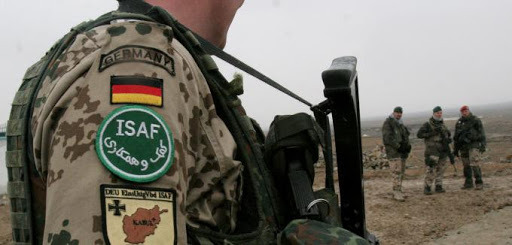
A lack of strategic unity was the natural consequence of a structural compromise that produced two distinct strategic authorities that were, in many ways, competing with one another. Along similar lines to the political arrangements between the Afghan state and its regional proxies, the NATO alliance structure can be seen (and evidently is seen by officials such as Gates) as patrimonial: states participated on the basis of fulfilling their own interests and along operational lines that were complementary to those interests, for the purposes of securing an alliance structure that accommodated all participants ahead of the imperative of creating a coherent strategy for stabilising Afghanistan. As with the neo-patrimonialism of the Karzai regime NATO’s efforts would be dictated by the limitations imposed upon it by circumstance.
Thus, in the cases of Afghanistan’s and the international community’s internal political dynamics, strategy was confined by the structure of the Afghan state and society, the structure of the international community and NATO, and the interplay between those structures. The implication here is that the agency required for the possibility of a workable strategy may have been illusory from the start.
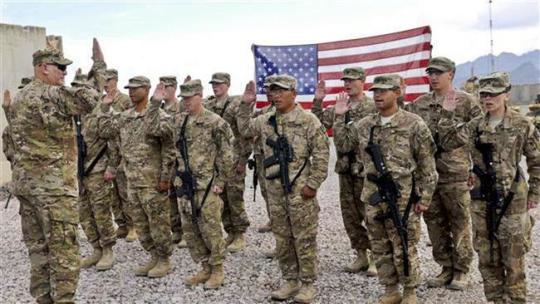
Leaving Afghanistan was never going to be pretty, but the latest turn is uglier than expected.
No one quite expected the speed of collapse within the Afghan National Army to hold of attacks of the Taliban. I don’t think it’s do with the lack of training or their professional skills is lacking (though there may be some truth in it). A big driver in the collapse is the money for wages, food and medical care for troops is syphoned to Dubai, so the Afghans who want to fight, and there are quite a few who hate the Taliban, get less replenishment than the 6th army in the last weeks of Stalingrad. They have arms, ammo and boots for this season only and that is it. Both money and morale are in short supply for these soldiers.
If I was a trained soldier in the Afghan National Army I would desert. I would say to them abandon the fixed defences these ‘ferenghis’ (foreigners) have gifted you and move to the hills and seek refuge with your tribal clan, who will be glad of the arms and experience you bring. Or get over the border if you are lucky to be in the North, if in the West you hire yourself to the Narcos in the badlands on the Iran border. Most other places it is either a last stand or defection, your Government and their relatives have already got their planes fuelled up in Kabul ready to move to their villa complexes in the UAE.
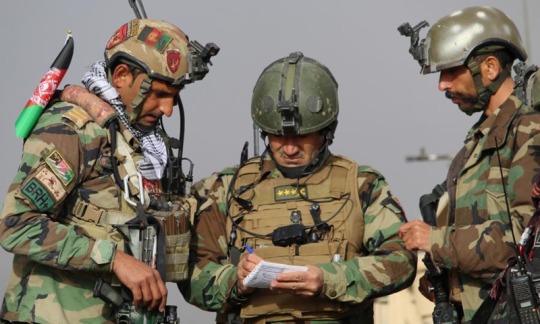
I’m being a trifle cynical but for good reason. Everyone who has been to Afghanistan sees the veil lifted on the corruption of aid and how the elites protect themselves ahead of defending the masses who bear the brunt of the bloodshed.
The corruption has been endemic from the get go, but the international community ignored it all for 'progress'. Any Afghan politico you hear on the media complaining about the West abandoning Afghanistan has at least $30 million parked in Dubai that should have gone to the soldiers, teachers, doctors, builders etc.
As spectacular as the collapse of the Afghan National Army has been it’s been even more scarier seeing how swift the Taliban has been in taking over vital provincial areas through propaganda, civilian intimidation, and rapid attacks. One by one, the Taliban has been taking over areas in a number of provinces in northern Afghanistan in recent weeks. The Taliban says it has taken control of 90 districts across the country since the middle of May. Some were seized without a single shot fired.
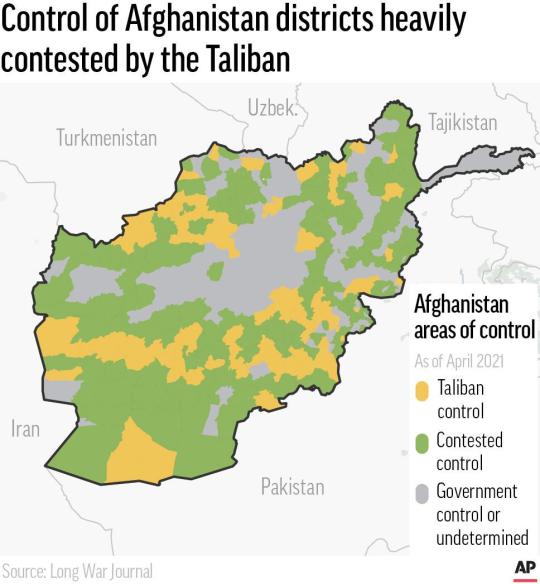
The UN's special envoy on Afghanistan, Deborah Lyon put the figure lower, at 50 out of the nation's 370 districts, but feared the worst was yet to come. Most districts that have been taken surround provincial capitals, suggesting that the Taliban are positioning themselves to try and take these capitals once all foreign forces are fully withdrawn. On a map, it's easy to see the point Lyon is making. A stark example is Mazar-i-Sharif, the biggest city in the north and a significant power centre in its own right. It was the rock upon which the Northern Alliance fought against the Taliban.
It is significant the Taliban are kicking off this offensive in the north, not their heartland in the south and east. The north was the toughest part of the country for them to crack last time. Their expectation is if they have victory there, success will flow much easier in their traditional homelands further south.
The strategy of taming the north extends to emasculating and profiting from trade routes to neighbours. On Monday night they captured the important border town of Shir Khan Bandar, Afghanistan's main crossing into Tajikistan. Earlier in the day, top Tajik government officials had met to discuss concerns about the growing instability next door. There is no indication that the Taliban intend to take their fight north of the border, but in the past Tajikistan has been a vital conduit for supplies flowing to the militants' northern enemies.
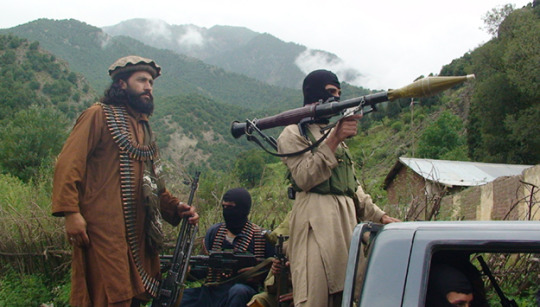
The last time the Taliban controlled the city was 20 years ago, when they left hundreds of captives in steel trucking containers to suffocate and die in the scorching desert heat. Now, the militants are back at the city gates once again, as part of a lightning offensive against Afghan government forces that has set alarm bells ringing from Kabul to Washington. So it should worry us all where will all this lead to.
America's drawdown seems to be the game changer. The Taliban have been beaten back several times in recent years, notably from Kunduz in 2015. The Taliban captured it briefly before US airstrikes were called in. Civilian casualties were high but the militants were driven out. The militant group has never been able to withstand the heavy US and NATO air assaults backing Afghan ground forces, but now the US and NATO are leaving, so is much of the threat of sophisticated and sustained air power. And the Taliban are well aware of this.
It seems to me behind the choice of withdrawal by the Biden government lies a bigger assumption that drives that choice. That is the Taliban militants' perceived desire for international recognition. This has been the mantra underpinning the American exit. The logic of the American argument has been simple: The Taliban wouldn't renege on their agreements with the US because they crave international acceptance. The events of this past week and more appear to blow a hole in that assumption.
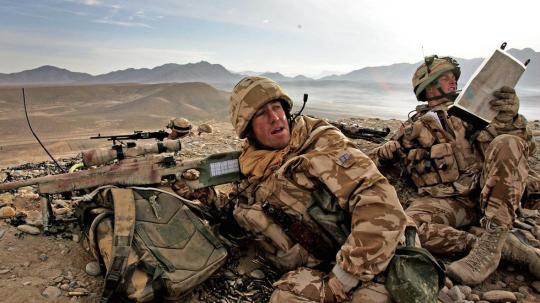
Another assumption that’s currently being blown out of the water is the US establishing some presence outside of Afghanistan so that if it needs to intervene again to combat terrorism or flush out militants then it can do so from the safety of a neighbouring country. But so far no country has come forward to reciprocate. And why would they? Like the Afghans, no one likes foreign troops with boots on the ground in their country. Only the central Asian republics and possibly Pakistan would come close to allowing that but there would be a political cost those governments would pay with their people. Moreover by welcoming the Americans in, they also allow the militants to target that country too.
Another assumption is the nature of the Taliban support and links to terrorist groups. The U.S. may not face any serious post-withdrawal Afghan support of extremist threats to the United States, even if the Taliban does take over. It is all too true that the Taliban continues to talk to the remnants of Al Qaeda, as do elements of the Pakistani military. It is unclear, however, that these remnants of Al Qaeda focus on attacks on the U.S., and the Taliban does seem to oppose ISIS. It is also unclear that the Taliban will host other extremist movements that focus on attacking the U.S. or states outside the region.
It is unclear that any key element of the Taliban has an interest in such attacks on the United States. Even Al Qaeda now focuses largely on objectives inside Islamic countries, and it is unclear that some other major extremist force will emerge in Afghanistan that do not focus on regional threats and on taking over vulnerable, largely Islamic states.
At the same time, one needs to be careful about the assumption that the U.S. can defeat any such threats by launching precision air and missile strikes against extremist targets. It is unclear that the forces in Afghanistan involved in any small covert attacks on the U.S. will be easy to target and cripple if they do emerge. The Taliban is unlikely to tolerate major training camps and facilities for extremist forces, and any such strikes will present major problems for the U.S. if the extremist threat consists of scattered small facilities and small expert cadres that shelter among the Afghan population.
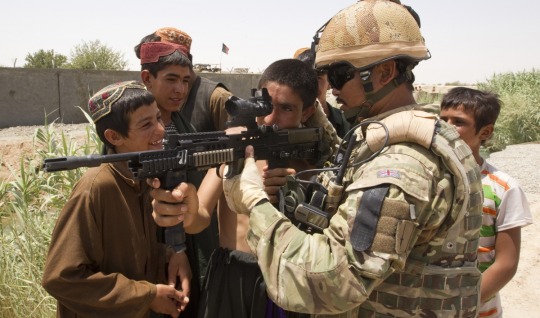
It is also far from clear that more intense U.S. air attacks on Taliban forces from outside Afghanistan will have any decisive effects. The loss of limited numbers of Taliban fighters as well as some key Taliban leaders and facilities will not offset the pace of their victories in the countryside or enable the central government to survive. A continuing U.S. ability to target and kill some key Taliban leaders and fighters also does not mean that the risk of such strikes will deter future Taliban willingness to let small, extremist strike groups conduct well-focused, well-planned strikes on U.S. or allied territory, especially if such groups in Afghanistan sponsor attacks on the U.S. or it strategic partner by strike units or cadres based in other countries.
At the same time, it does seem more likely that the Taliban, and/or any independent extremist groups, will focus largely on Iran, Pakistan, Russia, China, and the other “-Stans.”
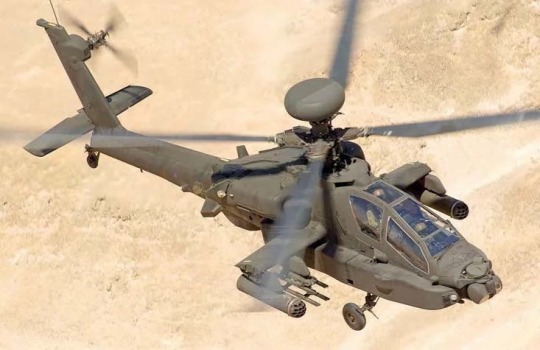
Going forward I think we need to re-evaluate many of our assumptions about the war in Afghanistan.
The objectives of the Authorised Use of Military Force approved by the US Congress in 2001 have long been accomplished. Once Osama bin Laden was killed in Operation Neptune Spear in 2011, the last element of the AUMF was met. The American and British mission in Afghanistan was complete. But America and Britain did not leave because we wanted to do a spot of state building to curb the spread of militant islamist terror. That was a mistake as it turned out.
Post-Neptune Spear, The American, the British, and their allies’ conventional mission should have been ended, adopting instead a laser focus on intelligence collection and offensive special operations to prevent al-Qaeda (or any terrorist organisation) from re-establishing safe havens and training areas.
What was needed for an acceptable ‘victory’ and a ‘saving face’ withdrawal was to embrace the use of Afghan Militia Forces the same way the Allies did for our initial entry way back in 2001.
In 2001, Western powers won the initial military engagement in 42 days using special operations forces with local and regional allies - we need to return to this format - and through a combination of special operations and specific information operations efforts, regaining the high ground and influence over ‘centres of gravity’. The issue is not the number of troops, but the mission of the forces there. Once the mission is defined, the number of forces needed would be clear.
It has never been about the number of troops - it’s been about the lack of an achievable mission assigned to our forces in Afghanistan.
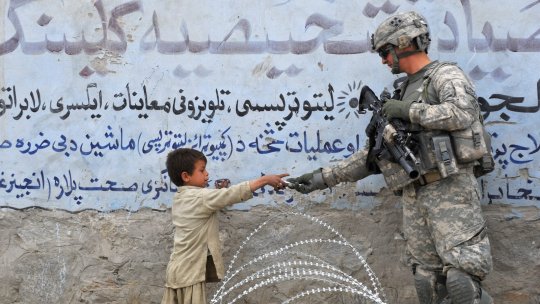
The US engaged in ‘nation-building’ for the wrong reasons - and has seen bad results. We installed Hamid Karzai, served as his praetorian guard to protect the new central government and abandon our AMF allies and attempted to build a large, bulky, expensive and ineffective Afghan National Army - a force that is now evaporating before our eyes. It was folly.
Americans will never make the Afghan people more like them - nor will they be able to instil what my American colleagues used to fondly refer to as ‘a Jeffersonian democracy’ in Afghanistan. That day may come but only when the Afghan people wish it to be so. Lest it be forgotten Americans sought independence in 1776; the Afghan people seek self-reliance and independence from foreign influence. This is their defining historical DNA: escape from any outside control.
The Afghan people are not ungoverned, they are self-governed - with no tradition of central democracy and no desire for our version of democracy or ‘prosperity’. By pushing ‘prosperity’ we had become targets for both the Afghan government and the Taliban. This has ended, but we must draw a distinction between the end of nation-building and the continuation of our own interests in Afghanistan and the region.
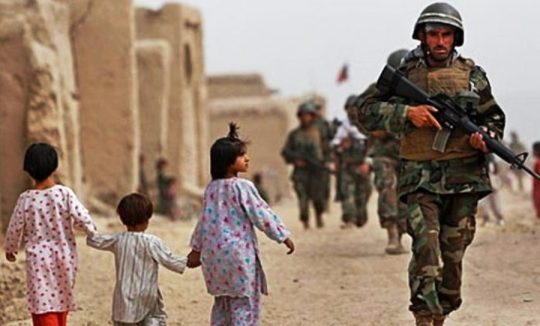
It is time to adopt a practical policy based on what will work and is in our allied interests, rather than by funding the aspirations of progressive politicians who have no real understanding of Afghanistan.
First, we must establish a clear post-‘state-building’ strategy - with achievable objectives. We must return to the policy and operational format we know will work - cooperation with Afghan tribal leaders and militia. This type of force was used to achieve the initial victory in 2001. Empowered warlords and regional leaders were the force multiplier that worked as the Afghan Militia Forces - and can again, in partnership with our Special Operations Forces work now. Intelligence collection and limited military operations should be our focus.
There is no way around it. One has to play the Great Game. Think tribal rather than central. Afghan nationhood is a liberal Western wet dream.
The central government is weak and corrupt just like all the other rulers of the past. The Afghan National Army is not as strong as it is on paper. It can hardly prop itself up rather than any government. Most of the Afghan National Army troops have stronger tribal loyalties than to the concept of a nation. Since the tribal chiefs play both sides to hedge their bets, it's no wonder 'their' people do what they're told. The Taliban know this because that has always been the Afghan way, so the tribes go with them. Provided the Taliban honour their promises to the tribal chiefs, the Taliban can do what they want.
On one hand, the tribes won't now be too bothered by central government and have a large pool of Western-trained troops to prop them up. On the other hand, they now have to do business formally with the Taliban again. Largely in order to get their hands on Western-supplied aid that will surely follow after the Americans leave.
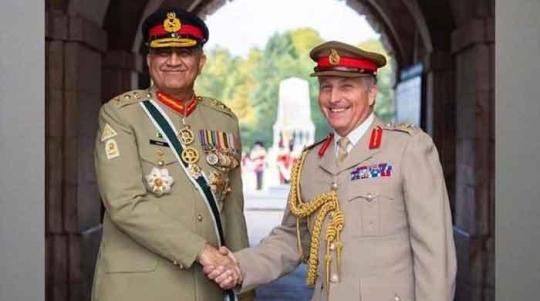
Second, we must accept the reality of Pakistani influence in Afghanistan - and work with the Pakistanis to counter al-Qaeda and the other militants now attacking Pakistani targets within Pakistan. Pakistan has made great advances in securing the tribal areas on the other side of the border and they have always been the de facto control of much of the Taliban force capacity, such as the Haqqani network. Working with Pakistan is the best option within the current circumstance.
‘Endless wars’ are not an American value. The use of the US military must only be used in response to genuine threats, when American interests are at stake or lives in danger. Withdrawal of conventional military forces and discontinuing nation building is in the US interest: leaving Afghanistan is not.
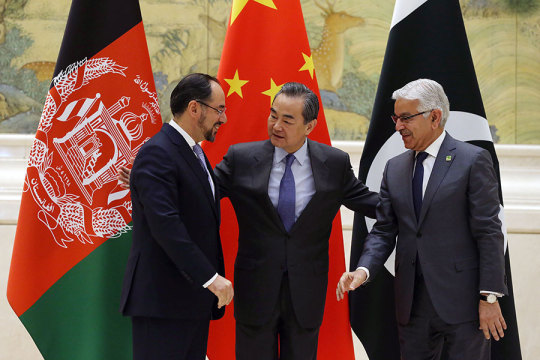
Third, make Afghanistan China’s problem. Afghanistan could easily become a hotbed for growing Islamic extremism, which would to some extent affect stability in Xinjiang.
It is not without reason that Afghanistan is known as the “graveyard of empires”. The ancient Greeks, the Mongols, the Mughals, the British, the Soviet Union and most recently the US have all launched vainglorious invasions that saw their ambitions and the blood of their soldiers drain into the sand. But after each imperial retreat, a new tournament of shadows begins. With the US pulling out of Afghanistan, China is casting an anxious gaze towards its western frontier and pursuing talks with an ascendant Taliban. The burning questions are not only whether the Taliban can fill the power vacuum created by the US withdrawal but also whether China - despite its longstanding policy of “non-interference” - may become the next superpower to try to write a chapter in Afghanistan’s history.
Beijing has held talks with the Taliban and although details of the discussions have been kept secret, government officials, diplomats and analysts from Afghanistan, India, China and the US said that crucial aspects of a broad strategy were taking shape. An Indian government official said China’s approach was to try to rebuild Afghanistan’s shattered infrastructure in co-operation with the Taliban by channelling funds through Pakistan, one of Beijing’s firmest allies in the region. China is Pakistan’s wallet.
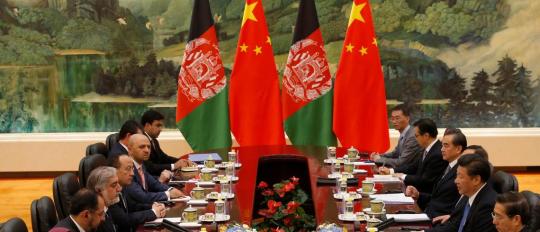
It has been reported that Beijing has been insisting that the Taliban limit its ties with groups that it said were made up of Uyghur terrorists in return for such support. The groups, which Beijing refers to as the East Turkestan Islamic Movement, are an essential part of China’s security calculus in the region. The ETIM groups were estimated by the UN Security Council last year to number up to 3,500 fighters, some of whom were based in a part of Afghanistan that borders China. Both the UN and the US designated the ETIM as terrorists in 2002 but Washington dropped its classification last year. China has accused the ETIM of carrying out multiple acts of terrorism in Xinjiang, its north-western frontier region, where Beijing has kept an estimated 1m Uyghur and other minority peoples in internment camps.
In a clear indication of Beijing’s determination to counter the ETIM, Wang Yi, China’s foreign minister, exhorted counterparts from the central Asian states of Kazakhstan, Uzbekistan, Kyrgyzstan, Tajikistan and Turkmenistan this year to co-operate to smash the group. “We should resolutely crack down on the ‘three evil forces’ [of extremism, terrorism and separatism] including the East Turkestan Islamic Movement,” Wang said in May according to Chinese news media which I follow.
The importance of this task derived in part from the need to protect large-scale activities and projects to create a safe Silk Road. Silk Road is one of the terms that Chinese officials use to refer to the Belt and Road Initiative, the signature foreign policy strategy of President Xi Jinping to build infrastructure and win influence overseas.
An important part of China’s motivation in seeking stability in Afghanistan is protecting existing BRI projects in Pakistan and the central Asian states while potentially opening Afghanistan to future investments. China would have to more actively support efforts to ensure political stability in Afghanistan. So make them work for it. Western powers need to leverage China’s problems in Xinjiang to be more active in Afghanistan.
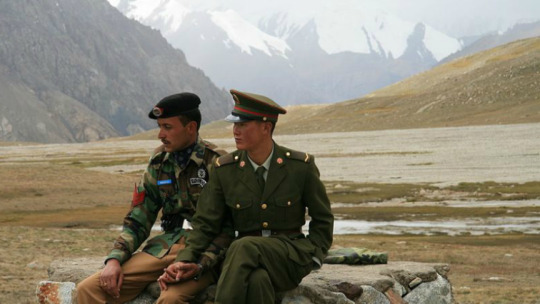
International media outlets and intelligence agencies worldwide have been circulating reports pointing toward the creation of a Chinese military base in the Wakhan Corridor of Afghanistan’s Badakhshan province for a while now. Although China has not embarked on militarisation programs on foreign soil historically, and has profusely denied the rumours about building an Afghan “mountain brigade,” China’s first overseas military base in Djibouti provides an example of China’s newly adopted strategy of leveraging economic influence to further its strategic objectives. There’s even some chatter amongst Chinese officials that Beijing may entertain the idea of being part of a future UN international force should one be needed in Afghanistan (a bad idea but hey, let China find out first hand for itself).
The Afghan government was able to maintain a measure of stability largely because of the superiority of US air support. The drones, gunships, helicopters and heavy air artillery were unmatched by the Taliban. But when the US leaves, that advantage will evaporate. China’s imperative to create overland trade routes to Europe and the Middle East may draw it inevitably into Afghanistan’s domestic strife.
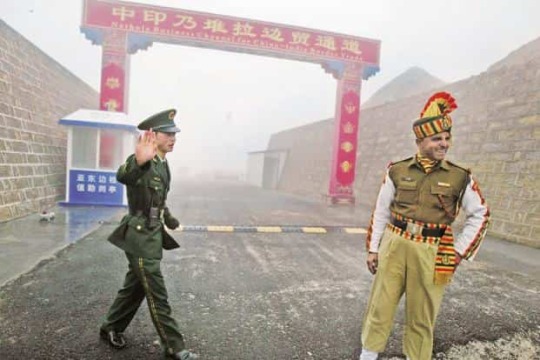
Of course China’s forward policy in the Wakhan Corridor needs to be assessed with a critical eye. Although on one level it seems to be motivated primarily by the threat of radicalisation, China’s interest in the region is also contingent on the strategic role that Afghanistan is capable of playing in the larger scheme of things. Despite China’s vehement denial, there seems to be sufficient evidence available indicating a definite military build up in the region, which provides China with an opportunity to showcase its ability to transform into a balancing force in the regional dynamics. I think that is a trade off that both America and Europe can afford to concede under the current circumstances.
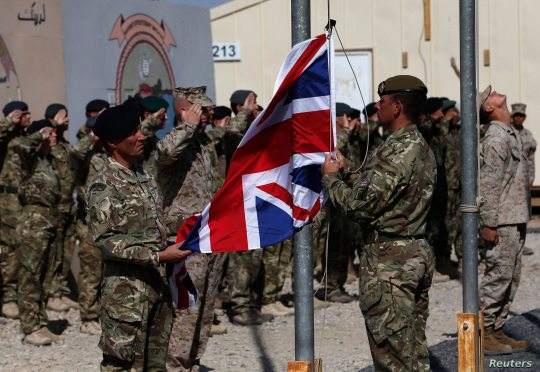
In conclusion In the face of failure, there is an impulse to move on and not ask “what led to this?” But to avoid a reckoning with our follies is to risk their repetition, or worse.
it is probably too late to salvage either the civil or military situation in Afghanistan. It almost certainly is too late to salvage it with limited in-country U.S. forces, outside U.S. airpower and intelligence assets, and with no real peace agreement or functional peace process. Limited military measures are not the answer, and neither is simply reinforcing the past processes of failure. Tragic as it may be, withdrawal may not solve anything and may well make conditions worse for millions of Afghans, but reinforcing failure is not a meaningful strategy.
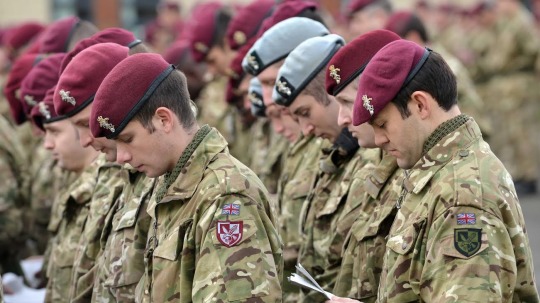
I do feel strongly that both the American and British governments must establish a clear path of redemption so that those who served and the families who sacrificed loved ones know that their loss was not wasted. At the same time our civilian governments must limit missions to intelligence collection and counter-terrorism missions that will prevent the metastasis of al-Qaeda or Isis in the region should the Afghan government fall. How we balance these two is going to be very interesting to follow in the next chapter in Afghanistan’s tortured history.
I apologise for the length of this post. This has been a hard post to write because of the subject matter and the many conflicted emotions and memories I have of my time in Afghanistan. I wish I had all the answers but I suppose the beginning of wisdom would be to know how to ask the right questions. Because we didn’t ask the right questions when we went in, we ended up making a real mess of it.
There is an understandable desire to bring all our allied troops home safe and that not another life is lost there. Yet I doubt this policy of withdrawing all troops will bring peace to anyone, not to us and most of all, the Afghanis themselves. As always in war it is the native population that will bear the real cost of war, in this case women, girls, and others brutalised under Taliban rule. What lies for them if the Taliban regain power to govern the country in their image is something I care not to imagine but retain a deep foreboding of their continued suffering. Ordinary Afghanis just want a respite from war and have a chance to live in peace, but without having us foreigners or the Taliban around. It is hard to imagine that happening at all. Our desire to save our soldiers’ lives set against ordinary Afghanis being left at the mercy of the Taliban is one of those humbling and brutalising trade offs that any war can only offer.
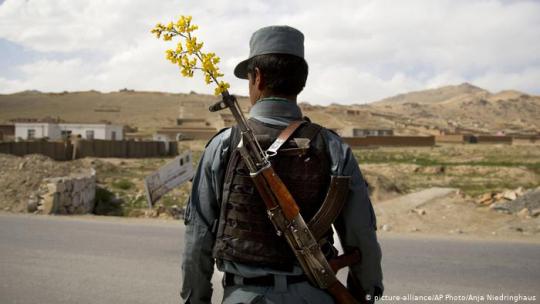
Near the end of his famed novel, The Great Gatsby, F. Scott Fitzgerald described two of his privileged characters, Tom and Daisy, as “careless people” who “smashed up things and creatures” and then “retreated back into their money or their vast carelessness” to “let other people clean up the mess they had made.”
That description applies to America as a whole but also to we Brits and other Europeans, especially when we tire of a misguided war. Americans and we Brits are a careless people. In both Iraq and Afghanistan, we smashed up things and human beings with abandon, only to retreat into our materialism. No scratch that, returning soldiers retreated into themselves struggling with PTSD whilst the rest of our citizenry carried on with their own material struggles and their insipid culture wars. The point is we always leave others to clean up the mess in a very bloody fashion that never troubles our conscience.
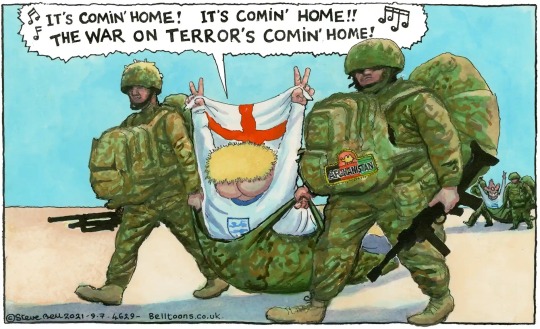
Count on us, probably sooner rather than later, doing precisely the same thing in Afghanistan. Again.
Thanks for your question
#question#ask#afghanistan#war#terrorism#warfare#history#america#britain#taliban#pakistan#china#south asia#security#intelligence#europe#un#isaf#nation building#politics#power#military#personal
163 notes
·
View notes
Text
The Mosley Review: Worst Films of 2019

Well 2019 has delivered some of the most disappointing, ugly and just downright disgraceful films I've ever seen. With 2020 on the rise, I can marvel at the fact that I wasn't the only one of the cats that fought his way through hell to get through this year. On an international scale, I believe a phoenix swept over the film industry and became the terminator of many franchises. Like you all, I survived this dark year in film and it is with great pleasure that I bring you the list of what films to avoid like a hungry lion looking for his next meal. So lets see who is the king of my list of the worst films of 2019. If you would like to see the full review, then click on the titles of each film. The first film on my list just hurts.
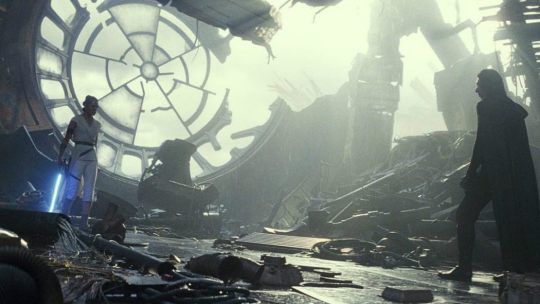
Star Wars: The Rise of Skywalker: It is with a heavy heart that I had to put this film on my list. Star Wars has always been apart of my life and apart of my soul. At any given time, you can find me playing a Star Wars game, watching any of the movies or even revisiting The Clone Wars series. As much as I wanted to love this film, there is just no denying that this was just the worst film the franchise has ever seen. There are some truly amazing and fun sequences and a great lightsaber fight, but that all doesn't matter when your core story is too busy negating, betraying and apologizing for past films that tried to expand and do something new. All of the new and old philosophies were completely destroyed by conveniences of stuff just happening and lazy writing. As for a trilogy, it was a unplanned, unfocused and perfect example of how not to tell a story ark. It hurts my ever loving Star Wars soul, but this was the worst of the franchise and just a massive disappointment.
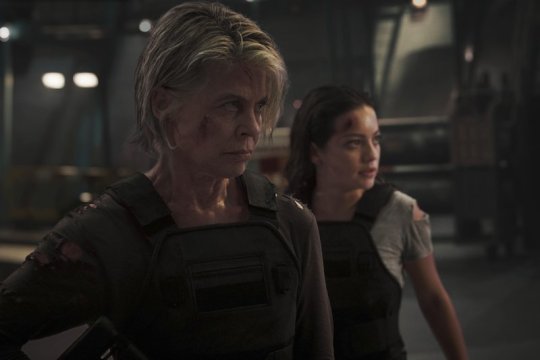
Terminator: Dark Fate: I love and hate this franchise. I love that they keep trying to make a good film without the creator James Cameron at the helm, but I hate that they are staying modern day. Now with the risk of erasing everything after T2: Judgement Day, there was a chance to do something right. Well after the opening scene, the door was flung right open for an interesting path and it ultimately failed. This film followed the same mistakes of being heavy on big action sequences and less on heart and character development where it was needed. It was great to see Linda Hamilton and Arnold Schwarzenegger back together again and they had an awesome villain to battle, but I just thought this film was just meh all the way through. This was the last chance for the franchise and they blew it.
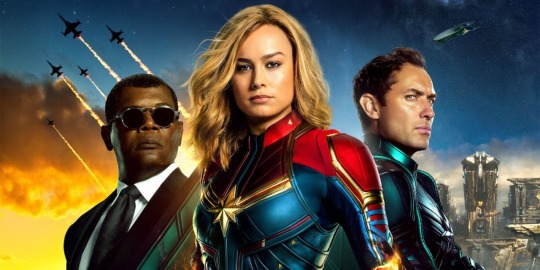
Captain Marvel: Well not all of them can be winners. The Marvel Studios brand is one of the most trusted brands in the industry and they have earned it. Almost every entry in their series of films have ranged from classic to alright. This film on the other hand was just a waste of a potentially great origin story for one of their most iconic female characters. I honestly could not connect to the main character enough for me to care. She had no real weakness in the film and no vulnerability. Yeah sure she's only known the life of a soldier, but that doesn't mean she isn't human. The storytelling in the film was all over the place with some stupid decisions and there just wasn't enough substance. A character with a snarky attitude and no regard for anyone else doesn't make for a good hero or a origin you want to study more about.

The Lion King: Double dipping doesn't always work and this was the prime example of that. I love the original animated classic and I think it truly is my favorite animated Disney film. I didn't go into this film judging it against the original because that would just be dumb and unfair. It is undeniable that this film is a technical achievement, but that was about it. The voice acting was a serious mixed bag. The child actors for Simba and Nala, Timon and Pumba and Zazu were truly the highlights, but the adult versions of Simba and Nala were flat and purely directed. Shot for shot remakes are not a good idea and this was that. If you diverted a little more from the source material, then this would've been an interesting remake. Listen up Disney, don't do this again.

Dark Phoenix: Oh man. The X-Men film franchise has truly seen some better days. We can all agree that this film franchise really had no since of continuity or an idea of where it wanted to end. Well with a reboot mid stream, I knew eventually there would be another attempt at the Phoenix Saga. Once again they've missed the X on the spot. The fact that this was the last film in the franchise that started in 2000, is truly a relief. We've had some amazing films, but this was by the far the worst of them all. Goodbye X-Men. I'll always have Logan in my heart.

Cats: I mean. Is there really anything else I can say about this insanely bizarre film? I had seen the Broadway version of the show on DVD a few years back and I could't understand it. The film made it better, but I couldn't get over the horrific nature of the CGI cat fur on the acts. It ranged from weird to “What in heavens name did you do to Jennifer Hudson?”. I know it was Andrew Lloyd Webber’s vision and probably director Tom Hooper's dream picture, but this was just too strange to be adapted to film. Not even the star power behind the film could save it. If an example of why certain shows work best for the stage was needed, then look no further than this atrocity.
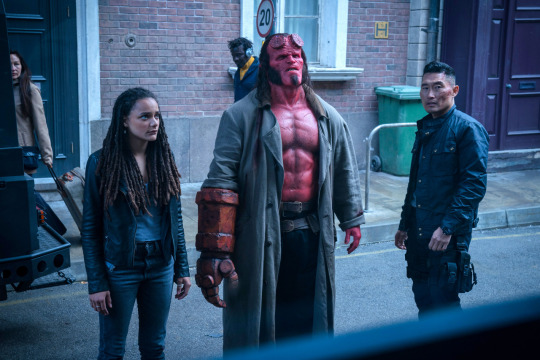
Hellboy: Why was this rebooted? Oh yeah that's right. The studio didn't want to complete Guillermo Del Toro's superior vision of what Hellboy 3 would've been. Let me be clear, I gave this film a chance to show me a new, darker and more violent version of the iconic badass. What I got was a violent, darker, noisy and whiny little bitch of a character. I love David Harbour, but he was really dealt a terrible hand and I think he knows that. There are some awesome visuals and a great fight scene with big trolls, but after the first 15 minutes the film just dissolves into a horrible mess of a film. I didn't care by the film's last 10 minutes as we retread the same themes of the first iteration of the character. Thank God there isn't gonna be a sequel to this trash.
And now we’ve arrived at the last film I hated. The crowning turd of 2019, is none other than...

Men In Black: International: Where do I even start with this abomination. I loved the original and third MIB film. It wasn't a great trilogy, but it was consistent. The character Agent J earned his place among the MIB and the chemistry between him and Agent K was a perfect example of how to do a buddy cop film in the sci fi comedy genre. This film ignored all of that and focused strictly on the comedy and just never took itself seriously. The main character Agent M, had an interesting beginning and 5 seconds after she finds the MIB, they give her everything. She didn't earn anything which made her immediately boring and unnecessary. Chris Hemsworth is a great actor and he has great comedic timing, but this was the most obnoxious and unlikeable character he's ever played. This film had no heart, no real stakes or even an idea of what the story wanted to be. Like I said in my review, this film franchise should've stayed dead after Men In Black 3.
That's all folks and thank the heavens. These were the worst films of 2019 and I say this every year, but I really hope I'm right. Let's hope 2020 has a shorter list of worst films.
#worst films of 2019#star wars the rise of skywalker#hellboy#terminator dark fate#Captain Marvel#the lion king#dark pheonix#cats#men in black international#chris hemsworth#david harbour#taylor swift#james mcavoy#arnold schwarzenegger#daisy ridley#adam driver#tessa thompson#brie larson#samuel l jackson
11 notes
·
View notes
Text
Sublime Life, Insufferable Life
Chapter II : A Day in the Life of Mr. Soldier
Words : 9,145
A day in the life of Damian Adam Ohne, known as Flippy to some, was one fraught with paranoia, stress and depression, all kept at bay with an unhealthy diet of medication. Something which proved less effective as the quaint joys of suburban life gave way to the gray and cold concrete of urban day-to-day. The clear or sometimes cloudy azure sky became mottled by the general smog and pollution outputted by sprawling cityscapes such as these, and what'd once been close to nothing but familiar faces was now an onrush of strangers. But with this shift in scenery, a sense of relief replaced the constant anxiety looming over his psyche whilst being around his once friends.
Now, at least, he could lay his head down at night without the constant worry of losing control of himself and hurting those closest to him. This wasn't entirely true, however, considering he lived in an apartment complex (see: dingy and cheap) with at least four people he could consider to be neighbors. He could never find true relief from his constant vigil against his more destructive side, not so long as he found himself in close proximity to even a single other human being. These thoughts did give him pause to consider the merits of living out in the middle of the woods surrounding the Happy Tree region, but the lack of access to medicinal remedies beyond herbal was enough to dissuade him.
Besides, the city boasting a substantial law enforcement presence offered him some margin of reassurance in the knowledge that, should he ever flip out, there'd be more than enough people around to ensure he didn't hurt anyone.
The wail of a siren jolted him out of bed, eyes wide and body tense as the world rumbled under the thunder of artillery pounding the dirt. Were they outbound or inbound? He couldn't tell, didn't have the time, he needed to get his rifle and knife. Where were they? Silly question, right next to him: rifle propped up next to his bed and the knife tucked away, up under his pillow. Snapping to attention, the man's hand shot out to the side whilst he flipped over onto his stomach and slipped the other hand under the pillow. However, he was only met with the sudden anguish of both mitts smacking into things that were definitively not weapons.
In fact, following the impact, the siren cut out not long after the sound of a crash and the scattering of many pieces of something.
The roar of metal birds and thunder of artillery were quick to follow suit.
Now nursing either hand against his chest, Flippy's eyes finally adjusted to the dimly lit interior of his bedroom-not his barracks, not back in Nitevam, still in Happy Tree City.
His heartbeat slowed but both his body remained stiff and breathing kept at a panicked pant.
Surveying the room, he spotted nary a single Nitevam Tiger lurking in the shadows to strike when he least expected it: no telltale glints of metal, no hushed breath in the pervasive quietude, no bizarre murkier-than-normal spot of darkness, and certainly no scent of wet plant material or brackish water drying along dirt-caked skin.
Reaching up, the veteran caused the pillow to fold upon itself before running his aching fingers through grassy green hair whilst trying to steady himself. Just remember your breathing exercises, he told himself. He even began pawing around his nightstand in a vain attempt to locate a stress ball.
Flipping out this early in the morning was definitely not on his list of desired starts to a day.
Whilst feeling around the plywood top of the nightstand, he noticed the distinct lack of clutter that'd once taken up the majority of the surface area. Glancing over, he could make out the remnants of an alarm clock, a palm-sized bottle and a square picture frame scattered across the wood floor.
Flippy heaved a sigh before dragging his fingers to the back of his scalp and then off onto the edge of the bed. "Great... no deposit on that," he mumbled.
Shifting out of the thin covers he'd already half tossed off, the veteran stood up and took but two steps forward before crouching down to inspect the damage.
He leaned forward and fingered through the debris.
Sharp bits of broken plastic and the patchwork bits held together by wire or what have you greeted the tips of his fingers. But, really, the examination was naught but a formality. Anyone with half a mind could deduce the riddle of whether the device was beyond repair.
After a moment of fingering, a tight frown creased his lips and his eyes squinted as he pinched the bridge of his nose; he did not have the cash on hand to afford a replacement, even if it were cheap. Maybe he'd be able to convince the guy who'd sold it to him that it got broken in transit and he wanted a replacement? But, no, trying to take advantage of someone kind enough to cut down the price of a product was out of the question. Just thinking about it left a bitter taste in the back of his mouth.
Even still, though, he couldn't simply go without a means of ensuring he wakes up on time--military life or not, you could never be certain when you woke up in the morning. And given it took the majority of four months of pay (see: sergeant's salary) to fund the, not so, sudden move, he needed to always be punctual when attending the numerous side jobs he worked from day to day.
He pondered the dilemma before him whilst staying low to the floor, the aforementioned hand wiping down and sliding off his face to then hang limp off the corresponding thigh.
"Maybe..." he wondered aloud "maybe I can... get him to give one on loan?" It was close to the end of the month's second week, after all, so it wouldn't be too long until he'd be able to pay the man? Perhaps even enough to cover the other amount cut out of the first clock's price tag? That'd at least make up for the fact he managed to shatter it in the very short amount of time he'd procured it.
"Yeah... yeah! That should be good." He paused. "God, I need to stop talking to myself before I go fully insane."
And with that, Flippy took a trash can and began tossing the bits in before heading down and outside.
The first step out of the apartment complex was rife with sensations Flippy had yet to acclimate himself to.
Unlike the quaint town he'd grown up in, the urban environment of Happy Tree's expansion as a county had already become a hub of activity. Since no one could truly perish, there'd been far more people than homes--this was the prime reason for the city's development. As such, the noise pollution of vehicles making use of brand new streets and pedestrians milling up and down sidewalks was anything but lacking. Walking out into such an urban symphony left his ears throbbing ever so faintly. But the sound was the least of the differences. For example, the light level and air quality were palpably worse than in the old town. It smelt of gasoline with whiffs of coal fumes, carried down into the valley it'd been erected in, and the ever-present odor of garbage and bustling crowds. Having only learned this recently in the years he'd been off-duty, the rapid urbanization of the countryside resulted in numerous oversights regarding the environmental practices of the region's expanding industry.
Life in the military, though, and especially the decade he'd spent on tour in the Tiger War hardened him to such sensory overload.
What city chatter could compare to the deafening beat of M109 howitzers pulverizing entire warzones?
What could rival the broth of gunpowder, blood; fresh and drying, the diesel belched from machines of war, the corpses of your fellows laying at your feet in the field, charred plant matter and up-turned soil, and the napalm-seared flesh of friend and foe alike?
Despite all of this, though, Flippy found the lack of country comforts almost as disheartening as the first time a friend bled out in his arms.
Rubbing rough palms into tired eyes and inhaling as deep as he could, the veteran sighed and adjusted the strap of his backpack before filing his way into the stream of people.
Something he hadn't fully taken into consideration at the time of contemplating moving, of which he'd been considering a while before writing the letters to his friends, into the city-being in large masses of bodies unnerved him to no end.
Now, he wouldn't go so far as to say he had claustrophobia (see: lying in wait in a log). But the sheer proximity of so many bodies dredged up rather awful memories he preferred remained buried. And while his breathing techniques took off some of the edge, it couldn't alleviate the warmth wafting off each person. And it still being in the throes of summer didn't make matters any better, its warmth further compounding an already stressful situation. There were no worse moments than when he had to wait at a traffic light with a bunch of others, however.
As if to spite the skyscrapers impeding the brightening rays of sunshine, the sun baked them in an onerous heat similar to an oven's temperature. Nay, not an oven, not with the shoulder-to-shoulder lack of space. It'd probably be fairer to compare it to a pressure cooker, to an unopen can of sardines shoved into a microwave set on high. The longer they stood there, the harder it was to breathe. Would anyone even notice if they all collapsed into one mound of bodies, would anyone even care?
Eyes darted up to see the red hand still present, the vehicles still crossing over the crosswalk.
"Come on you fucking... turn red-!"
On and on time dragged on, nothing ever changing save for the mounting heat and stagnating air.
He tried to move up from the center--when did he get to the middle?--where he could click the button until it broke and remained on Walk permanently. But any attempt to push his way through was met with a push back and irritated glares. Why didn't it change? Why didn't the people up front press the button again? Why was sweat mingling with ichor and decay to choke him? Each breath came out faster than the last, more ragged, as beads of cold perspiration joined that of its kin.
He could feel their weight pressing down on him, squishing him from all sides.
A pile of desecration hellbent on silencing him, turning him into another forgotten casualty.
Faces of friends and comrades revealed by what slivers of red-tinted radiance managed to slip through the amassed bodies, corpses, bags of meat and suffocating heat.
Oh god, oh god oh god oh god-he isn't dead, he isn't dead!
He isn't just another casualty, another sack of fat and flesh to fuel the pyre!
He is alive, alive dammit!
He won't stay beneath all the bodies and wither away for all etern- then the cars stopped and the light changed, prompting the people around him to start crossing over.
Flippy shook his head, blinking and taking in deep breaths to keep his strides from wobbling; warmth suffused his palms and burning liquid trickled from his fingertips. Whatever reactions this begot from those around him didn't matter, all that did was getting as far away from that intersection as possible. He made a note to take a different route on the way back.
Regardless, it was going to be a long day.
"Thank you again, Mr. Kedar," Flippy called back to the storekeeper.
"Don't mention it--jus' remember, end of the week!"
"You know it!" And just before the automatic doors slid shut, he popped dual finger guns at the middle-aged man.
Turning around anew, Flippy took hold of the bag with both hands before stretched it open to peer inside.
His 'purchase' was a used black digital clock roughly about the size of the last one, wrapped up in the thin matching wire you'd plug into an outlet. Nothing too fancy, nothing painfully simple or barebones. And underneath it, a slip of paper showing proof of the loan as well as the receipt for the item itself. The latter was paired with a receipt for the one he broke. All contained in a helpful little paper bag provided by Mr. Kedar.
A guttural huff and he slipped an arm through the handholds on either side to let it rest in the crook of his elbow whilst he folded both limbs over his chest.
Now that he had the assurance of waking up on time, he needed to contemplate what part-time job(s) he could take from the small list he'd printed up from the library several blocks away the other day. Unlike the ones he'd worked before, he hadn't the luxury of relying on knowing the employer to guarantee the position. That and he wanted to make sure the one he takes had as little risk of triggers as possible; working in that carnival hadn't been the smartest of decisions. However, he felt like city life was going to need more than a part-timer could make to live on his own.
Of the options, he recalled seeing and writing down an opening as an electrician when he was perusing with a question mark next to it.
War-Mur Electric, if he remembered right.
Maybe he could give that a try?
Messing around with electrical wires didn't seem too flip-out hazardous, and it was certainly better than being a librarian again.
He was still ashamed of losing his temper as he did with Mime.
At the very least, it was worth a shot.
Rotating his shoulder, he let the backpack slip down to his elbow and hang there before going to undo the first zipper. Once open, he placed the bag inside and closed it back up. Then he opened and rifled through one of the front compartments, retrieving a series of papers he'd also printed from the library: a resume, a general cover letter and a copy of his CO's written permission to procure civilian employment. Everything was present and accounted for save for an actual application-that is if they even require one.
Flippy glanced over the documents for a moment to make sure everything was in order, then grinned and neatly folded them before readjusting his bag onto his back.
War-Mur Electric was rather new to the electrical maintenance game, but the sudden and rapid urbanization meant their business opportunities exploded in direct correlation to the city's growing needs. As such, they had a few buildings spread throughout the urban sprawl. The one Flippy knew about was smaller than the buildings flanking either side of it, perhaps even a tad smaller than his old house.
Gray walls mostly devoid of features save for blocky letters on the front and the occasional window on the two floors composed the entirety of the structure. The door had a sign hanging on the inside that read, "Open," in big blocky green letters. There was also space left between the buildings on its flanks so as to allow the company cars access to whatever laid behind it. And he had to duck through the door on the way in.
Inside was more of the same function-over-form aesthetic with the only difference being the presence of personal items left by employees.
The room you entered upon walking in could be described as a studio apartment deprived of living amenities and furnished with several plain metal desks pushed together with simple swivel nameplates plates propped up on the corners, some personal paraphernalia and the stray paper or folder. There were also some bulletin boards and even a few lockers too. Deviating from this trend, though, was one corner in the back left which had an oaken coffee table and large couch pressed up against the wall. Connecting to this clerical lounging hybrid space was a room filled with more single-person lockers, all lined up in rows with a bench of sorts acting as a dividing line.
Few people were inside at this time of day since Flippy woke up and set out rather early in the morning, but those that were took note of the towering man for a moment before glancing over to one in particular and then returning to whatever work was at hand. Said individual leaned back in his chair for a moment, closing the laptop in front of him and then getting up to approach him.
A portly uniformed man of middle age and balding head with clear laugh lines, warm eyes and bushy eyebrows that compliment his bushy mustache, he placed his hands on his love handles and set arms akimbo whilst looking up into his emerald eyes.
"So, what's yer story kid?" he inquired, voice a rich baritone.
"Hiring, right? I saw the uh... the ad and thought I'd come and apply?"
He smacked his lips once, twice, thrice, and then proceeded to look Flippy up and down.
"'ve got a bit'a time before my shift takes all mah attention... sure, why not? C'mon, pop a squat across from me."
Doing as instructed, the veteran left his bag on the couch and unfolded his papers to place on the desktop, thus prompting a raised brow from the portly man.
"See ya came prepared? That's good, saves me a bit'a time--hand 'em here and lemme check 'em over real quick."
There was only the clacking of keyboards and ticking of the wall clock to fill the silence ushered in by the portly man's perusing and crinkling of the papers.
Why did he feel so tense?
After a moment, the man reached down and pulled a drawer out to retrieve an empty file folder to place the papers in. Then he set it aside before procuring yet another folder. Only this one was full of sheets Flippy could only assume to be application forms.
That was a good sign, right?
He took a pen and clipboard out from his desk to hold the several pages he selected from the top of the folder.
"Name?"
"Wha- oh! Damian Adam Ohne, sir."
"Damian...Adam...Ohne-peculiar name ya got." He then turned it around to show him the first page, even going so far as to hand Flippy the pen. But not before pointing to several blank spaces at the top of page one. "Fill out your address, cell phone and home phone number, email, ZIP, all of that right here."
The veteran did as he was told, refraining from looking further down past the indicated area. And then he passed it back.
"Okay, 'm assuming yer a born resident of the country?"
"Yessir."
"Current employer?"
"No civilian one, no sir."
"Years of work experience directly related to this line of work?"
"Nothing beyond what I learned in basic and beyond, sir."
"'kay... education level?"
"High school diploma, sir."
"No college, technical school, anything?"
"No, sir."
"Uh huh..."
The rest of the interview proceeded in a very similar manner, only some questions required more than a mere no or yes answer.
Those were few and far in-between, however.
Towards the end, the portly man took the note of permission out again and looked it over anew to ensure its validity, although, from the look on his face, it seemed more like he was trying to confirm it really existed given the circumstances of the county. He also confirmed whether or not Flippy had access to his own vehicle and if he had internet wherever he lived (see: yes and no).
"So, lemme ask ya something," the portly man said after a while.
"Yes, sir?"
"The whole next slew of pages are boxes asking what yer familiar with, and Imma go out on a limb here and say ya ain't too familiar with what electricians do, 'm I right?"
"Well, I learned a bit about how to handle electrical stuff back in basic, as well as what I had to learn and pick up on the field, but no, no real official study at a school or anything. Will that be a problem, sir...?" He felt a dry wad get caught in the back of his throat as sweat moistened his palms.
"Not 'less ya wanna get higher than an apprenticeship..." The man scratched the back of his neck absentmindedly, before looking up from the clipboard for the first time since getting it out. "Ya free for the next few days?"
"Yessir."
"'kay... well, think I gotta guy that can help ya out a bit if yer willing to put in the hours to go through a lil crash course." And with that, he took all the pages from the board and placed them into the same folder as before. Then stashed both away back in the same drawer. "Come in at eight tomorrow morning, I'll introduce ya to him, and, for now, welcome to War-Mur Electric, name's Wilber, glad to have you on board, Damian." Flippy grinned as Wilber extended a chubby hand towards him, standing up and taking said mitt to give a firm shake.
"Thank you for your time, sir--I won't let you down."
"Yea, yea..."
And with a wave to the others who weren't paying attention, Flippy left to continue on with his day.
Said day was a blur of familiarizing himself with the surroundings, trying to find people sociable enough to give him directions; mostly unsuccessfully, and acquainting himself with the lifestyle he'd need to assimilate into for the foreseeable future. He also made a note to notify his CO about his address change, since he forgot to do so the day before. But it wasn't until close to six in the evening did he recall needing to do so, and since he was already going to be on his way home, decided to settle the matter as soon as he got back.
Getting back wasn't easy, though, especially considering how off the beaten trail he'd gotten during his trek around the city.
At least, it'd of been difficult for anyone else-not a man who'd already navigated more confusing urban layouts back in Nitevam.
That being said, Flippy's refusal to wait at or even approach any intersection crossing with more than ten people did hamper his progress. As well as avoiding crowds in general on his way. Oh, and not to mention taking detours whenever he came across construction sites for fear of having an episode, of which there was quite a few spread throughout the urban center.
Night had already snuffed out the last ray of sunlight by the time he entered his apartment complex.
Once inside his place, Flippy pressed his back against the front door and huffed.
"What a day..." he murmured.
Pushing off the door, he began the sluggish process of stripping down whilst approaching a lone chair positioned in front of a TV. A thunk resounded as heavy combat boots impacted the floor, followed by the groan of the cushion as he collapsed back into the chair's soft embrace. It was strange, the softness--ever since coming back, soft things never really felt right anymore. Cool fabric felt foreign against his bare skin which had grown accustomed to rough leather upholstery and hard plastics and metals. Those felt like the only things he was meant to touch, the only things he deserved to feel.
He pressed his head into the back of the chair and stared up at the ceiling through half-lidded eyes, mouth cracked ajar and head full of white noise.
It was too late to call his CO now, although this didn't stop him from having fished his phone out from his back pocket when he was undressing. Now it hung limply in his hand, dangling below the armrests where his arms rested idly.
The quiet pressed in on him like a hydraulic press, squeezing his head in a vice-like grip of static.
Busy, he needed to be a busybody.
Phone, he had a phone in hand, what could he do with it?
Up, rest the back of his hand against the armrest and turn the phone on.
The screen lights up like a beacon in the night, piercing through the dark interior like a truck's high beams.
One tap, two taps, each resonant like the beat of a drum.
Now at his contacts.
Glassy eyes glaze over at numerous names and faces and profiles, friends he'd scared off and inspired fright in.
Did anyone get his letters?
Perhaps he should call them to make sure, let them know he moved? Where he moved even?
His thumb hovers over a name and face, blonde hair and cool demeanor-Cuddles.
There it remains and there he stares.
Tap, the information is pulled up.
The screen reflects in the emerald pools of his eyes.
A breath through his nose after a moment longer before tapping the button at the bottom, then once again on the confirmation popup.
Then, like if he'd never been there, Cuddles was gone.
"...better this way..."
And thus began the purge of his contacts, erasing each number and each face of people he only terrified.
Pink, gone.
Purple, gone.
Blue, gone.
Orange, gone.
Maroon, gone.
Green, gone.
Cyan, gone.
Red, hesitation.
For once during the whole process, his eyes lost their dull glaze and glimmered with apprehension as his final phonebook contact was displayed before him. Her hair a wild mane of scarlet and skin like freshly fallen snow. Anxious eyes like rubies set downcast from the camera taking the photo, face equal parts nervous and elated. A familiar arm around her shoulder leading to someone that's cut out of the profile icon on her right.
A snapshot from happier times.
He moved his thumb to delete her as well but stopped short of it. Then, after a second, forced himself to only to then hesitate yet again when the confirmation window popped up. Moments elapsed and he still couldn't bring himself to so much as hover his digit over the confirm button. So he canceled the action and resumed staring at Evangeline's picture. Was she smiling in it? Yes, she was--it was the faintest of grins only she could muster.
He felt a grin try to creep up on him himself.
But he caught himself and returned to the neutral expression from before, resuming his one-sided staring contest.
Then his thumb reached over and tapped the rectangle containing her number, thus prompting the phone to commence a call to Flaky, before hesitantly holding it up to his ear.
He blinked once, twice, thrice, "What...?"
It rang and rang, the icon of Flaky present above the symbol of a phone.
"Why'd I..."
There was a brief pause after a while, followed by the sound of a fan in the background and a familiar voice.
"H-hello...?"
Hearing her voice stopped his heart for a whole moment, far too caught off guard to have been prepared to hear any of his friends again--especially her. For this reason, he could find no voice inside his chest to muster a response.
"H-hello? Who is this...?"
Why did he dial her number? All he had to do was press a single button to remove her contact information.
"I-I... don't recognize this n-number..."
She still had the same stutter as always; his fingers tighten around the phone.
"...L-Lifty, S-Shifty, is this you? Are you-"
"Wrong number, sorry," he interrupted.
"F-Flippy? Wai-" She was cut off by a curt tap of his finger, then, still in a daze, Flippy tucked the device under the seat cushion just as it began to vibrate and ring.
His posture slouched farther as the sound repeated again and again.
'Lord,' he thought, 'I'm such a fucking idiot.'
The next week passed by in a haze of activity and busy work, although that's how Flippy spent a majority of his days even back in the suburbs. Now, though, there was a louder background noise of anxiety about experiencing an episode, but immersing himself in learning the ropes as a maintenance electrician kept it from becoming too grating. Keeping his head down and trying to remain out of the public eye was even therapeutic, though he knew not how or why it felt as such. But nowhere near as much as learning the ins and out of working with electricity, grids, wires and so on.
Having always enjoyed working with his hands, the veteran found comfort in familiarizing himself with tools he hadn't seen since basic training--the moments when he wasn't working with guns or other weapons were actually quite enjoyable. Though he had to be careful and not reminisce too much on the time he'd spent with similar tools for fear of recalling unpleasant things.
Even still!
And to converse with someone again, in general, without the obvious undertones of fear was a breath of fresh air.
You never really realized just how much you craved social interaction when you go without or with very little for five consecutive years. Though this did have the consequent of the silent pauses being quite unbearable.
Despite that, though, he found himself smiling and enjoying life more bit by bit every day--so long as he didn't dwell on the past, then he could grin again even if it was only slightly.
But come the following week's first day, a funk of sorts pressed down on him: it was an arduous task to pull himself out of bed; the cup of coffee and microwave dinner breakfast tasted bland and unappetizing; the sun shone dimmer than days past; the footsteps and chatter of the people he passed by were both too loud and muted at the same time; and the sensation of his lined gloves and electrician's uniform felt incredibly uncomfortable against his skin. He was distracted without anything but white noise to tug at his attention. And increasing frustration muddled his state of mind at his inability to place the cause for such a spontaneous slump, especially with how great things had been leading up to it.
"Tighten the bolts here."
Maybe that's why the wrench slipped out from between his fingers?
A soft gasp as all the acknowledgment he gave to the loss of grip, as well as a look down to watch the tool plummet to the cement far below.
"God-!"
Its clatter was like a gunshot ricocheting off metal.
"Dammit, be careful!"
His partner and mentor's chastisement sounded far off, vague, as if Flippy had dunked his head in a bowl of water.
"What if someone had been down there, huh? What if it'd been someone you cared about?"
Looking up to the source of the voice, the soldier saw a slit-eyed man wearing gray-tinted blue combat gear, goggles and a gray-blue pointed helmet with a yellow military symbol on the front. He was gripping the handle of a bowie knife in one hand whilst the other held him up on the pole, face twisted in malevolent bloodlust that evinced itself through the layers of gray, black and blue face paint.
Without a moment's hesitation, the soldier lunged forward to clasp either hand on its shoulders before jerking back at an angle to ram the other's right eye into one the many sharp bits jutting out from where they both resided. Crimson and clear ichor like shiny resin burst out of the socket, now rendered to a mere bowl to hold and spill chunky white-and-red salsa. But there wasn't a scream of agony, the soldier didn't give the bastard the chance. For immediately after, the soldier reached back to yank out what he thought to be his knife and slammed it against the squamous of its temporal bone. Thus whatever voice it'd been mustering to alert its allies died in its throat as a soft breath.
Surveying the situation, the soldier concluded no other Nitevam Tigers caught on to their fellow's expiration. Had they managed to capture him and bring him into the heart of one of their cities? Where happened to the village he was posted in? He'd need to get back in order to get a sitrep of the situation.
He took hold of what he thought to be his knife's handle and drug it out from the corpse, only to find what he'd plunged into the Tiger to be a simple screwdriver.
That's why its handle felt all wrong.
Curiosity piqued, he took the chance to examine himself and took note of his missing gear and uniform-had the Tigers taken off with it? But what perplexed the soldier more was how what he wore now resembled that of an engineer's outfit, only if it was de-militarized and meant for a civilian to wear.
There wasn't time to ponder the matter, though, as it wouldn't be long before another Tiger passed by and noticed the corpse.
No time to dispose of the body, either.
So he settled for propping it up in what the soldier assumed to be its working position and began climbing down.
Once on the ground, he discarded the rope that'd been helping him keep from falling and took off the heavy gloves he had on.
Why was he dressed like a civilian technician? Had the brass assigned him an infiltration op?
No, they'd of allowed him at least his knife if not even a small sidearm.
Glancing back, he took note of the vehicle parked not far from where he and the Tiger had been. It was a civilian truck, too, one meant for some electrician company judging from the logo on the side. Had he come here with the Tiger in this? A quick rifle through his pockets produced a set of keys on a small iron keyring.
'Can't afford to use this vehicle anymore,' the soldier concluded before tossing the keys.
The soldier looked around once more to identify the best possible route out of the open, locating one and making a note of the crowds of Nitevam Tigers marching by at the two ends of the sectioned off street he was on. With this many Tigers, he had to of been in Huế gathering intel for a future assault.
A malicious grin crept up the sides of the soldier's face.
If he was here to perform reconnaissance, why not show some initiative and add sabotage to his to-do list?
He'd have to be quick about it now, though, given the recent casualty.
The soldier flicked his wrist, splattering the ground with blood, bits of bone and grey matter, before then running his hand down the screw's shaft.
"Let's make it easier on them, eh, coward?"
Off the hat he wore came, screwdriver placed in his mouth, and dash away he did into the nearest alley he'd spotted before.
It was as dingy as you'd expect a secluded path to be, only different from the ones he'd grown familiar with in Nitevam. Whereas there'd be debris from the numerous shellings WAR conducted on the city or trash clutter from the Tigers' disregard for hygiene, the animals, there were broken bottle fragments and the occasional dumpster pressed against the wall of a building. There weren't even any corpses of WAR soldiers or hapless civilians that'd been summarily executed, nor the stench of feces or urine. Traces of alcohol were present in the odor of garbage, though.
This wasn't how the higher-ups painted Huế as in the slightest.
But the soldier didn't let that distract him from the task at hand; it was just something he'd make a note of asking his CO about when he got back.
He turned the different surroundings to his advantage by using trashcans, dumpsters and what not to cover his advance up the alley. Each footstep was like a mouse darting from one furniture leg to the next, a nonexistent sound heralding shadowy death. The screwdriver he claimed as an improvised shiv pointed down in his hand from how he held it, glinting whenever a stray shaft of light hit it as he kept it ready to use at a moment's notice.
Crouching down behind a set of trash cans, the soldier's bulking frame all but remained visible.
He peaked his head out for a half second, scrutinized the area ahead, then moved up to a dumpster that'd been placed under a fire escape. If he looked, he'd probably see visible lines trailing up from the opening pushed into the lid by its brimming contents. Yet another oddity he seldom saw in Nitevam cities. Then he repeated the process before shifting and hugging the front of the dumpster whilst he crept up to the opposite end.
A glance around revealed nothing waiting to ambush him.
He took this as an opportunity to rush forward and roll into position behind a large pile of cardboard boxes not but five or so meters away from an opening to what looked and sounded like a plaza. Tigers passed by every so often on their patrols, yet none seemed keen enough to check the alleyway-good. The soldier adjusted his grip on the screwdriver, stealing a look down at it for all of a moment. If he waited, he'd likely find one that was off on their own or lagging behind. Then he could take that one out to steal his uniform and ditch the one he had on. But he'd have to get closer to the mouth of the alley first.
So he inched forward to the edge of the boxes and prepared himself to time his advance.
Then something clanged behind him, little feet scurrying in his direction.
The soldier whipped around, shifting his grip to hold onto the tip of the screwdriver, and flung it end over end.
It whistled through the air for a second before metal screamed in pain alongside a tiny voice-he'd pierced through the dumpster's side and pinned one of several rats that'd jumped out of the overflowing receptacle.
He swore at himself under his breath.
Something heavier rustled in the boxes next to him--a disheveled Tiger was rising up out of the cardboard.
"Waaa...?" It was the last thing it'd ever utter.
Wasting no time, the soldier lunged forward and smashed it into the brick behind him.
There was something of a dry wheeze as the air was forced out of the Tiger who couldn't even begin to catch his breath due to the jarring impact against the wall. He could feel the grime of its soiled clothes, even wet spots here and there. And at this proximity, the stale alcohol on its breath was clear as day. But it wasn't immediately apparent given the rank odor wafting off its entire person.
What jar-headed mongoloid of a commanding officer allowed such a slovenly soldier to exist?
A wicked grin creased the soldier's lips as a hand darted out to grab a handful of the Tiger's hair, then jerked to crack the back of its head against the wall once more. The copper tang of blood greeted his nostrils with its acrid embrace. It wasn't enough, though, for the Tiger hadn't collapsed into an unconscious pile at his feet. He spotted motion out the corner of his eye on the right. No time to enjoy the moment, it had to die.
He clasped a hand around the side of the Tiger's head before spiking it toward the ground.
His knee was digging into its sternum the moment it hit the ground, and he was knelt down in the deteriorating cover of cardboard in a second.
Either hand seized hold of the neck like a stress toy, nearly encompassing its entirety with how frail the bastard's throat was. It'd be like snuffing a baby in its crib; that thought put a frown on the soldier's face. He shook his head and pressed down on the Tiger, jerking an inch lower as something audibly cracked beneath his knee. The Tiger's hands came up to paw meekly at his, trying to work its fingers beneath his palms whilst his thumbs pressed into its larynx. But it was pointless, nothing alive had ever managed to wrench his hands off of his prey when he got his hands on it.
Warm essence suffused his fingertips as their nails bit through dirty flesh, his digits ever tightening like a vice around his throat.
Blocking the airway would take too long, he needed to compress the jugular veins and carotid arteries and stop the flow supplying the brain with oxygen.
The Tiger seemed to realize this as its efforts shifted to the sides where said vessels were, or perhaps it was starting to feel the effects?
Its whole face grew increasingly red and spotted-looking, and it started to thrash around and kick its legs in a vain attempt to prolong its life. That malicious smile returned to him. 'Does it hurt,' he thought, 'does it? Does it hurt as much as it did when my squaddies died in your fucking rice fields?' He pressed down ever harder, leaning into it as the Tiger's increasingly frantic visage began to swell around the eyes and lips. The soldier watched as red blotches cropped up in its sclera and spit foamed up at the corners of its mouth. Snot bubbled and oozed from either nostril. And tears streaked down the corners of its slanted eyes. Yet the light remained, so he kept his gaze anchored there. Nothing else could enthrall him as much as watching the life drain from the Tiger's eyes.
He felt hot pinpricks along the sides of his hands as the Tiger's nails dug into them, trailing down where they then raked across his knuckles and the backside of his palms. Flecks of spit sprayed his face as the foam slipped down its cheeks.
An amused chortle breezed past his lips.
Soon the frenetic zeal of the Tiger's spasmodic thrashing waned as, bit by bit, the color of its face was tinted blue.
Snot pooled in the upper lip's dip whilst runnels trailed off down the side, some even cresting the edge and dripping into its filthy mouth.
It arched its back to try and throw him off but only expended the last ounce of strength it had in doing so.
Then, at last, the Tiger's body fell limp and eyes rolled back.
At this, the soldier smirked and rose up from the corpse, flexing his fingers and removing his knee from the Tiger's now concaved chest.
Upon full inspection, though, the soldier couldn't help but cock his head at the downright bizarre dress of the Tiger soldier. It wasn't wearing a uniform or any military hardware whatsoever, instead covered by what could best be described as the rags of a man down on his luck and drowning in the drink. Someone who was definitively not of Nitevamese ethnicity. Maybe it was just a trick of the light? Or the rush from ending its pathetic life making him see things? But, no, it seemed less and less insubstantial the longer he observed the corpse.
No time to make sure.
"Freeze!"
The soldier's head drifted upward to regard an armed Tiger pointing its pistol at him, flashlight held in its opposite hand to illuminate the dark alleyway.
But, no, was it a Tiger? The uniform and helmet were off--more of a royal blue while resembling that of an MP, only less militarized. And the symbol that'd been emblazoned upon each Tiger helmet was replaced by the acronym HTCPD.
Whoever they were, they inched forward several steps before glancing over to the corpse left in the disturbed pile of cardboard. Or, rather, the groaning and shifting body.
'What?'
"Sir! Step away from the man and put your hands where I can see them!" they barked.
The soldier's eyes narrowed, head turning away from the miraculously living Tiger(?) to regard the armed individual once more.
Their hands were trembling, and their eyes were extra wide.
They were unsure, uncertain if they could pull the trigger.
Uncertain if they could take a life...?
He blinked and stepped forward, spooking the individual back a step.
The way she went with her left leg was telling.
There were at least six stories to the building on his right and three to his left, but the left has no means of quickly scaling it.
"FREEZE!"
There was something wrong going on here, but the soldier could never figure it out if a fledgling like them was hounding him with a gun.
So he'd make sure they couldn't.
"SIR, IF YOU DO NOT COMP-"
In an instant, the soldier had crossed the distance between them and laid a hand on the firearm. Their finger twitched on instinct, discharging a round into the right side wall of the alley as he smacked the gun to the side. Fourteen. His fingers curled around the barrel, locking it in a death grip that resulted in the woman jerking forward into his fist. There was a resounding crack as his knuckles connected with her nose and upper lip, staggering her back. And upon her backpedal, he wrenched his hand back and to the side at an angle to tear it free of her hand. Then, for good measure, he planted a swift boot to her gut before aiming and unloading a round into her left knee.
The proceeding scream confirmed the hit, but it also alerted everyone who'd not already stopped and been staring--the droves of Tigers were replaced by civilians? All of whom, having heard the gunshot, immediately began to scream and flee from the soldier.
He backed away from the woman as she writhed on the ground, clutching at her bleeding knee, and backed into the alley just as several other voices began shouting above the chorus, all seemingly directed at him.
No time to stick around, he could ponder this matter when things were quieter.
The soldier dashed away from the opening, clutching the pistol till his knuckles turned white, towards the dumpster and fire escape.
He leaped and tucked his legs before slamming both feet down onto the lid, using what little rebound it offered as a springboard to then jump and grasp the first rung of the ladder with his free hand. This, in turn, caused the dumpster to roll several feet out of place beneath the bottom-most platform.
"YOU!"
"HALT!"
"CEASE AND DESIST OR WE WILL BE FORCED TO OPEN FIRE!"
Letting the butt of the gun drop into and rest in his mouth, the soldier swung around to plant either foot against the wall and secure himself by grabbing onto the rung with his other hand. Then he dug the toes of his boots into one of the white runnels between each individual brick for purchase, promptly deadlifting himself up to the fifth rung. When he did, he snapped his legs up so as to smack against the back of his thighs, so then his heels caught on the first. That's when he started climbing up to the first landing, to which three of the four, similarly outfitted to the first he'd shot, didn't take kindly to and started putting rounds down the way.
The fourth was preoccupied with taking care of their wounded comrade--the soldier respected that.
He'd refrain from offing her first should she come back around to help her fellows.
Bullets ricocheted off the railing and grated platforms of the fire escape three at a time, four managing to find their mark over the course of three volleys. Two were grazing shots that'd nicked his hip and the corner of his left ear, but the other two went straight through his left calf and the palm of his left hand. Warmth oozed from the new orifices, but he paid them no mind as he continued to ascend one flight of grated stairs at a time. Suffice to say, the windows he passed by had a few people staring out from behind them in stark shock.
After several more volleys and several more grazing shots, he reached the final landing of the fire escape--it didn't reach up to the roof as he'd hoped, or even high enough for him to cover the rest of the distance himself.
This was something he expected, though, and had a heavy tool from the belt pouch around his waist pulled out just in case.
Reeling back, he launched it through the window closest to where the stairs came up to before diving through the shower of glass himself.
The room he found himself tucking and rolling into was small, no more than 140 to 160 square feet yet still far larger than any he'd seen in the larger buildings erected in Nitevam. Its walls were painted seafoam green with deep blue waves along the bottom where the occasional sailboat crested the highest ones. There were pint-sized pieces of colorful plastic furniture along with wooden furnishing, their childish nature complimenting a rather childlike puzzle piece patterned carpet. There were even crude crayon drawings taped to the wall here and there. And then he saw the frail-looking boy bundled up in a brown blanket with a picture book and box of crayons in front of him, who stared back at him with what could only be described as petrification. Yet despite his frailty, he didn't have the emaciated appearance so many children the soldier saw in Nitevam had.
Wordlessly they stared at one another until the click and whoosh of a door interrupted the moment.
"Jackson g-" It was all the man managed to get out before the soldier whipped around, leveled the gun and painted the doorway with cranial gore.
Thirteen.
"DADDY!" the child cried.
His nose wrinkled and he drew the gun back.
"SHOTS FIRED, SHOTS FIRED! GET UP THERE DAMMIT!"
No time.
"Sorry kid."
Without another word, the soldier leaned over and took hold of the large plastic table pressed up into the corner nearest the window he came through so as to wedge it into the window frame. It didn't fit smoothly and the frame didn't come out intact, but he made it fit. Then he dashed past the corpse, son now crying over it, and through a quaint living space where he made a B-line to the front door.
He didn't even bother with the handle, just braced his arm and rammed his shoulder against it.
Cheap wood buckled like a rotten tree trunk after a forest fire and sent a spray of splinters out into the hallway of the apartment complex. Lights lined the walls and illuminated the modest interior, there being no real indication of which end went where aside from the number plates on the face of each door. Footsteps and shouting came from behind, motivating him to sprint down the right end where the numbers counted down from whatever one he just burst from.
He could feel the eyes of other residents on him, some more obvious and bold than others, as he rushed by.
At the end of the hall, the stairs connecting all six floors to each other evinced themselves when he heard rapid footfalls coming up from the floor below.
They'd of called in backup by now, the route to the bottom was no longer an option.
The soldier leaned over the edge of the railing and took aim at where the bottom landing rounded out of view. He countered the steps, counting down from ten. And once he hit zero, he pulled the trigger.
Twelve.
It shrieked through the air and plunged into the gut of a familiar armed man that rounded the corner.
Once he collapsed to the ground in agony, the soldier ran up to the fourth, fifth, sixth and then rooftop two steps at a time.
He rammed a door open for the second time that day, stumbling out onto the roof due to the difference between a metal door and wooden one. The light was blinding for all of a second before being able to make out detail again. To his credit, the cover he'd hoped to find on the roof was present in the form of ventilation systems jutting out from the ceiling. Behind him, there was another pair of footsteps and coming from far below was the sound of sirens.
What was his plan?
Why, if he stirred up enough trouble, then they'd call in something capable of aerial support in order to render his cover on the rooftop null. And when that happens, if it happened, he'd hijack it and use it to find an LZ away from whatever city he'd found himself in where he could sit down and have a moment to ponder recent events. And if that didn't pan out? Well, he had other escape routes in mind. Here's to hoping those sent up to their death had ammunition to spare.
So the soldier ran over and crouched behind the ventilation, Glock 19 at the ready, and waited for the first fool to pop their head out from the cover of the staircase.
Next thing Flippy remembered was waking up on the banks of the river that flowed through the center of Happy Tree City in the middle of a forest.
#⚠️ Warning : Possible Triggers Within ⚠️#⚠️ Graphic Description ⚠️#⚠️ Disturbing Imagery ⚠️#⚠️ Graphic Depictions of Violence ⚠️#⚠️ Graphic Descriptions of Gore ⚠️#⚠️ References to Death ⚠️#⚠️ Death ⚠️#⚠️ Gore ⚠️#⚠️ Blood ⚠️#⚠️ Firearms ⚠️#⚠️ Soft Racism ⚠️#✍️ Drabble ✍️#⚠️ Personal Project ⚠️#Fanfiction#Happy Tree Friends#Flippy#Flaky#FlippyxFlaky#Flippy x Flaky
7 notes
·
View notes
Text
FINLAND 1 - 0 - 0 🇫🇮
A QUICK COMPILATION OF ALL YOU NEED TO KNOW - AND WISH YOU NEVER DID.
1. You may call us Finland and Finns, but we call ourselves Suomi and suomalaiset.
2. Altho if you don´t mind, we would rather you did not call us anything ever. Actually if we could both pretend each other doesn´t even exist, that would be just great!

3. Yes we are a notoriously shy and reserved nation with a gigantic inferiority complex - especially when compared to our neighbor Sweden.
4. Who incidentally we loooooove beating in hockey.

5. Saimaannorppa aka Saimaa ringed seal can only be found in Finland and is highly endangered.

According to a count done in 2015, there are only about 320 individuals left, and therefore quite understandably whenever one is found dead in a fisherman´s net or by the hands of a poacher etc., it causes headlines and outrages.
6. 70% of Finland is made up of forests - that´s roughly the size of the entire area of the United Kingdom.
7. Finland was awarded the Summer Olympics for 1940, but then things got all sorts of fucked up thanks to Adolf & co., so those plans were scrapped even tho we had a brand-spanking new Olympic stadium and everything! Dammit!
Oh well, we were compensated in 1952 when we finally got the honor of hosting our only (so far) Olympic games.
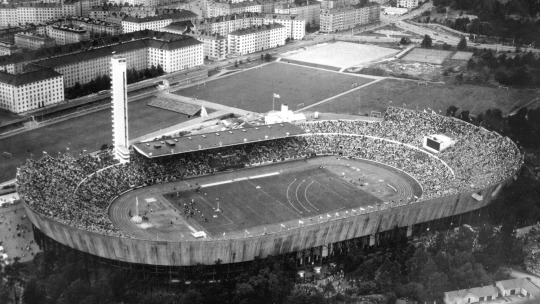
8. Those 1952 Olympics were the first time Coca Cola was introduced to Finns.

9. No, we do not have polar bears.
10. We also don´t have KFC, Wendy´s or Dunkin´ Donuts.
11. Yes I am very upset about all those things mentioned above but especially about KFC.
12. Finland was the first country in Europe which gave women the right to vote (1906).

13. The Finnish language does not separate words such as “she” or “he”. We just use a gender-neutral “hän”, which means “that person”.
14. The national bird of Finland is the whooper swan.

15. Helsinki has the world´s most Northern metro system.

16. Savonlinna hosts their annual Opera Festival in a Medieval castle.

17. We are vindictive and petty as HELL. Just ask Silvio Berlusconi.
http://kmp78.tumblr.com/post/155861218049/finland-chronicles-part-14
18. A Finnish person will drink approximately 129 litres of milk a year.

19. Some years ago, the word for mother (”äiti”) was voted the most beautiful word in the Finnish language.
20. Moomins are, as some of you MAY REMEMBER FROM A SPECIFIC DEBACLE FROM EARLIER THIS YEAR, from Finland and were created by OUR Miss Tove Jansson.

21. Unlike many other countries which after gaining independence tore down all statues and other remnants of their history under foreign rule, in Finland we chose to keep ours up as reminders of our past.
For example, on our main square aka the Senate Square you will find Czar Alexander II standing proudly.
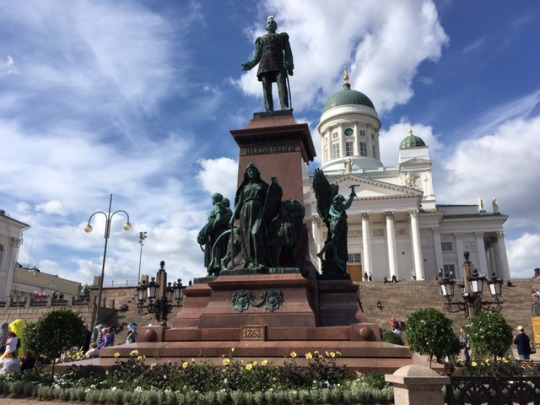
22. And speaking of statues, one of the landmarks of Helsinki is Havis Amanda.
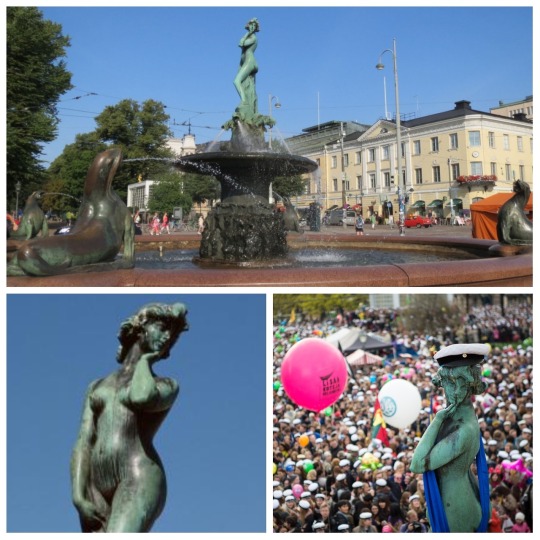
It depicts a mermaid who decides to leave the sea and walk on... well, not water.
Each year on April 30th, she is “crowned” with a cap, to represent all those who have graduated from secondary school and earned their caps.
23. As of 2010, internet access has been a legal right in Finland.
24. Do you have one of those cupboard things over your kitchen sink, the kind where you place your dishes to dry?
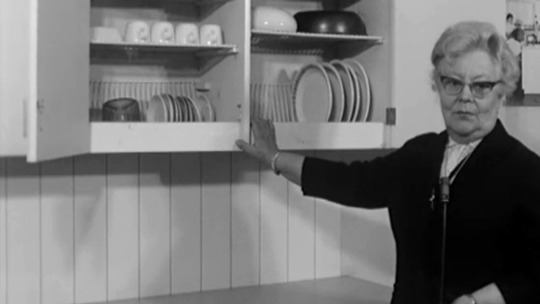
That was invented by a Finnish woman called Maiju Gebhard in 1945.
25. The longest word in the Finnish language is “epäjärjestelmällistyttämättömyydelläänsäkäänköhän”, which loosely translates to “not even by her lack of organization, do you suppose”.
26. Angry Birds are from here.

27. Finland is also the birth place of the most successful ski jump champions of all time, Matti Nykänen.

28. After his sports career came to an end, Matti has been a permanent fixture in the tabloids with his... issues... involving alcohol abuse, domestic abuse (he even served time in prison for attempting to kill one of his many ex-wives) and an assortment of careers including stripping and now singing.
He is also responsible for one of our most beloved and useful quotes of all time: back in the 80s when he was still jumping from towers and competing in Canada, he got into some “situations” and was sent back home as punishment. When he arrived at the airport, a journo asked him “Matti, did you drink alcohol?”, to which Matti replied “Maybe I did drink, maybe I didn´t drink”.
All bases covered then!
The man is a fucking genius.

29. There are absolutely ZERO public payphones anywhere in Finland.
30. For a very short period of time back in, Finland had a female president AND a female Prime Minister.

Sadly that arrangement came to an abrupt end when the Prime Minister was forced to resign over a scandal involving some sort of Iraq documents which I´m still, a decade later, completely baffled by.
31. As those who come on this blog surely know by now, Yours Truly is a passionate berry picker - and being a berry nut in Finland is easy indeed since a) we have one of the cleanest natures in the world and b) all living things you find in nature, you can keep - within reason, of course.

Usually a good principle is to keep about 100 meters distance from the nearest house. Other than that, you´re good to go!
32. People in in Northern Finland aka Lapland area have a very specific unit of measurement called the “poronkusema” which could be loosely translated to “Reindeer´s piss”. Roughly it means the distance a reindeer can walk before needing to urinate. It´s quite a long distance...
33. Our current President Sauli Niinistö is a survivor of the tragic tsunami which took place in South-East Asia on Dec 26, 2004. Over 200 000 people (including almost 200 Finnish tourists) died in one of the worst natural disasters of our time - Mr. Niinistö and his sons saved their own lives by climbing up a telephone pole and staying there for several hours.
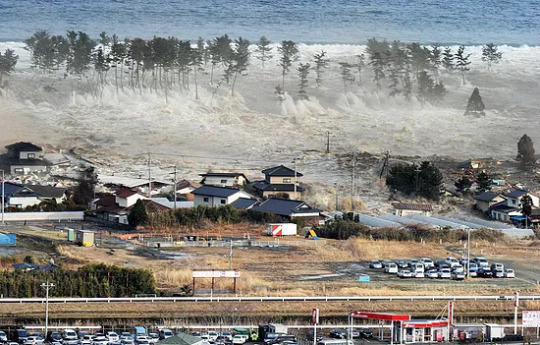
34. In Finland October 13th is National Failure Day which aims to encourage people to share their failures and learn from them rather than hide their heads in shame and pretend all is well.
35. The REAL Santa Claus lives up in Rovaniemi and you can visit his village all year long.

36. Sheldon gave us a good laugh and an ego boost.
youtube
37. We like eating Rudolf with lingonberries and mash.

38. On some years we get A LOT of snow, but on others we get practically none. Back in 1997, in Lapland the snow reached up to 190 cm.
Incidentally I am 155 cm.

39. In the Finnish language there is an alphabet called Å which isn´t actually a part of a single Finnish word in the entire Finnish language - it is simply a remnant from our many centuries spent under Swedish rule.
40. Unesco has reported that Finland´s tap water is the cleanest in the world.

41. A handy Finnish saying: “Early bird catches the worm, but the second mouse gets the cheese”.
42. For some God forsaken reason, Finland and Estonia have the same national anthem.
43. Sadly accurate these days.

44. Sadly accurate these days.

45. Rosina Heikel (1842 - 1929) was Finland´s and in fact the Nordic countries 1st female doctor.
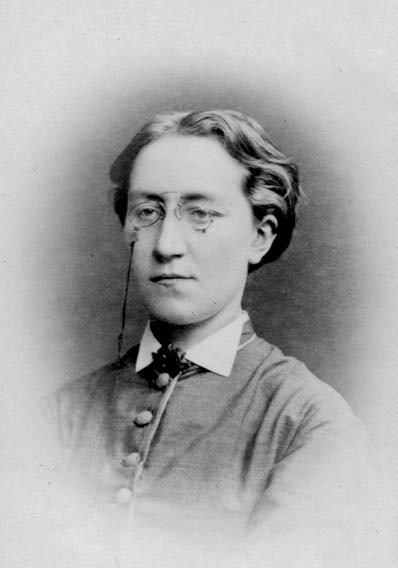
46. When something is a failure/a dud, the common term in the English language is “a lemon”. Over here, it´s “susi”. Susi also means wolf.
47. And susi should not be confused with sisu!
48. In Lapland you can spend your vacation in an igloo.

49. Fines for speeding are determined by the offender´s income. Basically if you earn more, you have to pay more. The highest fines have been over 100 000 €. Stay poor, kids!
50. Pamela Anderson´s grandparents were from Finland.

51. Yes we like getting our drinks on, and most of us go abroad to Tallinn to get our drinks on for a lot less €s.

52. In Lapland, the Sun never rises from November to January.
53. In reverse, the Sun never sets from June to July. We call it “The Nightless night”.
54. Finland has exactly 1 Eurovision victory under its belt.

55. In 2018 Saara Aalto will be repping us.

Please vote for us. Please?
56. Nokia became famous for their mobile phones, but originally they manufactured rubber boots.

57. We don´t dub movies or TV shows.
58. We do however sometimes give them ridiculous and extremely SPOILER ALERT-y names. For example, “The Shawshank Redemption” was translated to “Rita Hayworth - Key to escape”.
I mean... C´MOOOOON!
59. Sometimes that´s all you can do.

60. Simo Häyhä aka “White Death” was one of the deadliest snipers of all time. During a 3 month stretch of the Winter War, he shot roughly 200 Russian soldiers before getting shot in the face himself. He survived and lived to be 96.
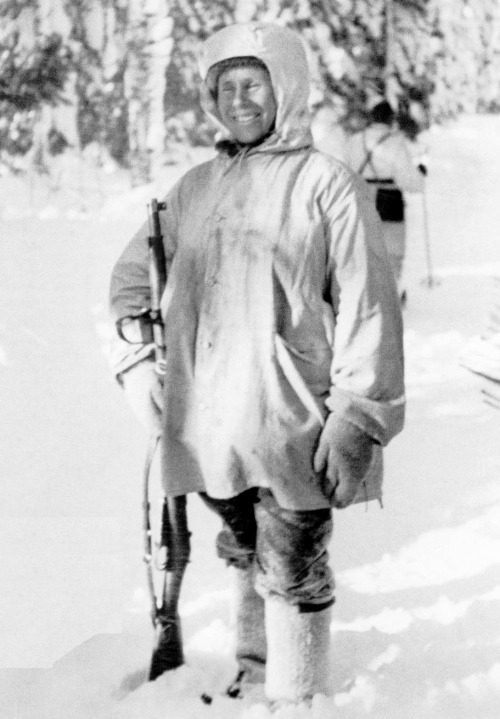
61. We don´t use the 1 and 2 cent coins. You CAN try paying with them as they of course are legal currency, but there are no guarantees you´ll get very far.
62. Feb 14th may be a day for lovers for the rest of the world, but we know it as “Friend´s Day”.
63. Tipping is not (thankfully) a part of the Finnish culture.
64. The guy longing for Sven in Titanic (the coat dude) was portrayed as a Swede, but was actually a Finn called Jari Kinnunen.
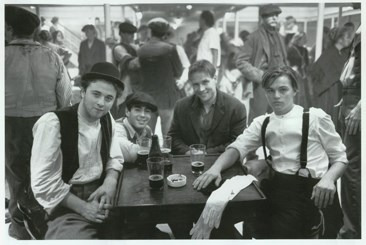
65. Karelian pies with egg butter are the best thing ever.

66. Märket island which is situated between Finland and Sweden had to have the border lines twisted a bit because the Finns who built that lighthouse, accidentally built it on the wrong side...
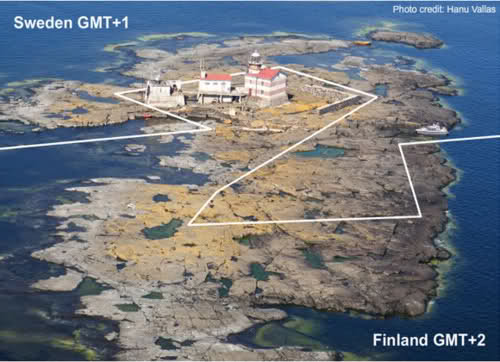
67. While often named as one of the 5 Scandinavian countries, Finland isn´t technically even a part of Scandinavia: we ARE however a part of the Nordic countries.
68. If you are invited to a Finnish sauna, you are expected to go nude.
69. Finnish armed forces are mandatory for men but voluntary for women.
70. Moomin mugs are peculiarly popular especially among Asian tourists. They can sometimes pay even thousands for rare ones.

71. We never had vikings, but there is one viking tale about a princess called Skjalv, daughter of the Finnish King Froste (those aren´t even Finnish names...), who was stolen as war loot to Sweden but ended up strangling her captor with a gold chain.
72. Our 4th president was Kyösti Kallio, who was forced to resign from office after the Winter War on December 19th 1940. On that same day he was about to step onto a train to take him back home for retirement, when during his final official ceremony at Helsinki Railway Station, in front of his soldiers and while the orchestra played, he suffered a fatal heart attack and died right there in front of everyone. Legend says he collapsed into the arms of our greatest war hero and later president himself, Marshall C.G.E. Mannerheim (seen in the white hat next to President Kallio).

73. Marshall Mannerheim is the only person in Finnish history who has been rewarded that particular military honor. In fact, he is and forever will remain the only person who has the title “Finland´s Marshall”, an honor bestowed upon him for his services to his home country during Finland´s tumultuous early years of independence.

A few years ago he was voted by the Finns themselves as the most important Finnish person of all time.
74. In June 1942, Adolf Hitler came to Finland to pay his respects to Marshall Mannerheim on his 75th birthday. As a little “souvenir” for future generations, the sneaky Finns recorded a snippet of his and Mannerheim´s private conversation.
It is the only known recording of Hitler speaking with a calm, normal voice, as he was very particular about only being filmed while screaming and ranting his ideologies.
youtube
75. Roughly 3 million tourists visit Finland each year and I think at least 2 500 000 of them are always going exactly where I´m going too.
76. We like to make things hard for foreigners.
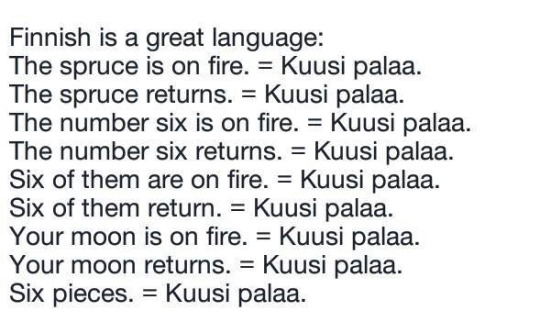
77. We don´t have any mountains.
78. But we have lakes. We have a shit ton of lakes. 187 888 lakes to be precise.

79. FYI

80. All our days end with -tai (Monday = maanantai, Tuesday = tiistai etc.), except for Wednesday. Wednesday is called keskiviikko.
81. We have a lot of free time.

82. J. R. R. Tolkien used the Finnish national epoch the Kalevala as inspiration for the languages in the Lord of the Rings saga.
83. The St. Louis Arch was designed by a Finn called Eero Saarinen.
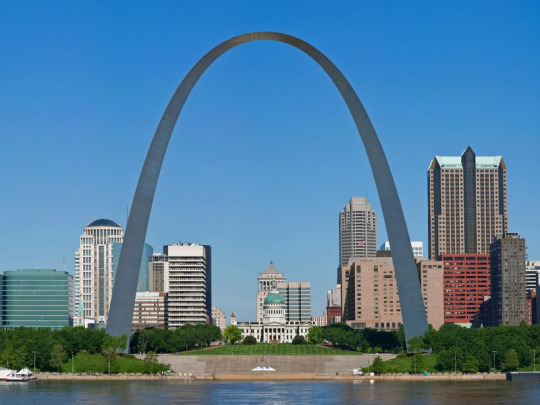
84. Every summer we arrange what is called Kaljakellunta aka “Beer float” which pretty much just consists of taking a floatie and a case of beer and... well, that´s about it.

85. If you want to enhance your sauna experience, you can use a birch whisk.

86. The bubble chair was designed by a Finnish man called Eero Aarnio.

87. Thursdays are the “official” pea soup and pancakes day all over Finland.

88. Finns love queuing.

89. Life expectancy for men is 78 years and for women 84 years.
90. In Tornio you can play golf in two countries:
http://kmp78.tumblr.com/post/155901150914/finland-chronicles-part-15
91. Finns invented the so-called Molotov´s cocktail.

92. All people in Finland must pay a TV tax even if they do not they own a TV.
93. We celebrate Christmas on the 24th of December.
94. Finns love salmiakki aka salty licorice.

I don´t, btw.
95. Finland is one of the few countries in Europe which has not banned sex with animals - and some actually take advantage of that loophole...
http://kmp78.tumblr.com/post/156161829244/finland-chronicles-part-21
http://kmp78.tumblr.com/post/156257574544/finland-chronicles-part-23
96. Armi Kuusela won the 1st ever Miss Universe pageant in 1952.
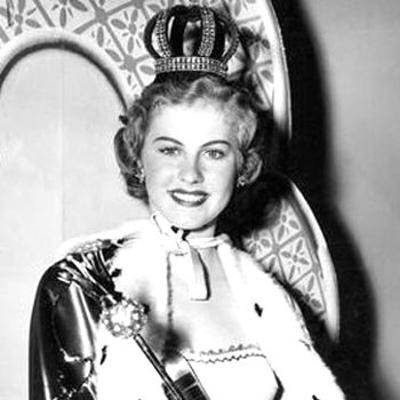
97. In 2006, Conan O´Brian did a sketch about looking like our then-president Tarja Halonen and it ballooned into a huge movement.
youtube
98. Weeeeell...
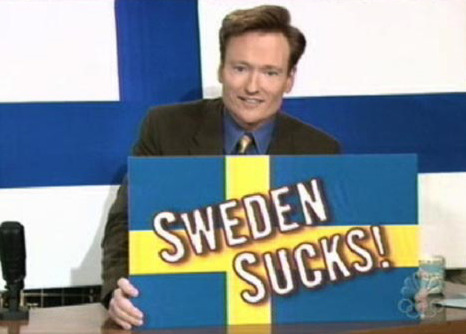
99. On every Independence day, the current president hosts a party at his residence for about 2 000 dignitaries, celebs, politicians etc. We riff raffers sit at home in our sweatpants and watch it on TV with some nachos and snarky comments.

100. MONTY PYTHON KNOWS.
youtube
HAPPY BIRTHDAY, SUOMI, AND THANK YOU FOR EVERYTHING.
Despite you reeeeally getting on my nerves SO MUCH and SO OFTEN, I still love you. 💙 💙 💙
#finland 100#suomi 100#itsenäisyyspäivä#december 6th 1917#thank you#100 facts for 100 years#national pride#also shame for good measure
3K notes
·
View notes
Text
April 7, 2021: 6:07 pm:
===========================================
I just returned from shopping in Dystopia, where socio-terrific conditions are the only law.
I went to AM/PM and Walmart.
At AM/PM Luke’s Arco, the prices of all of the items in the store have increased over the past month by about 20%, and more for some items.
There was a “bait” car at the AM/PM, a car that the terror army can use if they need to set someone up for a fake theft. The bait cars are not easy to spot, but after awhile of seeing them and learning of the ways of the terror army, they are as if they have a sign on them that says: “Steal Me!”,
It was the most painful shopping experience that I can recall. The poison leg symptoms are so very painful that the pain itself is frightening.
The Walmart terror associates did what I suspected they would do to make my life more difficult and painful, they took the items I want to buy off of the shelves, as they do often, but this time they took all of the vitamin E gel-caps off the shelf, then as I was searching for it, they sent a female terror soldier complete with entire family terror cell to block access to that area where the vitamin E is located, and, the terror family cell had an accomplice who showed up for the purpose of engaging in a Walmart Customer Pow-Wow, again, to block access to the vitamins, and since the Walmart terror associates know what my leg condition is, they made sure I was hurting more than was necessary in many parts of the store.
There was one bottle of the vitamin E in the wrong place, backwards on the bottom shelf, I was fortunate to have found it, as the vitamin E gel-caps are very helpful for dealing with this condition on my leg.
Items they removed that I always buy:
Very Vanilla flavored Silk brand Soy Milk.
Jimmi Dean Hot! flavored sausage.
Two-pack carton of 18 count eggs.
Folgere’s Colombian Coffee.
Marshmallow cookies.
And other stuff. There is always someone who is there to block access to the things I want, the terror soldiers anticipate my route through the store, and they swoop in on the aisles that have the items I want, and tend to huddle around, acting oblivious to the idea that somone else also wants to get something from that shelf. Those blocking conditions have been going on for many years, not just at Walmart, the terror army teams up that way at all of the grocery stores, and stores where other products are sold also. I think they do that to try to provoke a response that can lead to a set-up in association with the imposter police. And of course, a huddle of terror soldiers in the aisles is oportunity to prime a marked victim with plenty of nitrous oxide gas for easy to capture prey at the check-stand later on.
There is always some kind of malfunction with the debit card reader or with the self-check out, something that requires a store associate to come to the register. That makes opportunity to shoot the costumer with a .25, and then they offer first aid to the people they shoot, while blaming someone else. Today, it was the bananas that caused the malfunction, and when the terror associate came over to the register, somehow she knew my name, and, she said to me: “You are not dead?” then I asked “what?”, and the reply was: “we thought you were dead” so I responded with: “not quite, just give it some time, you should not have to wait much longer.” I recognize the gal that came to the register from some other place than Walmart, but I cannot place the gal at this time. That same Walmart terror associate, a yellow vested one, asked or said to me: “You took out Syn & Deb?” to which my response was something like: “I did not purchase any Syn & Deb products today”
If anyone wants to know more about Syn & Deb, please provide me with a national security interview so we can talk about the details of terror take over of USA and other parts of the world.
Other interesting Walmart activity is they removed the McDonald’s from the Walmart. As I reported before, that McDonald’s uses a black sign with yellow arches, is not a real McDonald’s sign they had hanging on the wall above the McDonald’s, is gone today. There were men taking the McDonald’s apart, and they started by taking down all of the signage and McDonald’s corporate colors.
The pain today was so intense that I forgot to get the hydrogen peroxide, and that is the primary reason I went to the store today, the pain is so intense that I am not able to think clearly, and that goes beyond the nitrous gas they use everywhere. The Walmart terror associates actually stationed a terror representative at the aisle where the peroxide is on the shelf, the terror associate was seated in a chair opposite the hydrogen peroxide at the end cap, but the chair and terror soldier were seated completely within the aisle, waiting to see who is going to buy some peroxide today.
Walmart parked a American Medical Response Intensive Care Emergency Vehicle out front next to where I parked, just to make sure I saw it, and everyone is aware that US citizens cannot get medical treatment in Oregon. The AMR truck was for “Add some insult to the injury” terror, it’s a SAG terror tactic designed to reduce a persons morale, is a “Chip away at the Stone” terror tactic. There are hundred of the “Insult to Injury” news items presented on Twitter every day.
I saw someone who fits the description of Sterling Chartrand on my way home, he was at the Chartrand terror cell, but could have been an imposter in make-up.
Every once in a while I see someone at my driveway gate, they take the gate off of the thing it rests on and jump up and down on the gate, then put it back on the support block that keeps the weight off of it when it’s closed. Today the gate is dragging on the ground when I open it up, I have to carry the weight of the gate now, while trying to find a time that it would be safe to repair the gate without Monroe terror cell shooting at me. Some asshole bent the gate to make my life that much more difficult.
I have not seen Sterling Chartrand around here for a long, long time. He is very difficult to get a look at, stays out of sight all of the time. Sterling Chartrand has a number of signature characteristics among the terror army, he has an attack disguise costume that is made of a deer. He made the costume from a dead deer, and when he wears the costume, it makes him look like the mythical creature called a Pan. part human, part hooved animal. I have seen Sterling Chartrand use many different kinds of disguise costume camouflage, all of them were deer costumes of one configuration or another, but the Pan costume is really very stealth. it’s an amazing thing to see, and is dangerous to get close to. Sterling is about 19 years old, super skinny, about 130 pounds, about 5′11″ tall has bushy, curly brown hair, and looks a lot like his mother Jenifer Chartrand did, they both resemble Bob Dillon.
That is all I want to say for now, I am hurting too bad continue.
==============================
10:08 pm:
Those increased prices I mentioned at the AM/PM store looks like a response to terror marching orders presented on Twitter with the news story about baseball and moving the all star game from Georgia to Colorado. The way it translates, and the what little I overheard about it, seems to be that the orders from “On-High” are to increase prices across the board on all merchandise and services as part of the next phase of the global terror take over being advanced by Screen Actor Guild and Britain. There is a “Star Buck’s” connection to the terror orders to increase prices dramatically, but I have forgotten where I saw the Star Buck’s connection beyond the All Star Game that leads to the orders and how Star Buck’s is part of the decode information.
What I learned today, is the act of going from Georgia to Colorado is a “Hiring act”, as to raise elevation, and I don‘t think the orders are limited to prices gaining elevation.
The words on a sign at a store front that says: “now hiring” is a nod to those terror orders, it means that the place where the “now hiring” signage was placed, is a leading model of how the “Hiring of Elevation” will be done. So, at AM/PM there is such a sign that says “now hiring” out front of the store, and indeed the prices of the products were sky high compared to a few weeks ago.
It’s notable that there was only one car in the drive through line at the Star Buck’s store across from AM/PM, and that is very, very unusual. That Star Buck’s always has more than twenty vehicles in the line waiting to pay eight dollars for a cup of coffee.
The terror bastards are going to price the remaining US Citizens into a riot, where the cost to survive is going to exceed the income of the vast majority of US citizens, and since the terror army does not have to pay for their sustenance, the terror army won’t be adversely affected in any way. As it stands now, the terror army is not affected at all by hardships caunsed by the so called Corona Virus, for the same reasons, the terror army is fully supported by the SAG/Britain leadership.
Too Big To Fail is what the terror army is funded with.
“now hiring” is the call to raise the price to live for non-terror citizens.
That is another example of why Twitter must be taken offline forever. The marching orders are commanded from the news media stories presented on Twitter.
not one thing can be done to combat the global take over unless Twitter is removed from view of the terror army in the field.
0 notes
Link
"That wasn't flying. That was falling with style!" Sheriff Woody will continue to be a popular voice among audiences of Pixar's Toy Story films. From Buzz and Woody's budding friendship to the sweet romances the toys find, Pixar introduced everyone to the world of a toy. Each character has their own unique mannerisms, but their perspectives and personal experiences differentiate the toys from one another.
RELATED: Toy Story: 10 Easter Eggs You'll Only Notice On Your Second Viewing
Some of Andy's toys have a little more knowledge than others, based on what they've lived through with different owners or even not having any other owner aside from Andy. Since everyone's favorite toy bunch gets themselves into trouble throughout all four of the films, it's easy to see where each toy's weaknesses and strengths lie. Some are clearly a little wiser than others and their intelligence can be fairly judged when considering their actions throughout all the films.
10 Mrs. Potato Head

This character is the ultimate sweetheart and the traditional caretaker of the group. Mrs. Potato Head isn't as intelligent as most other toys though, but it could be because she simply doesn't have as much screentime as other characters.
However, her impulsive and boisterous reactions do lessen her intelligence factor. In Toy Story 3, she freaks out and complains that Andy threw them away, and doesn't try to fully listen to Woody when he tells her what really happened.
9 Rex

The sweet and adorably innocent dinosaur is just not the smartest of Andy's toys. Perhaps if he was given more screentime in the four films, he could have had a chance to show some more intellect, but he is at the bottom of the intelligence list, for now at least.
Rex is overall oblivious, which results in his clumsiness. His vocabulary is actually pretty strong, but his aloofness is his prime obstacle. This trait causes him to catch up to plans a little too late.
8 Sarge & The Green Army Men

Andy's "Bucket 'O Soldiers" are the "professionals," as Woody dubs them, as they're the spies for the toys to see what's going on outside of Andy's room. They're of huge importance to the toys. Without them, the others would have a hard time preparing for when the humans run into Andy's room.
RELATED: Toy Story Meets Monsters, Inc.: 5 Friendships That Would Work (& 5 That Wouldn't)
But since Sarge and the soldiers are mainly focused on muscle work and missions, they don't have ample time to explore their knowledge. With all the experience they have as toy soldiers, they've truly been through a lot, and so they must have some brains when it comes to certain things aside from battle tactics.
7 Buzz

The favorite funny, charming, and calculative spaceman, Buzz Lightyear does have some intelligence to him, apart from certain moments in the movies. He's pretty knowledgeable about space travel, as his vocabulary sounds educated and well-trained.
Since education doesn't guarantee emotional intelligence, though, Buzz stumbles upon a few dumb incidents, like when he initially thinks he's really an astronaut and not just one of the millions of toys in the "Buzz Lightyear" brand. There's also the period of time when he thinks he can fly, which Woody consistently attempts to debunk. He definitely improves over time with regards to his awareness, but he still sometimes doesn't catch onto an idea or observation as quickly as the others do.
6 Mr. Potato Head

The Brooklyn-accent, tough-guy character comes across as extremely cynical and irritable, but his loud-mouthed behavior can sometimes be helpful. Rather than dwell on how limited he can be as just a potato with some body parts, Mr. Potato Head goes above and beyond in the third movie when he uses a tortilla to reattach his body parts to escape the sandbox.
What's even smarter is when he improvises after a bird eats the tortilla and he grabs a cucumber instead. His improvisation skills prove that he is a somewhat smarter character in the bunch.
5 Hamm

Hamm is way more than a piggy bank filled with coins. This character has a different element of intelligence in comparison to the others in Andy's room. Even Andy feels that he should call him "Evil Doctor Porkchop" in the game that he invents when he's a kid.
RELATED: Toy Story: Bonnie's Toys Ranked, By Likability
Hamm can change television channels rather quickly, emphasizing how observant and fast-thinking he can be. He also is the main toy to hypothesize aspects about the evil bully, Sid. Hamm is also the first to tell everyone his gruesome observations about Sid and is able to speculate reasons as to why Sid is home, for example, and what they're going up against since Buzz and Woody do indeed have a face-off with Sid. Without Hamm, the toys possibly wouldn't be informed of a lot of vital information they need throughout the films.
4 Jessie

Jessie is always up for an adventure since she became accustomed to life as an owner-less toy before Toy Story 2. The cowgirl proves to be fearless and defensive when she participates in the various schemes throughout the movies. However, it's her anxious and traumatized nature from her past life that sometimes gets in the way of her intelligence.
Jessie brings up her traumatic loss of her first owner, Emily, in the third movie when everyone starts to believe that Andy trashed them (literally). Jessie can get freaked out easily, but her intelligence isn't completely hindered by this and she's always ready to jump into something new, like when she tells Andy's toys that they can just live at Sunnyside Daycare instead of struggling to live on their own. While she clearly doesn't know what terrible things would happen at Sunnyside, her quick-thinking skills can actually help the whole gang.
3 Woody

As the original leader of the toy pack, Woody's wisdom derives from his years of experience as Andy's favorite toy. His ability to lead appears in several ways, such as his skills in calming everyone down when they're anxious about a new toy at Andy's birthday party.
RELATED: Every Easter Egg In Toy Story 4
The only way that Woody is weakened, in terms of his intelligence, is how he isn't as experienced as some other toys in the outside world. The first two films present him as a strong voice for the toys, but his initial fear of losing Andy sometimes clouds his brain. All in all, though, the sheriff's leadership skills validate his overall intelligence.
2 Slinky

Slinky is an underrated character and might be misconstrued to be one of the least intelligent in the group, but he's actually, on the contrary, one of the smartest. His placid demeanor allows his ideas to flow more easily than other toys, as a lot of them become quickly anxious.
Slinky is the one to get the Scotch Tape to help Woody fend off the monkey and the one who allows the toys to use him as the bungee cord when springing themselves off of high surfaces. He's "got a spring in his step" after all because he thinks of smart, helpful, and viable ways to help the whole group move forward with a plan.
1 Bo

Bo (short for Bo Peep) is the most intelligent of all the toys. Although fans know she is no longer a part of Andy's room, she once was and she experiences a lot of intimidating events in the fourth film. Bo shows Woody the ropes of the reality out of a child's bedroom and teaches him that a toy should experience the world outside a single child's ownership. Her courage and instinctual actions when she accepts that Molly (Andy's sister) lets her go prove that this character is full of knowledge and wisdom, aside from mental and physical strength.
Bo is clearly adaptable to her environment, such as how she can easily move and climb throughout the carnival park in the fourth film and adaptability takes a specific mind. Bo is evidence that a "lost" toy isn't really lost if they find their own way, without relying on a child to own them.
NEXT: How Toy Story Established Pixar's Storytelling Style
Toy Story: Andy's Toys, Ranked By Intelligence | ScreenRant from https://ift.tt/2O893Cd
0 notes
Text
Soda Dungeon 2 Cheats
Soda Dungeon 2 Guide

Soda Dungeon 2 manual has been released. Additionally, whilst he reaches segment 2, you simplest need to worry about aoe recovery after that. Always placed enemy: has essence -> ransack on the pinnacle of your script. Literally doubles your essence income. Also, use the hunt characteristic. Some bosses gets you caught, so seek and see what others did to kill them. Lots of information about boss techniques, birthday celebration comp, scripts, etc all inside the seek feature. I might want to know more about crew compositions for one-of-a-kind conditions (eg. Visit settings > manage programs > choose app > permissions > furnish permission - open "data" forder and locate your packpage name recreation you need to kepp account (example: com.tencent.ig). 4. back to file supervisor, unrename your packpage you renamed in step 2 ( examination : "com.tencent.ig.keepdata" -> rename it to "com.tencent.ig"). Soda Dungeon 2 is a sequel to a fab position-gambling undertaking with an vintage-college performance, a a laugh function, lots of humor and thrilling gameplay. The principle man or woman still has a tavern in which they put together and serve a fantastic drink that captured the hearts and flavor buds of all brave warriors combating evil. With its near-perfect development system and bite-sized gameplay, no longer to mention likely the maximum fair free to play fee model we would ever seen, soda dungeon changed into a perfect little slice of fun for cellular and we loved it in our unique evaluate from lower back while it released. There were some of pleasant content updates to the game on the grounds that then too, but what fanatics simply had been wanting to recognise is when can we ultimately get our arms on Soda Dungeon 2? Naturally, this antagonist of this tale has locked away all manners of riches, loot, and different sweets deep in the bowels of his citadel. Of route, getting a preserve all this treasure could be no clean feat when you consider that it's miles guarded with the aid of a by no means-ending collection of monsters, undead soldiers, and traps. Players will lease different soda-addicted squaddies that hold out inside the tavern and ship them out to have a tendency to some missions, even whilst they're afk. Then, the loot that changed into garnered can then be used to accumulate a custom; town, taverna, and extra effective individuals for the birthday party. The overall tale in soda dungeon 1 become fairly ordinary, you may shuffle the bosses in any order and it would not honestly have an effect on the end result. Soda Dungeon 2 has at least a touch thread of consistency, a tiny bit of person development. You have interaction with the townspeople a bit greater, sometimes the bosses send you letters in the mail, and many others. Don't set your expectancies too excessive, soda dungeon changed into by no means intended to have a deep tale. However..! I personally enjoy the little world we made for the brand new recreation greater than the original. In case you are transferring from one platform to another (ios to steam as an instance), you want to get a one time switch code on the first device and then load it on some other. If you are moving between specific gadgets at the equal platform it is better to use google force (for android gadgets) or sd server alternative. To begin with, make certain you've got enough hp to continue to exist. If you are demise you would possibly want to degree your hp relic a touch bit extra. Soda dungeon is a turn-based totally dungeon crawler where you recruit a team of adventurers to raid dungeons on your behalf. With the loot they locate you will increase your metropolis, attract higher heroes, and find out just how deep the dungeon-hole goes. Experiment with self assurance - blend and match training, try out masses of gear, and ship them off to combat. But fear now not, all of us comes domestic secure with all your tough-earned loot. Defeat is simply part of the sport 🙂 loose and truthful - everything may be earned with in-game forex. You need to do your high-quality to take gain of this selection most of the time so that you can pass even similarly to gather more cash, unencumber greater objects, and take gain of the random chests and deform gates you come across. • occasionally it is really worth beginning your party from the first actual ground of a dungeon a couple of times for the duration of a whole play consultation - that way, you can farm an entire bunch of greater cash on your everlasting tavern upgrades before you head off to the subsequent size. And maximum of all, preserve that ad Gold enhance option on at all times. • as you whole various dungeon runs, you will rack up the cash needed to make some important purchases back at your own home base. You can additionally accumulate cash just via gathering them from your free refill. As some distance as what enhancements you should prioritize over others, you need to make sure you purchase the following objects earlier than you head into the next measurement - a couple of stools, a couple of tables, the bed, and a few kitchens. Soda Dungeon 2 - sequel to the a success rpg on fable subject matters, in which the participant will once again manage the moves of the mercenary characters sitting within the tavern. Within the story the lord of darkness seized all valuable artifacts and for that reason carry the arena to the threshold of destruction. To defeat him you need to lease brave heroes, who will visit risky campaigns. At that time, because the characters will fight monsters and earn treasure and loot, the gamer has to control its institution. This time round, you could assume large, trickier bosses than ever before, even though the middle motion is said to stay very approachable. "the thing i am maximum excited (and additionally anxious) for is seeing the reaction from lovers of the first sport," said shawn tanner, lead programmer on Soda Dungeon 2. "gameplay is prime, and i understand if the returning players approve then we did it proper." The ones looking for a few accurate-humoured dungeon crawling action will discover Soda Dungeon 2 available for download now as a free-to-play game from over at the app save, google play, and steam. The use of this selection primarily acts as a sport reset that places all your soda purchases/warrior unlocks again to its initial nation. • earlier than you head off to the following size, pour all your leftover coins into trying to buy new tavern enhancements when you consider that they stick round during every new dimension run. You may need to move into a new dimension with one essential tavern upgrade or before you take on the challenge of a new dimension's dungeon. Keep in mind that enemies get even stronger after every 100 floors are completed within a new dimension.
0 notes
Text
A look back at UNIT Adventures
In the short time I’ve been back into roleplaying games, I’ve had three different groups that met for regular sessions. Right now it’s the Monthly Crawl (Dungeon Crawl Classics), and before that I had a group for the Star City Heroes campaign I wrote about previously. But the very first group I formed after moving to Texas was for the Doctor Who roleplaying game, Adventures In Time And Space.

Adventures In Time And Space does a great job of capturing the spirit of Doctor Who. For example, initiative isn’t determined by a statistic or a dice roll like in other games. Instead, it’s based on what you’re going to do on your turn. If you’re going to talk, you go first. If you’re going to fight, you go last. In between, there are turns for people who are going to do something (like try to open a door with their sonic screwdriver) or run away. It’s a simple change, but it’s fundamentally Whovian to say that the people who will talk their way out of trouble should get to act before the ones who would shoot at stuff.
After reading through the core rulebook I did a couple of test sessions with friends, but I was itching to get a regular game going. However, the very same qualities that make Who so appealing as a viewer (that its stories can be set literally anywhere in the universe, at any point in history) made starting a Doctor Who campaign daunting. I wasn’t even sure which Doctor to use, as my own tastes run more to Classic Who but prospective players may only have seen the new series. I needed a setting that was a little bit limited in scope but offered all of the fun of the Doctor Who universe.
Enter, UNIT.

Some of my first episodes as a kid were ones featuring the United Nations Intelligence Taskforce, so I’ve always had a soft spot for Earth-bound stories of alien invasions and mad scientists. Having my players be members of UNIT would allow me to keep the world familiar but pull from Who’s extensive history for my villains and threats. I chose 1985 for the setting, making the PCs a new team that found themselves working for a post-Lethbridge-Stewart organization many thought was past its prime (a major subplot involved a member of parliament who wanted the UK to pull out of the organization). Rather than spending a lot of time on character creation, I created a handful of PCs for my players to choose from. Upon arriving at our first game, I asked each person if they wanted to play a soldier or a scientist, and if their character was male or female. Based on their answers, I handed out character sheets. The team became:
Tamsin Devereaux, a brilliant young scientist who joined UNIT because of her teenage crush on the Doctor
Alec Harford, the grizzled commanding officer who hates the Doctor (he lost a lot of good friends during the years he was their scientific adviser) and is secretly in love with Tamsin
Inessa Deminov (aka Domino), a Russian soldier who joined UNIT after witnessing a Terileptil ship crash in Afghanistan
Robbie Barnes, an adrenaline junkie medic who drives fast and talks faster
Penny Farthing, secret agent with a mysterious past (a cat burglar from the twenty-first century, the Seventh Doctor hid her in the 1980s and occasionally asks her for favours)
In series one, the team met the Doctor (first a fake Third Doctor, and then the real Fourth), learned of a mysterious group that was essentially the evil version of UNIT, and saved the world from the resurgent WOTAN (last seen in the First Doctor story “The War Machines”). Before that game, the player running Harford told me he had to drop out due to scheduling conflicts. We agreed to have the character go out in a blaze of glory -- right after confessing his feelings for Tamsin.
In series two the team got a new leader (Jonas Kilpatrick, a paper pusher who finds his courage when forced to join the team in the field), traveled to a parallel universe where they fought alongside the King Arthur mentioned in the Seventh Doctor story “Battlefield”, and matched wits with the Master himself.

The finale saw the team thrown into the past, where they got to meet a the famous Brigadier and work alongside a younger version of their old friend Alec Harford. Now knowing his true feelings for her, Tamsin chose to stay behind to be with Harford and become UNIT’s scientific adviser (she was there waiting for them upon their return, a decade older and ready with a plan to help the team save the world).
After two successful seasons, UNIT Adventures went on hiatus so I could come up with some new stories. But then I got the idea for Star City Heroes and started that up (with mostly the same group of players).
It’s been almost two years since we wrapped up UNIT Adventures, and I’m feeling the pull of the Doctor Who roleplaying game again. This time I want to try an actual Doctor and companions campaign. I’ve put out feelers to my old UNIT Adventures players to see if they’re interested. Hopefully I’ll have a brand new Doctor Who campaign to write about here down the line.
#Doctor Who#UNIT#Adventures In Time And Space#roleplaying games#RPGs#The Master#The Doctor#The Third Doctor#The Fourth Doctor#The Seventh Doctor#United Nations Intelligence Taskforce#The Brigadier
1 note
·
View note
Photo

Ben Kingsley and Josh Hartnett and Hera Hilmar surely would not have signed on to star in The Ottoman Lieutenant if they even imagined they would be parties to genocide denial.
And screenwriter Jeff Stockwell—who is by every indication a very decent person—says that everybody he spoke to in connection with the making of The Ottoman Lieutenant was aware of the Turkish government’s longtime denial of responsibility for the deliberate murder of 1.6 million innocent Armenians.
The movie—which came out in March and is reported by the website Box Office Mojo to have taken in less than $250,000 in American theaters despite its big-name cast—indeed has a scene where Turkish soldiers are herding Armenian civilians on a death march, complete with summary executions.
But the soldiers are a ragtag bunch whose leader has been killed and who seem to be acting out of the savagery of war, not on orders from their army’s most senior commanders.
And the horror is interrupted by the gallant Turkish lieutenant who is the movie’s hero, having earlier prevailed in a love triangle where he was in contention with an American missionary doctor for the heart of a young American nurse. Romance turns to tragedy as the lieutenant is mortally wounded while saving innocent Armenians.
“I knew about the incredible tensions arising out of the Turkish government’s refusal to acknowledge the genocide,” Stockwell told The Daily Beast, adding in parentheses the name Orhan Pamuk, the Nobel Prize-winning novelist who was criminally charged and ultimately convicted of “insulting Turkishness” for a 2005 remark about how 1 million Armenians and 30,000 Kurds had been massacred in Turkey, though he did not use the word “genocide.”
Stockwell went on, “So the producers and I had several discussions about the film story not contributing to that, even as it was going to be partially built around a sympathetic Turkish soldier character. The take was: it’s 1914—it’s a horrific humanitarian crisis unfolding all around—and our naive leads are there, drawn to each other, even as they’re trying to make sense of what’s happening, their relation to it and response to it.”
The director of The Ottoman Lieutenant, Joseph Ruben (“The Forgotten”) did not respond to a Daily Beast request for comment. Nor did the producers. The lead American producer, Stephen Joel Brown (“Seven”), did speak to The Washington Post, insisting that The Ottoman Lieutenant has no particular political view and is “a classic love story, set at a time and place that we really haven’t seen in cinema.”
Brown also spoke to the Turkish outlet, Hurriyet Daily News.
“As objective and respectful to common sufferings of both Turks and Armenians, we wanted to show the audience what happened during World War I in Eastern Anatolia, a subject that has not been handled before,” he was quoted saying.
Imagine if a producer said he wanted to show “common sufferings” of both Germans and Jews during World War II.
At least a year before Stockwell was brought in to write The Ottoman Lieutenant, another script was in the works that not only handled the same subject but told a much fuller and truer story of what happened during World War I in Eastern Anatolia.
That result was The Promise, starring Christian Bale, Oscar Isaac, and Charlotte Le Bon, to be released this month. This movie sticks to what is widely accepted as historical truth virtually everywhere but in Turkey. It rightfully holds Turkish officials responsible for explicitly ordering the slaughter correctly termed the Armenian Genocide.
The Promise is from co-writer/director Terry George. He also wrote and directed Hotel Rwanda, which was about genocide in that African country. George’s latest movie—written with Robin Swicord—is no less historically accurate and damning to the actual perpetrators.
Stockwell told The Daily Beast, “I had no knowledge of The Promise until long after I was off the project, when it was reviewed at the Toronto Film Festival last fall.” He allows that there “was definitely momentum in place on this project,” adding, “I came on in the spring of 2014, with a clear sense that the producers hoped the movie’s release would be part of the 100th anniversary of Turkey’s involvement in WWI.”
If marking the centenary was the producer’s hope for The Ottoman Lieutenant, they would have needed to get a finished script, cast the movie, shoot it, edit it, and release it by that August. The anniversary passed three months before Stockwell’s work was done.
“The Promise and beating it to release was never mentioned to me,” Stockwell said, adding in parentheses, “I have read the recent comments that this project was generated to somehow to beat The Promise to the screen—but I don’t know why, if that was the case, they wouldn’t have told me. Producers generally use info about ‘competing’ projects as a goad to working faster.”
Stockwell reported that he finished his work on the project in December of 2014, “and, after that, was out of the loop.” He says that the Turkish producers he dealt with “did have plenty of input on the bones of the story—the core nature of the three leads and the give-and-take between them. And the producers wanted the story to take place at the mission in Van, in the months leading up to the Van uprising.”
He added, “It was a Turkish production, with a sympathetic Turkish character as one of the leads, so I knew that was a potential problem in the larger political context. And I knew the story would involve moments of Turkish perspective (for instance, their deep fear about the Russians coming in, the claims of Armenians working as bandits, the sense that Turkish villagers perished too.) But I hoped that the Turkish soldier’s character arc—his ability to see that what was happening was unsettling and terrible, his acting against it and, in the end, giving up his life for acting against it—would make it clear that what was taking place with the Armenians was sickening and wrong. (I hoped!)”
The problem is that the “Turkish perspective” is essentially genocide denial. The Van uprising was not a rebellion as Turkish authorities described it then and continue to describe it now. It was a desperate act of defense against extermination akin to the Warsaw Ghetto uprising against the Nazis.
And, like the Holocaust, the killing of the Armenians was not just “taking place.” It was not simply “a horrific humanitarian crisis unfolding all around.” It was a premeditated crime against humanity perpetrated on the explicit orders of the Turkish government.
Stockwell seems to have had only good intentions and the same may be true of Brown, but the involvement of ES Film suggests that The Ottoman Lieutenant may not have been just another example of Hollywood being Hollywood. Stockwell says that the only Turkish producers he dealt with were with Yproductions and that he was unaware ES Film—also known as Eastern Sunrise Films (“From the east we rise upon the world, where the sun rises the first.”)—co-produced The Ottoman Lieutenant.
“No, I had no knowledge of ES Film until I saw its logo on the finished film a few weeks ago,” Stockwell said. ES Film is based in Istanbul and its co-founders include Yusuf Esenkal, who is said to be a business partner in other ventures with Bilal Erdoğan, son of Turkish President Recep Tayyip Erdoğan. The younger Erdoğan has been accused by Russia of trading in oil with ISIS and is being investigated by Italy of laundering massive sums of money there, all of which he has denied.
ES Film’s other projects include a Turkish TV series called Payitaht Abdülhamid. And, just by reading the subtitles on the first episode, you would almost think it was produced by an upscale ISIS, minus the beheadings.
“From Gibraltar Island to Java, one nation, no borders,” the supreme leader intones to his devoted followers. “A nation that has faith in God; one nation; nation of Islam.”
He goes on, “A nation that doesn’t bow their head, a nation that lives under the flag of the Caliphate.”
He continues, “A clear white sky where call to prayers never end. Fertile lands that are nourished by the rivers. A military equipped with the latest technology… Army of mercy during peaceful time, and army of death during war.”
He concludes, “This is my dream. This is my supreme state.”
He warns, “If any of you lied or betray this path, leave this room now. May I swear on all the verses of God until I breathe my last, until I am buried in the grave this mission is our duty.”
He declares, “The war has begun.”
Only the words are not in Arabic, but in Turkish. And the men are not in jihadist attire, but in that of the Ottoman Empire in the late 19th century. And the caliph is not Abū Bakr al-Baghdadi, but Abdulhamid II, the last sultan of Turkey.
Abdulhamid II—often referred to as simply Hamid—was also the perpetrator of the first wave of mass killings that were the lead-up to the Armenian genocide. The slaughter sparked international outrage and he was branded “The Red Sultan.”
“The Great Assassin,” former British Prime Minister William Gladstone also called him.
But the sultan of the show Payitaht Abdülhamid is not monstrous. He is magnificent, a symbol of greatness to those who yearn for a return to the time of empire.
“Witnessing the struggle of the country with Sultan Abdülhamid Khan, the series promising to be presented as a gift to the children of a powerful nation who is carried on day today and to our future history, ‘Struggle!’” reads a Google translation of a review of the series in AKSAM News.
The actual facts of the Armenian genocide and Abdul Hamid’s role in it are put forth in the book Ambassador Morgenthau’s Story. Henry Morgenthau—grandfather of legendary Manhattan prosecutor Robert Morgenthau and noted historian Barbara Tuchman—served as the American ambassador to the Ottoman Empire. His memoir describes Abdul Hamid as “the man who was chiefly responsible for the massacre of hundreds of thousands of Armenians.”
“Abdul Hamid apparently thought that there was only one way of ridding Turkey of the Armenian problem—and that was to rid her of the Armenians,” Morgenthau writes. “The physical destruction of 2,000,000 men, women, and children by massacres, organized and directed by the state, seemed to be the one sure way of forestalling the further disruption of the Turkish Empire.”
Morgenthau goes on, “For nearly thirty years Turkey gave the world an illustration of government by massacre. We in Europe and America heard of these events when they reached especially monstrous proportions, as they did in 1895-96, when nearly 200,000 Armenians were most atrociously done to death. But through all these years the existence of the Armenians was one continuous nightmare. Their property was stolen, their men were murdered, their women were ravished, their young girls were kidnapped and forced to live in Turkish harems.” Morgenthau further reports, “Yet Abdul Hamid was not able to accomplish his full purpose. Had he had his will, he would have massacred the whole nation in one hideous orgy.
“He attempted to exterminate the Armenians in 1895 and 1896, but found certain insuperable obstructions to his scheme. Chief of these were England, France, and Russia… It became apparent that unless the Sultan desisted, England, France, and Russia would intervene and the Sultan well knew, that, in case this intervention took place, such remnants of Turkey as had survived earlier partitions would disappear. Thus, Abdul Hamid had to abandon his satanic enterprise of destroying a whole race by murder, yet Armenia continued to suffer the slow agony of pitiless persecution.”
Hamid was deposed during the Young Turk Revolution of 1908. The Young Turks moved to institute a multi-party democracy and spoke of tolerance and justice. These noble notions did not extend to the Armenians.
“The Young Turk regime, despite its promises of universal brotherhood, brought no respite to the Armenians,” Morgenthau writes. “Much as [the Young Turks] admired the Mohammedan conquerors of the fifteenth and sixteenth centuries, they stupidly believed that these great warriors had made one fatal mistake, for they had had it in their power completely to obliterate the Christian populations and had neglected to do so. This policy in their opinion was a fatal error of statesmanship and explained all the woes from which Turkey has suffered in modern times.”
The Young Turks decided it was unnecessary to murder all the Armenians.
“The most beautiful and healthy Armenian girls could be taken, converted forcibly to Mohammedanism, and made the wives or concubines of devout followers of the Prophet. Their children would then automatically become Moslems and so strengthen the empire,” Morgenthau writes. “Armenian boys of tender years could be taken into Turkish families and be brought up in ignorance of the fact that they were anything but Moslems. These were about the only elements, however, that could make any valuable contributions to the new Turkey which was now being planned. Since all precautions must be taken against the development of a new generation of Armenians, it would be necessary to kill outright all men who were in their prime and thus capable of propagating the accursed species. Old men and women formed no great danger to the future of Turkey, for they had already fulfilled their natural function of leaving descendants; still they were nuisances and therefore should be disposed of.”
Thanks to an alliance with Germany, the Young Turks felt free to commit genocide without outside interference.
“Unlike Abdul Hamid, the Young Turks found themselves in a position where they could carry out this holy enterprise,” Morgenthau writes. “Great Britain, France, and Russia had stood in the way of their predecessor. But now these obstacles had been removed.”
And, mass murder was often accompanied by state-sanctioned tortures such as crucifixion and evisceration with red-hot pincers.
“One day I was discussing these proceedings with a responsible Turkish official, who was describing the tortures inflicted,” Morgenthau writes. “He made no secret of the fact that the Government had instigated them, and, like all Turks of the official classes, he enthusiastically approved this treatment of the detested race. This official told me that all these details were matters of nightly discussion at the headquarters of the Union and Progress Committee. Each new method of inflicting pain was hailed as a splendid discovery, and the regular attendants were constantly ransacking their brains in the effort to devise some new torment. He told me that they even delved into the records of the Spanish Inquisition and other historic institutions of torture and adopted all the suggestions found there.”
One of the champion torturers was Djevdet Bey, the governor of Van province in the East Anatolia region. “Djevdet was generally known as ‘The Horseshoer,’” Morgenthau writes. “This connoisseur in torture had invented what was perhaps the masterpiece of all—that of nailing horse shoes to the feet of his Armenian victims.”
Djevdet issued a written order:
“The Armenians must be exterminated. If any Muslim protect a Christian, first, his house shall be burned; then the Christian killed before his eyes, and then his [the Moslem’s] family and himself.”
At one point, some of surviving Armenians of Van took a stand against a vastly superior contingent of the Turkish army.
“The whole Armenian fighting force consisted of only 1,500 men; they had only 300 rifles and a most inadequate supply of ammunition, while Djevdet had an army of 5,000 men, completely equipped and supplied. Yet the Armenians fought with the utmost heroism and skill; they had little chance of holding off their enemies indefinitely, but they knew that a Russian army was fighting its way to Van and their utmost hope was that they would be able to defy the besiegers until these Russians arrived.”
Morgenthau makes particular mention of, “The self-sacrificing energy of the Armenian children, the self-sacrificing zeal of the American missionaries, especially Doctor Ussher and his wife and Miss Grace H. Knapp, and the thousand other circumstances that made this terrible month one of the most glorious pages in modern Armenian history. The wonderful thing about it is that the Armenians triumphed. After nearly five weeks of sleepless fighting, the Russian army suddenly appeared and the Turks fled into the surrounding country, where they found appeasement for their anger by further massacres of unprotected Armenian villagers. Doctor Ussher, the American medical missionary whose hospital at Van was destroyed by bombardment, is the authority for the statement that, after driving off the Turks, the Russians began to collect and to cremate the bodies of Armenians who had been murdered in the province, with the result that 55,000 bodies were burned.”
A producer might well be inspired by the tale of Doctor Clarence Ussher and his wife and Miss Grace H. Knapp and their hospital in Van. Stockwell says that the Turkish producers he dealt with “wanted the story to take place at the mission in Van.” The one in The Ottoman Lieutenant is staffed by two doctors, a world-weary one played by Kingsley and a young idealist played by Hartnett. The younger doctor is sympathetic enough to the Armenians that he lets them store weapons there. Even so, the first Armenians the audience encounters in the movie are bandits who steal a load of medical supplies that the leading lady is bringing from Philadelphia. And, save for the death march toward the end, most of the other Armenians are portrayed as insurgents who initiate the violence.
In The Ottoman Lieutenant, the Russians are not saviors, but brutish bad guys. The ultimate villain in this movie is war itself and the suggestion is that it is responsible for atrocities of the time. There is no indication that the killing was the result of government-instituted genocide. Nor is there a suggestion that the Turkish government used a supposed uprising as a pretext for mass murder.
The Promise stays true to history, including an encounter between Morgenthau and Mehmet Talaat, known as Talaat Pasha, one of the triumvirate then ruling Turkey. Morgenthau writes in his memoir, “One day Talaat made what was perhaps the most astonishing request I had ever heard. The New York Life Insurance Company and the Equitable Life of New York had for years done considerable business among the Armenians. The extent to which this people insured their lives was merely another indication of their thrifty habits. ‘I wish,’ Talaat now said, ‘that you would get the American life insurance companies to send us a complete list of their Armenian policy holders. They are practically all dead now and have left no heirs to collect the money. It of course all escheats to the State. The Government is the beneficiary now. Will you do so?’”
Morgenthau further reports of Talaat, “His antagonism to the Armenians seemed to increase as their sufferings increased. One day, discussing a particular Armenian, I told Talaat that he was mistaken in regarding this man as an enemy of the Turks; that in reality he was their friend. ‘No Armenian,’ replied Talaat, ‘can be our friend after what we have done to them.’”
The Promise also features a love triangle—this one involving an Armenian medical student, an Armenian woman who has been living in Paris, and an American reporter. And there are remarkable similarities of setting and plot and imagery. Both movies are set in the same region of Turkey. Both feature a chase scene with a group of fleeing innocents, crammed into the back of a truck in The Ottoman Lieutenant, in the back of a wagon in The Promise. Both have an underwater host of a major character slipping down into a watery grave in the final minutes.
But all that only makes the divergence in historical narrative more apparent. A genocide denier would likely point out that The Promise was produced by Survival Pictures, founded by billionaire Kirk Kerkorian, who was the son of Armenian immigrants.
The Survival logo features a four-petaled forget-me-not that symbolizes the directions the surviving Armenians scattered. Kerkorian died in 2015, before The Promise was completed.
The truth is still the truth and if you believe Morgenthau and other eminently reliable sources, it is decidedly on the side of The Promise, no matter who bankrolled it. A Holocaust movie would not likely be challenged simply because its primary backer was Jewish.
Accuracy did not prevent The Promise from being the subject of an apparent social media smear campaign following three screenings at the Toronto Film Festival. Thousands more people than could have possibly seen it posted negative one star reviews. The number of online postings from those screenings of The Promise rivaled those following the full release of mega-hit Finding Dory.
The timing of last month’s release of The Ottoman Lieutenant ahead of this month’s release of The Promise is not likely just a coincidence and it was nearly three years late in marking the 100th anniversary of Turkey’s entrance into World War I.
Eastern Sunrise Films initially said it would answer questions posed via email, but failed to respond to queries, which touched on such matters as the historical accuracy of the film, timing of the release, connections with Bilal Erdoğan as well as the Hamid TV series. Bilal Erdoğan did not respond to questions regarding his connections with ES Film and his alleged dealings with ISIS.
The one person connected with The Ottoman Lieutenant who responded was Stockwell, and he did so as someone who is clearly distressed to find himself accused of being party to what amounts to genocide denial, as many in the Armenian community and elsewhere have charged.
“I thought I helped create an anti-war love story that might make some small contribution to healing Christian-Muslim tensions during its half-life as a bodice-ripper on the long tail of the planet’s small screens… one, by the way, that portrays the beginnings of the Armenian Genocide in a way that no Turkish nationalist would abide!” Stockwell told The Daily Beast.
A nationalist might, in fact, abide a portrayal in which Armenians are insurgents and bandits in the establishing scenes and the Turkish soldiers who do murder innocents seem more unsupervised and war-crazed in the way of the Americans at My Lai massacre during the Vietnam war than following orders in the way of the German SS during the Holocaust.
Stockwell continued, “If the producers I worked with had an anti-Armenian agenda… it was certainly muted: I did not feel it. And, again—though whether it’s strong enough is clearly part of the debate—this film’s climactic, toughest sequence takes place during the murdering of innocent Armenians by Turkish soldiers. I still need some guidance in understanding why the purported secretive group of movie producer Genocide Deniers would want to make a film that does that.” A genocide presented as anything but a genocide is a genocide denied.
Stockwell allowed, “I do understand that, per its production history, The Ottoman Lieutenant is more Turkish’ than other films whose stories engage with the atrocities surrounding WWI in Turkey, and that it could have been more unflinching in its depictions of what happened and more directly condemning of the Turks for their responsibilities—though, again, that awful history (and the tone that it would require) was not the focus of the drafts I worked on. (I wrote a young woman’s “finding purpose” story, and an overheated love tangle whose participants struggle with what’s expected of them and with their faith!)” Stockwell went on, “In the end, I’d say the ‘political’ critique of the film with the most teeth for me is that there’s something callow about thinking one can tell a melodramatic romance set against the project’s chosen contentious backdrop, something a bit deaf about asking the audience to focus more on whether the connection between a couple of privileged, young hotties can survive than on the horrible, historically-based struggle for survival that’s happening around them.”
The Promise, too, has hotties in an overheated love tangle and a character “finding purpose,” but the drama turns on genocide that is presented as genocide.
Stockwell reported, “I am now contemplating my potential callowness. But I know, while writing my drafts—and playing with a kind of epic, old-school (almost a Western) romance—I was inspired by the prospect of telling a story that might get folks caught up in a Christian/Muslim bond, that it could be a good thing to experience these two characters moving past their background religions, and connecting despite their peers’ resistance to that. I know, while writing it, I wanted the characters to face what a miserable, soul-killing situation war is. ( I even thought it could have some resonance for the ongoing shitstorm across the Middle East.) And I think the film, despite its being partially built on a key Turkish character and his point of view, is far more critical of the Turkish-led violence against Armenians—the unfurling genocide—than other commentators have implied. But since none of that is fueling the questions here, it may have turned out that, in addition to callow, I’m naive.”
Maybe. He certainly seems to be a good enough guy. He just happened to write what turned out to be a very bad movie.
The Ottoman Lieutenant starts out with a stateside scene in which the nurse heroine is shocked when a whites-only hospital stops her from treating a black man with a grievous injury. She is left standing with the man’s blood on her hands in the the most literal sense. But the movie fails to show that similar hatred toward Armenians was the official policy of the Turkish authorities and seemingly the prime motive for the resulting genocide. And the film all but ignores the blood of 1.5 million men, women, and children the Turkish government had on its hands.
On Feb. 24—a fortnight before the release of The Ottoman Lieutenant—ES Film began airing the TV series on Hamid in which the bloody sultan is portrayed as the embodiment of Ottoman greatness and nobility, a ruler with a vision of an Islamic state to match that of ISIS. Some have charged that the series assumes anti-Semitic aspects when it depicts Zionist Theodor Herzel seeking to trick Hamid into establishing a Jewish state extending from the Nile River to the Euphrates River. The series also shows other Jews seeking to murder Hamid.
The Hamid series and The Ottoman Lieutenant come as Turkey is preparing for an April 16 referendum that would dispense with the position of prime minister and make President Erdoğan the sole holder of executive power, with the right to remain in office for 12 more years. His continuing crackdown in the wake of last year’s failed coup portends what might await.
Both supporters and detractors have taken to calling him a sultan.
Anybody who wants a true sense of what happened during the last sultan need only go see The Promise, which opens right around the time of the referendum and thus speaks truth to power.
Meanwhile, a title comes to mind for the real-life, real-time script President Erdoğan is following. Get ready for The Sultan.
###
http://www.thedailybeast.com/articles/2017/04/15/hollywood-classic-love-story-does-double-duty-as-armenian-genocide-whitewash.html
#oscar isaac#christian bale#the promise#armenian genocide#terry george#eric esrailian#the ottoman lieutenant
4 notes
·
View notes
Text
Amber Rudd apolgises for calling Diane Abbott a ‘coloured woman’
Tory minister Amber Rudd was forced to make a grovelling apology to Diane Abbott today after sparking a racism row by calling the shadow home secretary a ‘coloured woman’.
The Work and Pensions Secretary, 55, made the gaffe about the Labour frontbencher while on a radio show to discuss abuse faced by female MPs, ahead of International Women’s Day.
She told Jeremy Vine on BBC Radio 2: ‘It definitely is worse if you are a woman and it is worst of all if you are a coloured woman.
‘I know that Diane Abbott gets a huge amount of abuse and I think that is something we need to continue to call out.’
Ms Abbott, 65, responded on Twitter, saying: ‘The term ‘coloured’, is an outdated, offensive and revealing choice of words.’
Ms Rudd apologised as the clip went viral on social media, saying: ‘Mortified at my clumsy language and sorry to @HackneyAbbott.
‘My point stands: that no one should suffer abuse because of their race or gender.’
Tory minister Amber Rudd was forced to make a grovelling apology to Diane Abbott today after sparking a racism row by calling the shadow home secretary Diane Abbott a ‘coloured woman’
The term ‘coloured’ is widely associated with segregation-era racism in the United States, especially the Deep South.
It was the third major mistake by a senior Tory Cabinet minister in as many days.
On Tuesday Transport Secretary Chris Grayling was derided by MPs over his handling of a multi-million pound contract for no-deal Brexit ferries.
He compounded a £33million payout to settle a court case by Eurotunnel by failing to appear before MPs to account for it.
And yesterday Northern Ireland Secretary Karen Bradley suggested that deaths caused by soldiers and police during the Troubles were not crimes. She apologised today for the remarks she had made in the House of Commons.
Ms Abbott, 65, (pictured on Sunday) responded on Twitter, saying: ‘The term ‘coloured’, is an outdated, offensive and revealing choice of words.’
Ms Abbott was quick to pick up on Ms Rudd’s choice of words on the radio, taking to Twitter to call it out
And fellow Labour MPs were quick to attack the Tory’s slip, suggesting she used outdated language that belonged int he past
Ms Rudd quickly issued her own apology for the gaffe but the remarks had by then been widely shared online
Ms Abbott, a close friend and advisor to Labour leader Jeremy Corbyn, has long been the main political target of vicious online trolls who have bombarded her with mainly racist and sexist abuse on social media.
It was this point that Ms Rudd was trying to make when she made her appalling mistake.
The term ‘coloured’ is widely associated with segregation-era racism in the United States, especially the Deep South.
Danielle Rowley, a fellow Labour MP, said: ‘Amber Rudd undermining an important point about online abuse by referring to Diane Abbott as a ‘coloured woman’ on BBC Radio 2.
‘She clearly gets her language from the same bygone era as her abhorrent welfare policies.’
Downing Street said that Theresa May continued to have confidence in Ms Rudd.
A spokeswoman said: ‘She apologised very swiftly. She has described it herself as clumsy language. That was absolutely the right thing to do.’
It is the latest racism row to srike the Conservative Party. In 2017 Anne Marie Morris, the MP for Newton Abbot in Devon, apologised for using the phrase a ‘real n***** in the woodpile’ at a meeting about Brexit. She was suspended from the Tory party but later had the whip restored.
Ms Rudd was forced to quit as Home Secretary over the Windrush scandal in April 2018.
Minister ‘sorry’ for saying killings by soldiers and police during Troubles were not crimes
Northern Ireland Secretary Karen Bradley said she is ‘profoundly sorry’ today for the ‘offence and hurt’ caused after she suggested deaths caused by soldiers and police during the Troubles were not crimes.
Ms Bradley faced calls to resign following the comments on Wednesday, which sparked criticism from victims of the security forces and nationalist political leaders.
Her intervention also sparked a diplomatic spat with Dublin as the Irish Government demanded an explanation.
Even former soldiers opposed to prosecuting troops who served in Northern Ireland slammed the minister. Ex-head of the Army Lord Dannatt branded the remarks ‘extraordinarily embarrassing and naive’.
In her apology, Ms Bradley said her language was ‘wrong’ and ‘deeply insensitive’ to many of those who lost loved ones – particularly on Bloody Sunday in 1972, where soldiers of the Parachute Regiment killed 13 civilians.
David Cameron issued an historic apology over the actions of British troops on Bloody Sunday in 2010, admitting the killings were ‘unjustified and unjustifiable’.
The Northern Ireland Secretary was humiliated last year after she admitted in an interview to not understanding the province’s politics split on sectarian lines when she took on the job.
The Mail has long campaigned against a witch-hunt of British troops. Their treatment stands in stark contrast to members of the IRA who, under the Good Friday Agreement of 1999, face a maximum of two years in prison for atrocities during the Troubles.
Last year she was accused of being out of touch after claiming that EU citizens applying to stay in the UK after Brexit would have access to a system ‘as easy to use as setting up an online account at LK Bennett’, a label beloved of Kate Middleton where shoes and dresses cost hundreds of pounds.
Her BBC interview came after she joined other Conservatives women MPs this morning in using a ‘mean tweets’ video to call out the sexist abuse they receive on social media in a revealing video.
The Work and Pensions Secretary revealed she had been blasted as ‘less attractive than Medusa’s fugly sister’ in a clip released ahead of International Women’s Day.
Other revelations include Immigration Minister Caroline Noakes revealing she was called a ‘self-centered, arrogant bitch’, in a video designed to highlight the contribution women have made in Parliament
And Scottish Tory Kirstene Hair was branded a ‘silly wee lassie’ who ‘fits into the blonde stereotype’.
The concept of famous people reading out ‘mean tweets’ they receive originated in the US on Jimmy Kimmel’s chat show.
It has featured high profile figures including former president Barack Obama, Harry Potter star Emma Watson and Gwyneth Paltrow.
Ms Rudd used the video to defend her action on Universal Credit since taking up her job in November, saying: ‘Well, Medusa’s fugly sister, in the past few months, has ensured that we have reset Universal Credit, got more money coming into our welfare system and made sure that it really works for women.
In a poignant message, Ms Rudd she went on to add: ‘We need to improve gender balance in parliament. We need to get more women coming in.
‘But unfortunately many women are put off by the abuse they get in social media.
‘We need to call it out, we need to stop it so we can encourage more women to have the courage, come forward and get involved in politics.’
Ms Rudd made a second video for the Joe website in which she read further sickening examples of the sexist abuse she faces
The minister, tipped as a runner to replace Theresa Mmay when she quits as Prime Minister, was also on the receiving end of thoughtless abuse included wishes that she die
Immigration Minister Caroline Noakes revealed that a Twitter user called her a b*tch but she later highlighted the work she had done.
In a separate video for the website Joe Ms Rudd read out a further selection of the ‘nasty’ tweets she is sent on a daily basis.
They include ones calling her a ‘b*stard’ and a ‘totally heartless sh*tsack’, and one which ends ‘I hope she dies’.
After reading one which said she was ‘the most useless, thoughtless, hopeless woman’ who was only back in the Cabinet ‘because you look good’, she joked: ‘I like that one – absolutely accurate, obviously.’
The post Amber Rudd apolgises for calling Diane Abbott a ‘coloured woman’ appeared first on Gyrlversion.
from WordPress https://www.gyrlversion.net/amber-rudd-apolgises-for-calling-diane-abbott-a-coloured-woman/
0 notes
Photo
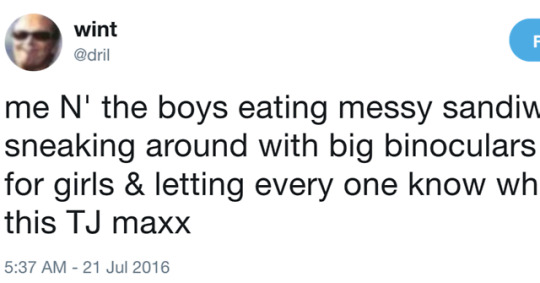
New Post has been published on https://shovelnews.com/the-love-song-of-dril-and-the-boys/
The Love Song Of Dril And The Boys


I have not read dril’s book. I cannot read dril’s book.
Dril Official “Mr. Ten Years” Anniversary Collection compiles 1,500 of the pseudonymous Twitter user’s greatest tweets, and it is simply too funny for me to read for more than a page or two at a time without laughing so hard, I feel physically ill. Ask my family if you don’t believe me. Ask the patrons of the West Babylon Public Library, who have been shooting me dirty looks since I began writing this essay. Every time I crack the book open, I’m seconds away from hitting something like this …
“hello 911 I need a moat dug around my house immediately” “sir this line is for emergencies only” “Thuis is an emergency moat”
— wint (@dril) May 18, 2014
… or this …
koko the talking ape.. has been living high on the hog, wasting our tax dollars on high capacity diapers. No more. i will suplex that beast,
— wint (@dril) September 7, 2014
… or this …
where do girls live
— wint (@dril) October 20, 2010
… and that’s it. Show’s over. “Goodnight Irene,” as Gorilla Monsoon would say. (“I will suplex that beast.”)
Dril’s blend of fist-on-the-table bluster, abject confusion and burned-toast syntax — the style of humor he pioneered, which became the lingua franca of Funny/Weird Twitter in toto — has my number. Like Monty Python’s run-on sketches, non sequiturs and Terry Gilliam animation; like the endless awkward pauses, omnipresent electrical humming and recycled animation of “Space Ghost Coast to Coast”; like Tim and Eric’s garish colors, glitchy video and non-actor stars, dril’s tweets are a new way to be funny, with a rhythm and vocabulary all their own. I love it.
But dril? Dril loves the boys.
A recurring collective character in dril’s oeuvre, the boys occupy a unique place in his taxonomy, which, thanks to the book’s arrangement of tweets by topic, is easier than ever to get the hang of. For example, girls are mysterious sources of intermingled awe and terror, like the monoliths in “2001.”
ah, So u persecute Jared Fogle just because he has different beliefs? Do Tell. (girls get mad at me) Sorry. Im sorry. Im trying to remove it
— wint (@dril) November 1, 2015
Brands are icons of integrity, as admirable as they are untouchable.
just deleted 23,000 tweets at the request of Sbarro. feeling Purified
— wint (@dril) July 5, 2015
The trolls are contemptible pests, an implacable obstacle.
will no longer be livestreaming foreskin restoration process; the trolls who attempted to summon [インプ] (Imps) into the chatroom are to blame
— wint (@dril) February 3, 2012
And then there’s rival Twitter user @DigimonOtis, a class by himself: He is nemesis, the anti-dril.
(reading my latest death threat ) “from the desk of DigimonOtis…” this is bullshit. digimonotis has never owned a desk
— wint (@dril) November 6, 2014
But the boys are on dril’s level. The boys welcome dril with open arms. They share his hopes and fears, his loves and hates. He’s one of the boys.
Just met w/ Boys Lunch Club. Seems to me, That we are very pissed off that teen girls would rather kiss, “Soldier Boy,” than Actual Soldiers
— wint (@dril) May 16, 2016
pleased to report my custom beer tap that makes a dramatic diarrhea noise while filling the glass is a hit with the boys at the fondue club
— wint (@dril) October 16, 2014
best 90s memory is gathering around the old oak tree with the boys and passing around trading cards featuring all of our dads #DamnGood90s
— wint (@dril) April 30, 2013
Crucial to the boys’ appeal is their exclusivity. Like any clique, they’ve invested their aesthetic preferences with moral weight, and those who violate them do so at their peril.
darknet 2002: pics of dead guys in bath tubs, warez darknet 2017: discussions amongst the boys as to which of our acquaintances aren t funny
— wint (@dril) August 11, 2017
me & the booys are riffing on 78 hours of stolen walgreens security cam footage. this guy on here just bought a toilet brush. bitch!! bitch!
— wint (@dril) December 8, 2014
me and the boys have decided that the least gay way of wiping your ass is to dump a quarter bottle of Palmolive Spring Sensations back there
— wint (@dril) September 17, 2016
Dril may be a member in good standing, but membership brings responsibilities as well as privileges.
the boys held an intervention about me “Going hollywood” because i;ve been buying plastic toothpicks now
— wint (@dril) June 1, 2018
THE BOYS: were watching the mr bean episode where you can see his ass. get over here ME: cant. wifes making me watch mr beans holiday (2007)
— wint (@dril) June 14, 2017
If the boys function as dril’s superego, instilling and policing values, they are also his id — an embodiment of his most voracious physical drives.
pussy log 12.29.11: justin unscrewed the knob from the door to the ladies’ room and now the club boys all take turns cradling it
— wint (@dril) December 30, 2011
“Ah!! Lunchtime, Boys!” i snort several lines of Hamburger Helper, tilt my head back and shake with unbearable agony as my head turns purple
— wint (@dril) May 15, 2013
The comedy and tragedy of dril is that he is a man without ego, the mediating force that balances the needs of id and superego. He is perpetually out of balance, careening from excess to shame. He requires the intervention of the boys, the example they set, just to function.
This is why the saga of dril and the boys is a love story — conditional and occasionally unrequited though that love may be. It is poignant because it is impossible to imagine dril living without them any more than Juliet could live without Romeo.
When the lovers are in harmony — when the needs of id, ego and superego are aligned at last — the result is a thing of beauty.
going ape shit at the gym. rotating in full 360 degrees with the boys, flawlessly synchronized
— wint (@dril) November 28, 2017
The boys can be peers, contributing to the good posts for which dril is best known at a level beyond dril’s own imagining.
cant wiat to see what devilish thanksgiving scenarios me and the boys of twitter can conjure up. “The turkey was taken by spiders? ? Whua??”
— wint (@dril) November 24, 2014
Together they can be silent guardians, watchful protectors, dark knights, defending boys both within and outside the circle from the depredations of rival groups.
me & the boys will be holding hands., forming a Covenant Ring, to protest girls who only want to fuck the main pirate from the pirate movies
— wint (@dril) June 4, 2017
the epic shit of 2017; is the boys getting TheSegaPimp fired from his job at The Red Cross for not wishing me a “Happy Halloween”
— wint (@dril) January 2, 2018
the boys are enjoying their fave jukebox when ths sarge steps in SARGE: TURN OFF THE DAMN JUKE BOX! ITS WAR ME: Fuck u sarge. The armys crap
— wint (@dril) July 7, 2015
Not every tweet about the boys made it into the book. This is fitting, as when they’re operating at full force, nothing can contain them.
thje opening riff of “Life In The Fast Lane” repeats over and over forever while me and the boys shoot at a septic tank with airsoft rifles
— wint (@dril) August 1, 2014
me N’ the boys eating messy sandiwches, sneaking around with big binoculars looking for girls & letting every one know who runs this TJ maxx
— wint (@dril) July 21, 2016
So we come to the crux of the matter. Dril and the boys are the great love story of our time because their insecurities, their mania, are our time’s prime motivators.
Dril and the boys wallow in the same miasma from which all our era’s reactionary movements have emerged — the MAGAs and Pepes, MRAs and incels, GamerGaters and ComicsGaters, Sad Puppies and Proud Boys and all the other doofuses with unwittingly infantilizing sobriquets.
With “the boys,” the humorist behind dril has tapped into the overall vibe in this country that there exists, somewhere out there ― perhaps in a TJ Maxx ― a lost masculine ideal. No one agrees on what it is, least of all dril, whose psyche is as piecemeal as his punctuation. It could be yelling at NFL protesters to stand for the national anthem or screaming at Disney for committing white genocide in the “Star Wars” films. It could be having sex all the time or having no sex at all. It could be respecting the majesty of the law or flouting it or both, depending on whom the law is meant to penalize. It’s the nightmare superego-id hybrid, 10 pounds of Blue Lives Matter shit in a five-pound “Live free or die” bag.
When men fail to live up to the puritanical amorality of the boys, they’re less than men, which is to say — as women have a lifetime to learn — they’re less than human. Such men earn sexualized insults like “betas” and “cucks.” They’re reduced to contemptuous acronyms like “SJWs” and “NPCs.” They make the soy face. They listen to dad rock. This blend of macho aggression and childlike vulnerability cannot be resolved in the real world, where it results in a racist, revanchist, minority party controlling all branches of government and installing sexual predators in every available position of power yet still acting like the David to the Goliath of Me Too, female gamers and the theoretical casting of Idris Elba as James Bond.
me and the boys watching james bond morph into a black guy before our very eyes , and braying at the movie screen like distressed cattle
— wint (@dril) September 4, 2018
Dril and the boys reside in this all-American astral plane where the Large Son–Libtard civil war rages, where misandry is real and must be guarded against with magic spells. We recognize our own reality in their incoherent but nevertheless militant search for reasons to hoot and holler. As such, their romance presents us with an opportunity to convert the problematic into the pleasurable, just as surely as antihero dramas or even halfway decent kink.
In the world of dril and the boys, all the pride and greed and wrath and lust and envy and sloth and gluttony of the movements that have fouled the entire adult lives of multiple generations of Americans can be boiled down to a gaggle of morons screaming about toilets. It’s a beautiful fantasy, and like all fantasies, it’s as romantic as it is remote.
Sean T. Collins has written for The New York Times, Rolling Stone, Pitchfork, Esquire and Vulture. He and his partner, the cartoonist Julia Gfrörer, are the co-editors of the art and comics anthology Mirror Mirror II. They live with their children on Long Island in New York.
Source: https://www.huffingtonpost.com/entry/dril-and-the-boys-twitter_us_5bb66529e4b028e1fe3bfd71
0 notes
Text
Chrystia Freeland: The woman who poked the elephant but squeaked out a deal
Don Freeland, a retired lawyer and farmer with a 6,000-acre spread in Peace River, northwestern Alberta, was in the cab of his combine Tuesday afternoon, hurrying to bring in the barley harvest before the bad weather hit. It has been a cold, damp September out West, Freeland said, and farmers just have to deal with it. Besides, there are much more irksome issues than the weather, including the “dirty rotten dairy monopoly that every political party panders to and that should be disbanded altogether — in my opinion.”
Freeland has other opinions, including of his eldest daughter, Chrystia. Better known as Canada’s Foreign Affairs Minister and the trade representative U.S. President Donald Trump declared, and not via a tweet, that he did not “like” during the end days of the tense 14-month negotiation that produced the United States-Mexico-Canada Agreement (USMCA) — a deal that, among other things, gave American dairy farmers a cow’s udder more access to Canadian markets.
“I think it’s a good deal for Canada — and it had to happen,” Don said. “Canada didn’t have much choice, eh? And remember: Chrystia is not the boss.”
Freeland may not be the boss, but she is arguably the country’s most recognizable politician next to her boss, the Prime Minister. She’s by all accounts a phenomenon, a whirlwind who went from being a journalist/public intellectual, who asked a bunch of good questions and wrote some lofty books, to being the face of a trade deal that could define the country’s financial welfare for the next generation, for better or worse.
On the Monday morning before the new deal was struck, when the outcome was still very much uncertain, and fears of a calamitous end were gnawing away at Canadian negotiators, Freeland went for a run near her midtown Toronto home. It was around 9:45 a.m. She was dressed in a white t-shirt and grey shorts. Her hair was tied back from her face and she was moving at a reasonable clip, with no visible security detail.
None of the passersby in the area appeared to recognize her or, if they did, they didn’t care. Freeland looked, if there is such a look, pretty much like your typical middle-aged mom, with two daughters (Natalka, Halyna), a son (Ivan) and a husband (New York Times reporter, Graham Bowley) at home, a headache of a to-do list, and a desire to clear her mind before getting back down to it.
Freeland stopped next to me at a red light on Yonge Street. I was on my bike and asked, “Aren’t you supposed to be in Washington?” She answered, “I’m heading back this afternoon.” It was a brief encounter that was both endearing and bewildering. Endearing because whatever massive stress Freeland was under, the 50-year-old appeared unflappably calm; and bewildering because despite the massive stress she was under, it was 9:45 a.m. and she wasn’t in an office, somewhere, preparing for the next round in the NAFTA fight.
youtube
Part of Freeland’s shtick since emerging as a star Liberal candidate in a 2013 by-election in Toronto Centre has been presenting herself as not so different from the Average Middle Class Canuck. Aside, of course, from having degrees from Harvard University and the University of Oxford, being fluent in four languages, conversant in a fifth and owning, as many Torontonians in an inflated real estate market do, a million-dollar-plus home. Sure, Freeland, who declined an interview request, is normal. But her normal isn’t the same as you and me.
David MacNaughton, Canada’s ambassador to the U.S., has talked with Freeland almost every day for the past 14 months, and likens her to the “Energizer Bunny,” with an otherworldly capacity to “multitask,” to juggle her job with her private life, and not through half measures.
The ambassador characterizes the trade negotiations with the U.S. as “tense,” “fractious” and “hanging by a thread.” He describes Freeland as “smart,” “focused” and “determined,” before recalling a conversation he had about her with Canada’s chief NAFTA negotiator, Steve Verheul.
Verheul, a civil servant, and so-called professional negotiator, dealt with the nitty-gritty of the bargaining, and was the point person in a “maple charm offensive,” which saw virtually every member of the federal cabinet make a total of more than 200 visits to the U.S., to plead Canada’s case to members of Congress, state governors and Main Street Americans. But Freeland was different than the rest.
Most ministers want the “two page” condensed explanation on a complicated file, Verheul told MacNaughton, but she wanted to dive into every fine detail on NAFTA.
“When you talk to her about rules of origin, or the dairy, or intellectual property or whatever — some of these subjects that are extraordinarily complex — she understood them, and could discuss them,” MacNaughton said this week from Washington, D.C. “Typically, politicians don’t — they are interested in the big picture.”
On some level, Freeland is also not afraid of embarrassing herself, despite the big picture. For instance, at the prompting of her children, she was dorky or brave enough — maybe both — to wear a t-shirt with the slogan, “Keep Calm and Negotiate NAFTA,” in public while negotiating said deal.
Nor is she afraid, apparently, of trying to embarrass an American president or disappointing ordinary, hardworking Canadians, as she did in her pre-political life at Thomson Reuters Corp.
Blazing ahead, consequences be damned, can be a handy bit of armour — or an unnerving Achilles heel — for any Canadian politician to possess.
Chrystia Freeland with Prime Minister Justin Trudeau and Canadian trade negotiator Steve Verheul.
Indeed, Freeland’s jabs at the mercurial Tweeter-in-Chief were many. In mid-June, after being named Diplomat of the Year by Foreign Policy magazine, she gave a speech in Washington. Without naming Trump, she warned of an economic climate where the rich keep getting richer, the middle class feels hollowed out and people become “vulnerable to the demagogue who scapegoats the outsider, the other — whether an immigrant at home or a foreign actor.”
She went on, finger wagging at the Americans — whose soldiers, she lectured, had fought and died alongside our own — for imposing tariffs on Canadian steel and aluminum in the name of national security. A move she described as “absurd” and a “naked example of the United States putting its thumb on the scale in violation of the very rules it helped to write.”
Freeland one-upped herself at the Women in the World Summit in Toronto two months later, appearing on a panel called Taking on the Tyrant. The event featured a video comparing Trump to Russian strongman, Vladimir Putin, and Syria’s murderous Bashar al-Assad.
Critics, on both side of the border, panned the appearance, questioning how a key member of Team Canada could take the metaphorical equivalent of a bonehead penalty with the game — that is, NAFTA 2.0 — on the line.
If Trump had been simmering inside, he boiled over at the United Nations on Sept. 26, telling reporters: “We are very unhappy with the negotiations and the negotiating style of Canada.” Adding: “We don’t like their representative very much.” According to the Washington Post, Trump said Freeland “hates America” at a dinner for campaign donors the following day.
“I never saw Chrystia react to any of that kind of criticism,” MacNaughton said. “She’s got a pretty thick skin.”
She is also a bulldog. Bill Browder knows Freeland from her days as Moscow bureau chief of the Financial Times. Browder is founder and chief executive of Hermitage Capital Management Ltd., an investment firm that became wildly successful in post-communist Russia, but ran into trouble in 1998 when, as he describes it, “an oligarch started ripping me off.”
Browder, an American, wanted to go public with a story many journalists were afraid to touch. He invited Freeland to dinner at Semiramis, a Mediterranean joint in Moscow. Over hummus and lamb kebobs, he sketched out a tale of financial malfeasance.
At the United Nations in September, Donald Trump told reporters that the U.S. side didn’t care much Canada’s chief negotiator, Chrystia Freeland.
“Instead of backing away from the story — because it was such a dangerous story to report on — Chrystia blew it wide open,” Browder said from his London office. “It took a tremendous amount of guts, because gangsters and oligarchs were involved in a lot of murders back then — of journalists and others.
“Chrystia is like raw steel. It is kind of misleading, you know, you see this relatively short woman with a high-pitched voice, and you might think you can run roughshod over her. Well, guess what? You will have met your match and 10 times over.”
And yet, even fearless rock star journalists can present as profoundly tone deaf and calloused when dealing not in the realm of Russian oligarchs, but of ordinary people.
In 2011, and then based in New York, Freeland became head of Thomson Reuters’s digital news arm, with ambitious plans for launching a new platform, dubbed Reuters Next. The multi-billion dollar information company, majority owned by Canadian billionaire, David Thomson, had opened a digital newsroom in Toronto in 2005.
Freeland embarked on a hiring spree, signing big name talents for big dollar contracts, while flitting about the globe — and the American talk show circuit — promoting the Reuters (and her own) brand. Meanwhile, in Toronto, a team of journalists kept waiting to meet their new boss.
“The Toronto staff tried numerous times to engage her as it became more apparent she had no plans to include us,” said one former Toronto editor, who wished to remain anonymous to protect future job prospects in an industry where Freeland remains well-connected. “We were desperate for face time, for some acknowledgment that our jobs mattered and that the hard work we did was appreciated.”
Just a week before Christmas, reportedly at the behest of upper management, Freeland shuttered the Toronto operation, tossing about 25 people out of work and shifting the jobs to Bangalore, India. Freeland’s Canadian employees felt abandoned. But it gets worse: after she leapt into politics in 2013, Thomson Reuters abandoned Reuters Next — without ever launching it — having reportedly spent five million dollars on the failed project. (News accounted for about three per cent of the company’s total revenue of US$11.3 billion last year.)
“It was infuriating to see her launch her political bid,” the former Toronto editor says. “Not once did she visit staff at the Toronto office, yet here she was now claiming that this was her home. Her lines on championing the middle class were beyond hypocritical. These were good paying, union jobs that were outsourced.”
Other scars carve deep across Freeland’s personal life. Her Ukrainian-Canadian mother, Halyna (Chomiak) Freeland, was born in a displaced persons camp in Germany in 1946. Halyna grew up to be a lawyer, activist and feminist, and would often bring her infant daughter, Chrystia, with her to class at the University of Alberta law school in the late 1960s.
Chrystia Freeland celebrates her victory in the federal by-election in the riding of Toronto Centre in 2013.
Halyna and Don Freeland divorced when Chrystia was little. When Chrystia started having children of her own, her mother moved to New York to help. Freeland was running the U.S. arm of the Financial Times when her mother was diagnosed with cancer. But with support, she was able to keep Halyna at home, caring for her at her Manhattan apartment, which is where she passed away on July 6, 2007.
“Halyna was a doer in her life,” said Chrystia Chomiak, Freeland’s aunt in Edmonton. “She did many, many things, and that has had a huge impact on Chrystia.”
Freeland’s family ties remain strong. She phones her father once a week, typically Sunday. Don Freeland said Chrystia is the only one of his four daughters who, as a girl, loved the Peace River farm as much as he does. She used to cut the canola into rows before heading off to school each September. She was never afraid of getting dirty.
On Sunday Sept. 30, with the fraught trade negotiations at an end, Freeland called her dad. Don griped about the “dairy cartel,” before shifting topics to the grandkids in Toronto. Two summers ago, Chrystia phoned him up, with some specific requests: she needed him to buy some gear at an outfitters and lend her a car, so that she and Bowley could take the family camping in the Rockies.
“Chrystia doesn’t own a car, eh,” Don Freeland said, bemused. “I bought a new one, and told her if one of her aunts wanted to drive my old car to Toronto, that she could have it. But she doesn’t want a car. She rides her bike everywhere.”
And she runs.
Financial Post
• Email: [email protected] | Twitter: oconnorwrites
from Financial Post https://ift.tt/2IH9gVO via IFTTT Blogger Mortgage Tumblr Mortgage Evernote Mortgage Wordpress Mortgage href="https://www.diigo.com/user/gelsi11">Diigo Mortgage
0 notes
Text
Why The Safari Jacket Is 2018’s Most Stylish And Practical Menswear Item
http://fashion-trendin.com/why-the-safari-jacket-is-2018s-most-stylish-and-practical-menswear-item/
Why The Safari Jacket Is 2018’s Most Stylish And Practical Menswear Item
It’s the badass outerwear of choice for style icons like Ernest Hemingway and Clint Eastwood, one that historically was less about dressing for dinner, rather about catching it. And yet, the safari jacket still divides.
That’s because get it right, and you look straight-from-the-fridge cool. But get it wrong, and you look the part of the Great White Hunter. Get it right, and you look Burt Reynolds-level macho. Get it wrong, and you just look plain awkward. But, ask any menswear expert, and they’ll soon tell you it’s worth the risk.
Never mind the practical benefits – room to carry your stuff; light enough to wear all summer. The safari jacket is a design classic, whether you’re in the real thing or one of fashion’s many interpretations, and it may just be the only cool jacket you need for the balmier months.
What Is A Safari Jacket?
Anthony Sinclair
Take the practicality of the military style field jacket – a tough cotton or cotton-blend fabric formed into a loose-fitting, mid-length garment with four bellows pockets at the chest and hip. Now do it in a more general purpose shade of beige, in a lighter-weight, breathable fabric like linen or cotton drill and add details such as an open neck, epaulettes and a belt to keep everything pulled together and in order.
There you have it: the safari jacket – a kind of field-meets-shooting jacket, substantial enough to wear a layer underneath, insubstantial enough to wear next to the skin or for the sleeves to be easily rolled ready to go hunting in, even if that’s just for the next bar.
Why You Need A Safari Jacket Today
Mango
Saint Laurent, which is credited with thrusting the style into the mainstream, famously still offers one, of course. But there’s a good reason why designers including Tom Ford, Ralph Lauren, and brands like Abercrombie and Barbour have versions too. It just works. When it’s too hot for a proper jacket, but the event calls for something smarter than just a shirt, the safari jacket – functional in the outback, smart in a more urban jungle setting – works.
“The safari jacket is bittersweet – it can look like you’re wearing a costume, but the fact is that it’s great for the summer,” says Gieves & Hawkes creative director John Harrison. “They make quite a statement, but they really do the job.”
What’s more, it’s not a capital ‘F’ fashion piece either. That doesn’t mean a good quality example won’t be wearable for years to come. Just think khaki, cotton, classic. Its versatility is well documented, and it’s the ideal accompaniment to selvedge denim or, when the occasion calls, sharp tailoring. In short, it’s the ultimate trophy piece.
Safari Jacket Style Tips
Don’t Overdo It
The safari jacket is designed to be the star of the show, so allow it to take over, and avoid wearing anything else that attempts to compete with it for attention. If in doubt, muted basics are the order of the day, so throw it over a simple T-shirt and foot with dark denim and minimalist sneakers.
Mango
Aim High or Low
Much like other pieces in the menswear hall of fame, it’s possible to dress the safari jacket both up and down. Whether you wear it over a shirt, knitted tie and dark flannel trousers to appear smart or with white jeans and deck shoes for a Riviera feel, try leaving the jacket open but tying the belt across the middle for a nonchalant look.
Lardini
Re-appropriate It
Unless en route to a fancy dress a party, don’t attempt the all-out utility look. If you’re wearing a safari jacket, avoid also wearing khakis, combat pants, or bush hat. It’s important to re-appropriate the safari jacket from its original setting as an upscale piece to avoid looking like someone who’s lost his shotgun.
Ralph Lauren
Play Around With Fabric
The safari jacket is made by its pattern, but different materials can provide different effects. Linen ages well, making for a jacket that will take on a timeworn look; suede has more of an eveningwear feel, so works well for guys with a smarter wardrobe; while options in leather offer added insulation during colder months.
Massimo Dutti
Leave The Bag At Home
In its infancy, the pocket on a safari jacket would be used to carry ammo, batteries for the GPS, a flask and likely a pipe. Though most modern men have little need for these in everyday life, it’s still possible to use the jacket as intended and leave the backpack at home.
Ovadia & Sons
5 Key Safari Jackets
Private White V.C.
Known for its robust outerwear, British brand Private White V.C. specialises in stylish yet functional designs. This prime example is a minimalistic take on the safari jacket. Gone are the shoulder epaulettes and belt; replaced by pared-down pockets with discrete poppers, a shorter length and a hidden placket, giving it a smarter overall feel.
Buy Now: £279.00
Anderson & Sheppard
Given that it occupies a space on Savile Row, Anderson & Sheppard is best known for its exemplary tailoring. However, the heritage firm also produces a fine take on the safari jacket. Made from military-esque cotton drill and coming with 15 pockets as standard – including two iPad-sized interior pockets – it’s perhaps the handiest garment you could own. Forget luggage, just get yourself one of these.
Buy Now: £1,750.00
Saint Laurent
Sure, because of its butter-soft lambskin construction and silk lining, the all-leather ‘Saharienne’ jacket by Saint Laurent would be useless in an actual safari – but just look at it. An ultra luxurious take on the design Yves himself backed in the 1960s, this is the French label at its best: classic, louche and incredibly desirable.
Buy Now: £2,910.00
Marks & Spencer
Trust Marks & Spencer to come up with a safari jacket that both ticks all the design boxes and doesn’t offend your wallet. The British high street retailer has put its own spin on the classic piece, choosing to forgo the belt and instead add a couple of buttoned rear vents. So, whether you mount a horse in the desert or a motorcycle in the city, your jacket won’t scrunch up when you sit down.
Buy Now: £69.00
Barbour
Sitting somewhere in between Barbour’s signature waxed outerwear and the British brand’s motorcycle styles, this four pocket cotton design is an ideal modern update on the safari jacket. The drawstring waist provides a customisable fit, while a zip-and-button closure, coupled with a buttoned throat latch ensure that when the weather turns sour, it’ll be a useful ally.
Buy Now: £199.95
The History Of The Safari Jacket
Picture the late 19th-century British soldiers of the Boer War, tramping across the plains of South Africa, unable to find their enemy – engaged as they were in this new, ungentlemanly form of warfare known as ‘guerilla’. Of course, it didn’t help that the British soldiers wore tunics in red, and the Afrikaners – appreciating the advantage of blending into the landscape – wore khaki.
Officers in British high command thought they were on to something – and shortly after came the first British military dress to make a step towards the palette of beiges, dun browns and olive drabs still used today. The resulting attire – a four-pocket field jacket in khaki – would by turns be adopted by hunters, who likewise needed to be less visible to their prey.
Military officers during the Second Boer War wearing safari jackets
Indeed, the so-called safari jacket was born, and it would remain a specialist item – worn by hunters and trackers including diehard-killers-of-anything-that-moved Ernest Hemingway and Teddy Roosevelt. Although versions of the safari jacket were re-adopted for both the British and German forces fighting in Africa during World War Two, it was typically only worn on safari and would have looked mightily out of place anywhere else up until the mid-1950s.
This was an idea underscored by Hollywood. From the 1930s, the film machine decided the perceived exoticism of the Great Continent was ripe for the next spate of romantic, action-packed movies, with the likes of Clark Gable donning safari jackets on screen. Out came The Road to Zanzibar (1941), Mogambo (1953), Safari (1956), Hatari! (1962), onwards to the likes of Clint Eastwood in White Hunter Black Heart (1990) – by which time the safari jacket had arguably lapsed into ‘central casting’ territory.
The safari jacket has appeared in many films including on Clark Gable in Mogambo (1953)
But not before making its forays into fashion. In the movies – especially during that busy run of the 1960s – the safari jacket was typically worn with plenty of dust and sweat, perhaps a rakish neckerchief, baggy shorts and maybe a pith helmet. Take away the perspiration, however, and the safari jacket was recognised for its practicality for city life.
In India – inspired by the climate again – it became the local answer to the business suit. This was in part why Roger Moore wore a safari jacket in Octopussy (1983), partly set as it is in India. But then Moore, as James Bond, also wore one for the private islands scenes of The Man with the Golden Gun (1974) and Moonraker (1979).
But then Moore, or his wardrobe team, was ahead of the times: he wore a safari jacket in ‘The Saint’. This wasn’t just before Bond, it was before the other Saint too. It was the designers Ted Lapidus and Yves Saint Laurent who really gave the safari jacket a fashion overhaul.
Yves Saint Laurent is credited with making the safari jacket a fashion item
The former introduced his take on the jacket in the mid-1960s, while the latter seemingly stole all the glory – or just got the timing right – after first showing his take on it in 1967, though it was a one-off made for a Vogue story on him the following year that made it a cult item for the times. And it’s never looked back since.
0 notes
Text
20 Oscar-Nominated Movies You Can Stream Right Now
From baby motorists to libidinous mermen, 2017 was a very good–and somewhat strange–year at the movies. And yet not even the pulse-pounding excitement of watching Daniel Day-Lewis consume yet another mushroom omelette could match the collective jaw-dropping that came in the final moments of last year’s Oscars ceremony, when the makers of La La Land handed their Best Video statuette over to the makers of Moonlight–the award’s actual winner–in what will likely go down as the weirdest instants and worst mix-ups in Academy Awards history. Could it happen again during this Sunday’s ceremony? Doubtful, but never say never.
Even still( or in cases where) you shouldn’t miss out on any of this year’s nominated films. For those of you planning to invest this week( and weekend) engaged in a non-stop Oscar marathon, here are 20 of this year’s nominated movies you can stream right now.
The Shape of Water
If you thought the merman sex was the most compelling thing about Guillermo del Toro’s fantastical fairy tale, you weren’t attaches great importance. The Shape of Water is much more brilliant than all the talk about its aquatic lovemaking let on. With its mingle of real-life and fantasy, it’s likewise pure del Toro. Sally Hawkins suns as Elisa Esposito, a mute cleaning woman at a top-secret government research center who one day stumbles upon an amphibious creature, falls in love, and smuggles him into her bathtub where their affair goes to the next degree.( It’s much more heartfelt and passionate than it sounds .) The film, which is nominated for 13 Oscars, might be most notable for its cast–most of whom, including Hawkins, Richard Jenkins( as Elisa’s BFF and neighbor ), and Octavia Spencer( as her coworker ), earned nominations for the performance of their duties.( Though Michael Shannon, amazingly, did not .) Folks “was talkin about a” Shape because of its more prurient aspects, but strip those away and it’s a narrative about adoration and otherness with a wonderfully humanist, if not entirely human, soul.
Where to stream it: Amazon Video, iTunes
Three Billboards Outside Ebbing, Missouri
Though writer-director Martin McDonagh’s Three Billboards Outside Ebbing, Missouri was met with a joyful standing ovation following its premiere at the Venice Film Festival in September, it had now been gained as much backlash as it has accolades( largely because Sam Rockwell’s racist cop character is redeemed in the end ). Still, there’s no denying that it’s a film full of powerful performances–Rockwell, Frances McDormand, and Woody Harrelson are all vying for gold–and a story worth instruct: a young lady is raped and murdered in small-town Missouri. When it seems as if the local police have given up on ever observing the perpetrator, the young girl’s mom takes justice into her own hands, largely by shaming the local authorities. Though it would be easy to paint this kind of tale in broad-spectrum brush strokes–an angry woman gets even–playwright-turned-filmmaker Martin McDonagh doesn’t go for easy.
Where to stream it: Amazon Video, iTunes
Lady Bird
Like most teens, Christine “Lady Bird” MacPherson( Saoirse Ronan) doesn’t ever feel like she quite fits in with her fellow classmates. Hankering for something more than what she has, the movie follows Lady Bird through her senior time of high school, where even the smallest aggravations( like, say, one’s mother) feeling immense. While with hour and distance, it’s easy to see that the interesting thing don’t matter so much, it doesn’t feel that style when they’re pas, which is part of what stimulates Lady Bird so unique. Writer-director Greta Gerwig, who is now one of a small handful of women to be nominated for Best Director, manages to capture the reality of the transition into adulthood with all the pain and humor that comes with it.
Where to stream it: Amazon Video, iTunes
Call Me by Your Name
Though set in 1983, there’s something totally modern about Call Me By Your Name, director Luca Guadagnino’s dreamy modification of Andre Aciman’s acclaimed coming-of-age novel. A precocious teen( Timothee Chalamet) observes himself both embracing and fight with the universal awkwardness that comes with giving oneself over to a first love, which is stimulated even more difficult by the fact that it’s with a 24 -year-old grad student( Armie Hammer) who is living with his family and interning for his father. The film’s dreamy sensuality will stick with you long after the end credits roll, and you’ll never look at a pitted peach the same route again.
Where to stream it: Amazon Video, iTunes
Darkest Hour
Though director Joe Wright may be best knows we attaining lush interval dramas starring Keira Knightley, his unwavering attention to detail and the past induce him a perfect fit to recount Winston Churchill’s earliest days as Prime Minister, and the history-altering decisions he was faced with inducing when it came to dealing with Adolf Hitler. As far as biopics or historical movies go, Darkest Hour is rather straightforward–which isn’t a knock on the movie. Yet where it truly stands out is in the acting. Though Gary Oldman is far from the only actor to ever play Winston Churchill( he’s not even the only person to play Churchill in the past time ), the quirky gravitas that has celebrated the actor’s job seems perfectly suited to the part.
Where to stream it: Amazon Video, iTunes
Get Out
Having reached the “meet the parents” stage in its relations, Chris Washington( Daniel Kaluuya) and his girlfriend Rose Armitage( Allison Williams) head off to an upper-class suburbium to expend the weekend with her folks( Bradley Whitford and Catherine Keener ). But from the get-go, Chris senses that something’s not OK with the situation. He’s right. With Get Out, Jordan Peele managed to simultaneously redefine the modern horror movie, while making a statement on race in America–and the timing could not have been better.
Where to stream it: Amazon, HBO Go, iTunes
Dunkirk
Watching Dunkirk on your iPhone isn’t truly the behavior that Christopher Nolan envisaged audiences experiencing his IMAX-ready World War II thriller, which details the hectic evacuation of Allied troops from Dunkirk, France as Nazi armies began closing in all around them. So if you can at least watch this one on your TV, that’s preferrable. Like with his previous cinemas, Nolan once again demonstrates himself adept at blending action and nuance. But in the case of Dunkirk, it’s composer Hans Zimmer who is tasked with ratcheting up the nervousnes as the destiny of the film’s seemingly fated soldiers hangs in the balance.
Where to stream it: Amazon Video, iTunes
Blade Runner 2049
While it may not have built the financial impact that Warner Bros. was hoping for, much like Mad Max: Fury Road before it, Blade Runner 2049 is only one of the few sequel/ reboot hybrids that isn’t simply cashing in on a cult following for instant brand-name acceptance. Whether you connect with Denis Villeneuve stark, dystopian vision of the future or not, there’s no denying he’s a natural born filmmaker( assure: Hostages, Enemy, Sicario, Arrival ). While it’s technically a sequel, it seems more like a spiritual comrade part. Ryan Gosling is perfectly cast as Agent K, a young blade runner urgently trying to track down Rick Deckard, Harrison Ford’s blade runner from the Ridley Scott original, who has been missing for 30 years. When they do satisfy, watching the two performers try to out-dry each other more than makes up for the two-hour-and-4 5-minute operating time–as does the brilliant camerawork of frequent Coen friends collaborator Roger Deakins who, with 14 Oscar nominations and zero wins, has become the Susan Lucci of cinematography.
Where to stream it: Amazon Video, iTunes
The Florida Project
While growing up mere minutes from Walt Disney World may sound like the dream of every child, for Moonee( Brooklynn Prince )– a profanity-spewing six-year-old who lives in a motel with her mommy( Bria Vinaite )– and her motley group of friends, the Sunshine State is still far from The Happiest Place on Earth. The Florida Project details a summer in the living standards of these children, who are often forced to grow up before their day. In a different time, Sean Baker’s The Florida Project might have been the Oscars’ favorite little indie movie that could, with its brutally honest depiction of life in Donald Trump’s America. For now, we’ll have to be satisfied with Willem Dafoe’s well-earned Best Supporting Actor nomination for playing Bobby, the motel manager who understands Moonee’s plight and does his best to look the other way.
Where to stream it: Amazon Video, iTunes
Abacus: Small-scale Enough to Jail
Hoop Dreams director Steve James has dedicated much of his job to shining a light on the underdogs, and his newest documentary is no exception. While, in the wake of the 2008 fiscal meltdown, many of Wall Street’s biggest players were deemed “too big to fail” despite their many intentional misdeeds, person needed to be made an example of. And that someone was Abacus Federal Savings, a family-owned and operated community bank that was indicted for mortgage hoax by the Manhattan District Attorney’s office. This engrossing documentary shows the truth of the matter( the bank’s 0.5 percent mortgage default rate was a tenth of the national median) and the personal toll that it takes for David to go up against Goliath.
Where to stream it: Amazon Prime, iTunes
The Big Sick
There’s something to be said about writing what you know, as husband-and-wife writing team Kumail Nanjiani and Emily V. Gordon proved that with The Big Sick, a semi-autobiographical accounting of the evolution of their relationship. What started as a possible one-night-stand developing into a relationship, then a breakup, then a near-death experience that brought them back together, in part thanks to Emily’s( Zoe Kazan) parents, Beth and Terry( Holly Hunter and Ray Romano ). Just when you thought every romantic-comedy trope had been discovered and done to death( no pun aimed ), The Big Sick manages to avoid them all, yet still have some “aww…” moments.
Where to stream it: Amazon Prime, iTunes
Baby Driver
Somewhere between Drive and La La Land is Baby Driver, Edgar Wright’s car chase-filled heist flick that introduced The Fault in Our Stars star Ansel Elgort to the non-Y-Aloving world. Elgort holds his own and then some against much more seasoned performers, including Jon Hamm( getting as far away from Don Draper as he can) and Jamie Foxx( who channels a bit of his character from Horrible Boss, and then some ). Kevin Spacey also stars, which could explain why the movie didn’t get as much Oscar attention as some predicted.
Where to stream it: Amazon Video, iTunes
Beauty and the Beast
When word came down that Disney was killing a live-action version of its beloved Beauty and the Beast, there were essentially two reactions: Yay! and Why? While, in the end, it may have all seemed a bit unnecessary to those who remain devoted to the animated version, there’s no denying the appeal of Emma Watson as Belle, a kind of anti-princess Disney princess. Even if you had no affinity for the original, or desire to watch its live-action offspring, witnessing what the actors–in particular, Dan Stevens as The Beast–had to endure in order to bring it to the screen at the least deserves a few minutes of your attention.
Where to stream it: Amazon Video, iTunes, Netflix
Icarus
If there was an Oscar for Best Accidental Documentary, Bryan Fogel would be the only challenger. In his effort to make a little cinema about the growing issue of performance-enhancing medications in the sports world, Fogel ended up get in touch with Dr. Grigory Rodchenkov, the former director of Russia’s national anti-doping laboratory–and together, they slowly realized that their “research” has left them with clear proof that Russia had spent decades conspiring to game the Olympics. While its focus is on doping, the overarching themes speak loudly and clearly to the current state of disenchantment and propagandizing people are reading more and more about every day.
Where to stream it: Netflix
Last Men in Aleppo
At the 2017 Academy Awards, The White Helmets–a 41 -minute documentary about the brave men and women who volunteer as first responders in search and rescue efforts in portions of rebel-controlled Syria and Turkey–won Orlando von Einsiedel and Joanna Natasegara an Oscar for Best Short Documentary. This year, Feras Fayyad and Steen Johannessen’s feature documentary, Last Human in Aleppo, will once again shine a spotlight on the heroic organization, with boots-on-the-ground footage that was shot over two years, and immerses the spectator in what daily life is like for those living in the midst of the Syrian Civil War.
Where to stream it: Netflix, Amazon Video, iTunes
Logan
James Mangold has entered the realm of superhero filmmakers, by sheer morality of represent one of the few who has managed to not only craft a deep nuanced character drama that violates the shackles often associated with the genre–but by being recognized by the Academy( alongside co-writers Scott Frank and Michael Green) for doing just that. It’s a well-deserved tribute for Hugh Jackman’s last outing as a retractable-clawed mutant.
Where to stream it: Amazon Video, HBO Go, iTunes
Loving Vincent
CGI is all well and good, but there’s something to be said for pushing the boundaries of centuries-old techniques, which is exactly what Dorota Kobiela and Hugh Welchman have done with Loving Vincent. The movie pays the ultimate tribute to its protagonist, Vincent van Gogh, by recruiting a squad of 125 artist to tell the story of the lord painter’s life … with oil painting. 65,000 frames worth of them.
Where to stream it: Amazon Video, iTunes
Mudbound
Netflix continues to show it can play with the the major studios with Dee Rees’ epic, post-WWII drama where class and race collide in rural areas in Mississippi. Accommodated by Rees and Virgil Williams from Hillary Jordan’s book of the same name, the movie depicts the unlikely friendship that develops between two soldiers–one white( Garrett Hedlund ), one black( Jason Mitchell )– as they resume their lives in the Jim Crow South, and are forced to deal with the PTSD that haunts them, and the racism that surrounds them. The film’s Oscar-nominated cinematographer, Rachel Morrison, had now been lent her eye to the year’s biggest movie in so far: Black Panther.
Where to stream it: Netflix
On Body and Soul
Director Ildiko Enyedi won the Golden Bear at the Berlin International Film Festival for this intense, albeit sometimes bizarre, Hungarian movie in which two shy coworkers at a slaughterhouse in Budapest forge a relationship in their daydreams( they keep having the same ones) and attempt to translate that to the waking world. Rating another win for Netflix.
Where to stream it: Netflix
The Disaster Artist
After spending more than a decade as a Hollywood punchline, Tommy Wiseau–the eccentric novelist/ administrator behind the so-bad-it’s-kind-of-amazing cult film The Room–finally got his critical due when James Franco decided to turn the construction of that movie into a movie all of its own, which is equal components funny, bizarre, and curiously moving. Eat your nerve out, Ed Wood.
Where to stream it: Amazon Video, iTunes
Oscars Overdrive
How Mudbound’s Rachel Morrison, the first woman to be nominated for the Academy Award for cinematography, took the world by cyclone with the stunning Black Panther
Dive deep behind the scenes of Blade Runner 2049, as told in our October 2016 cover story
Can a fish-man be emotionally appealing? The Shape of Water dares to find out
Catch up on reviews of Get Out, Logan, and Mudbound
from https://bestmovies.fun/2018/03/01/20-oscar-nominated-movies-you-can-stream-right-now/
0 notes